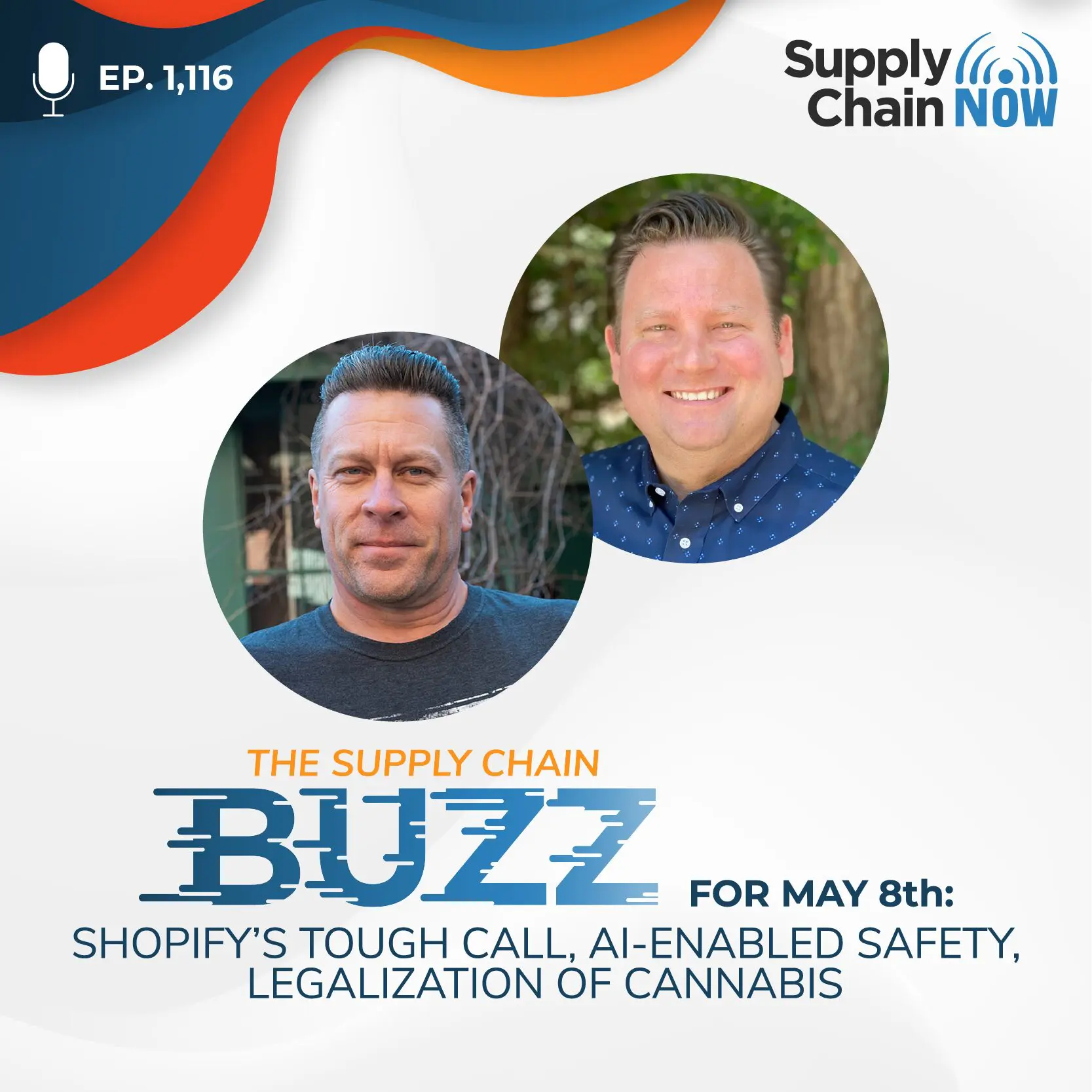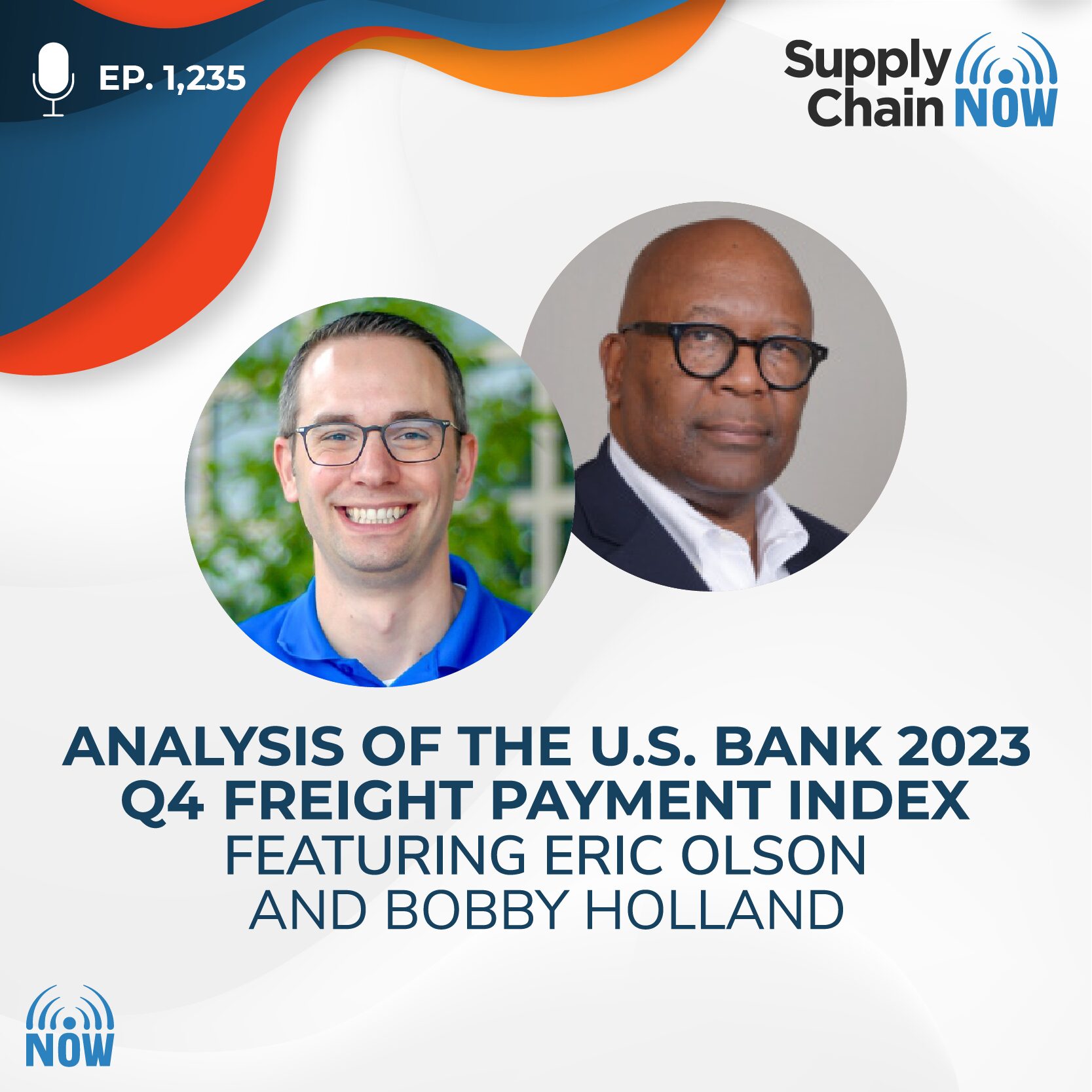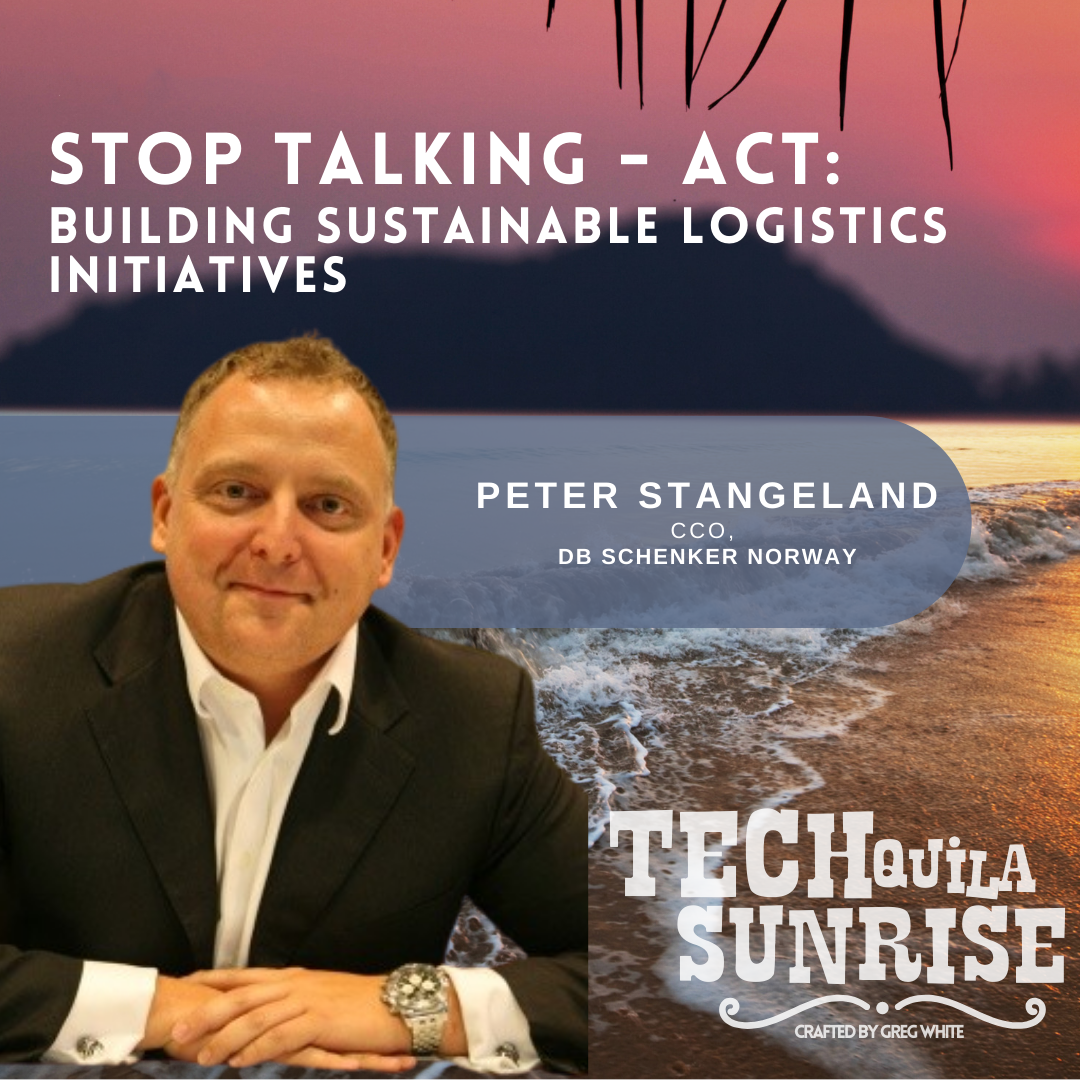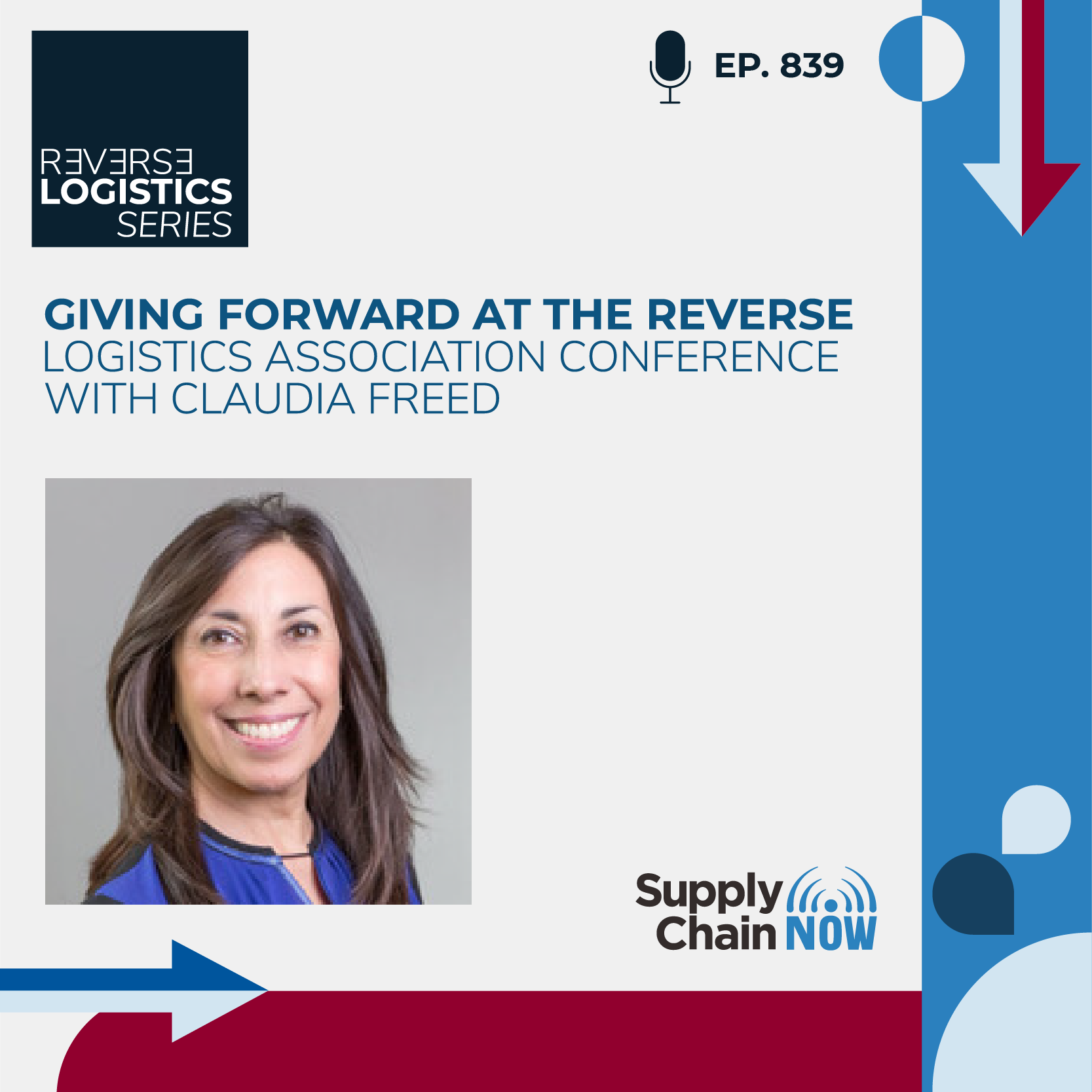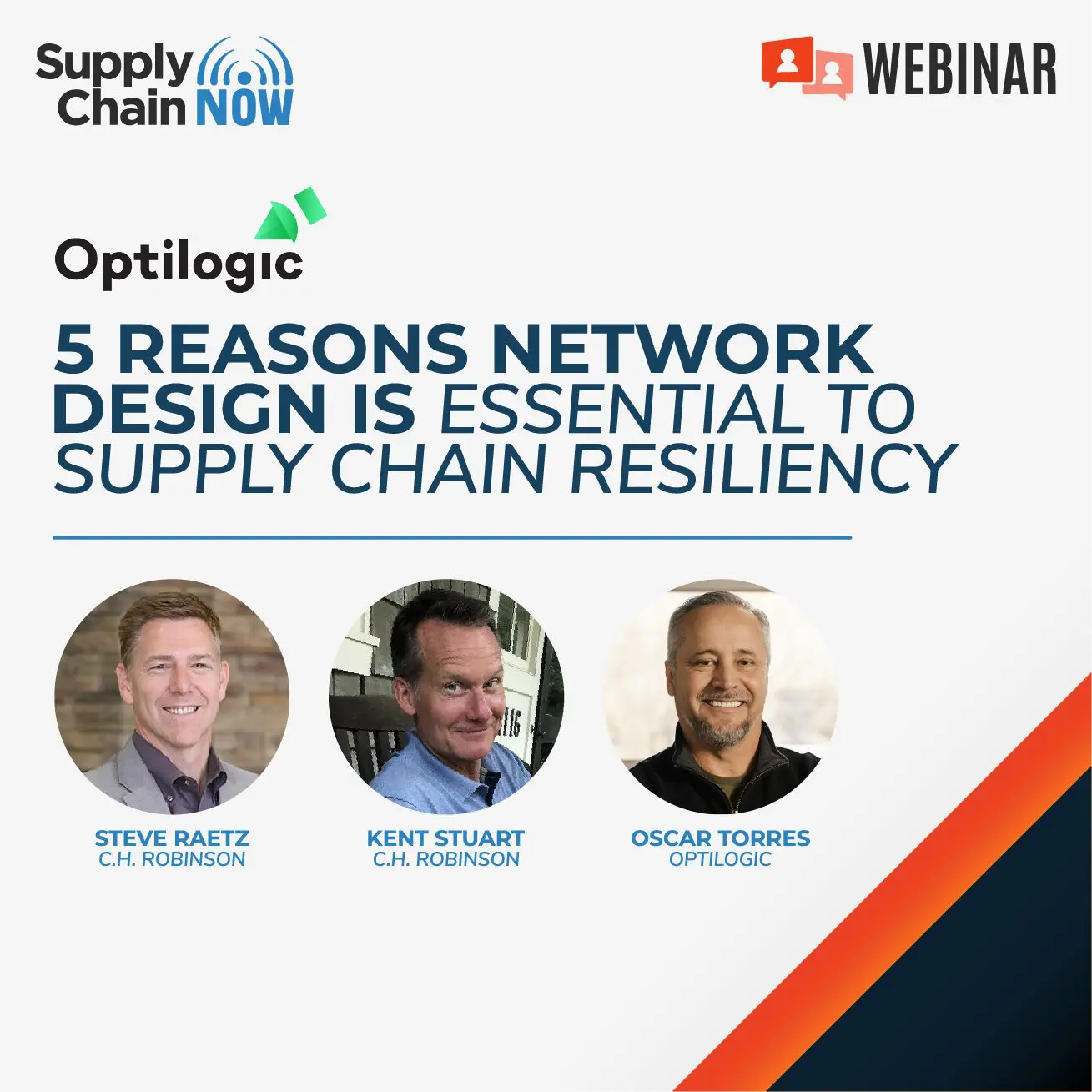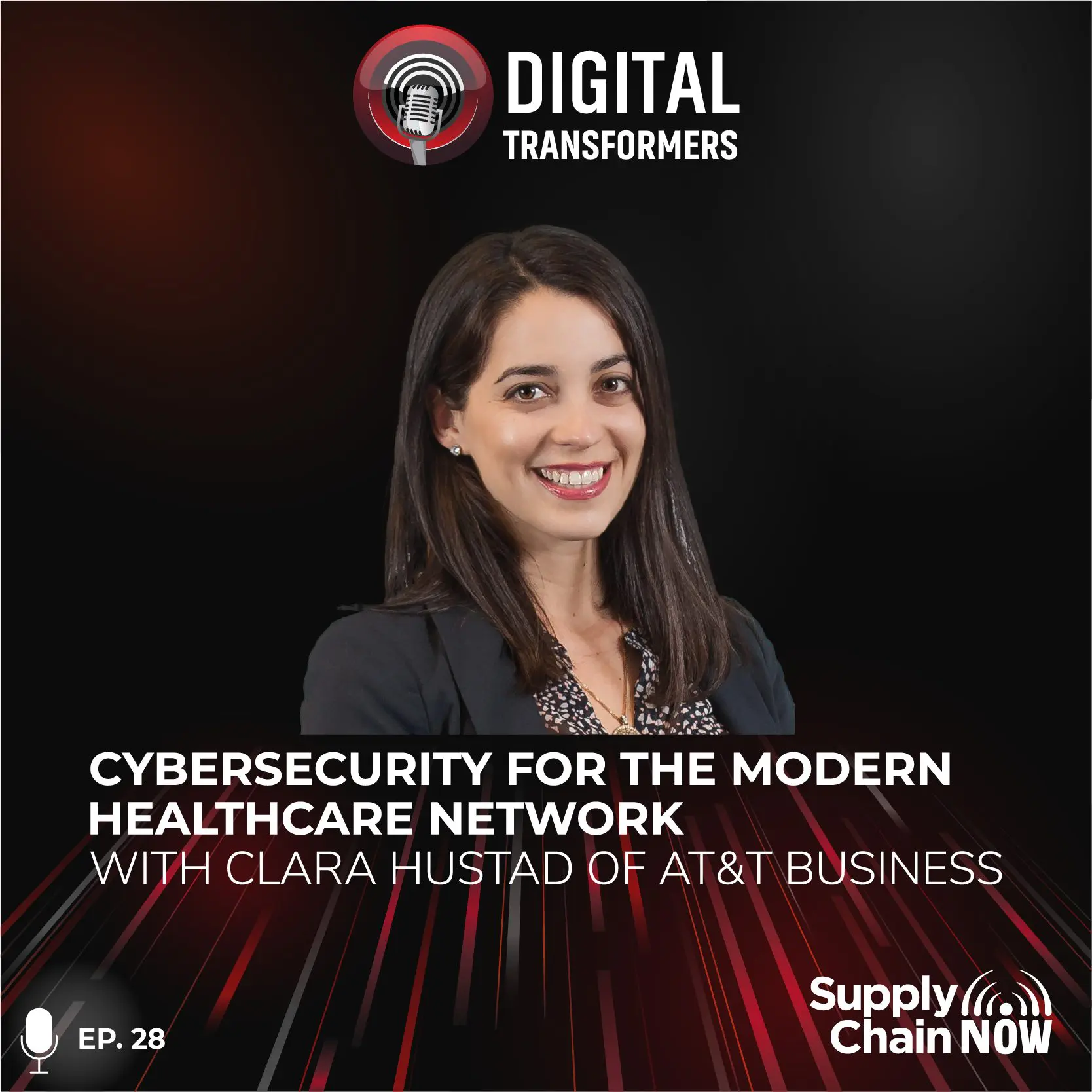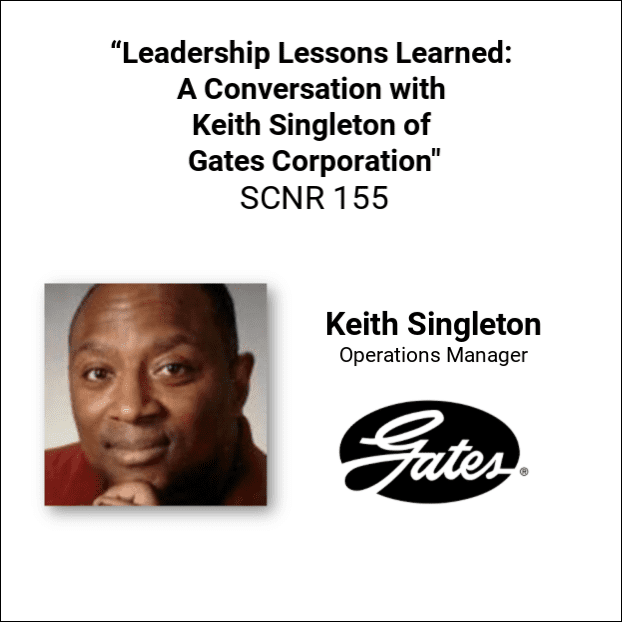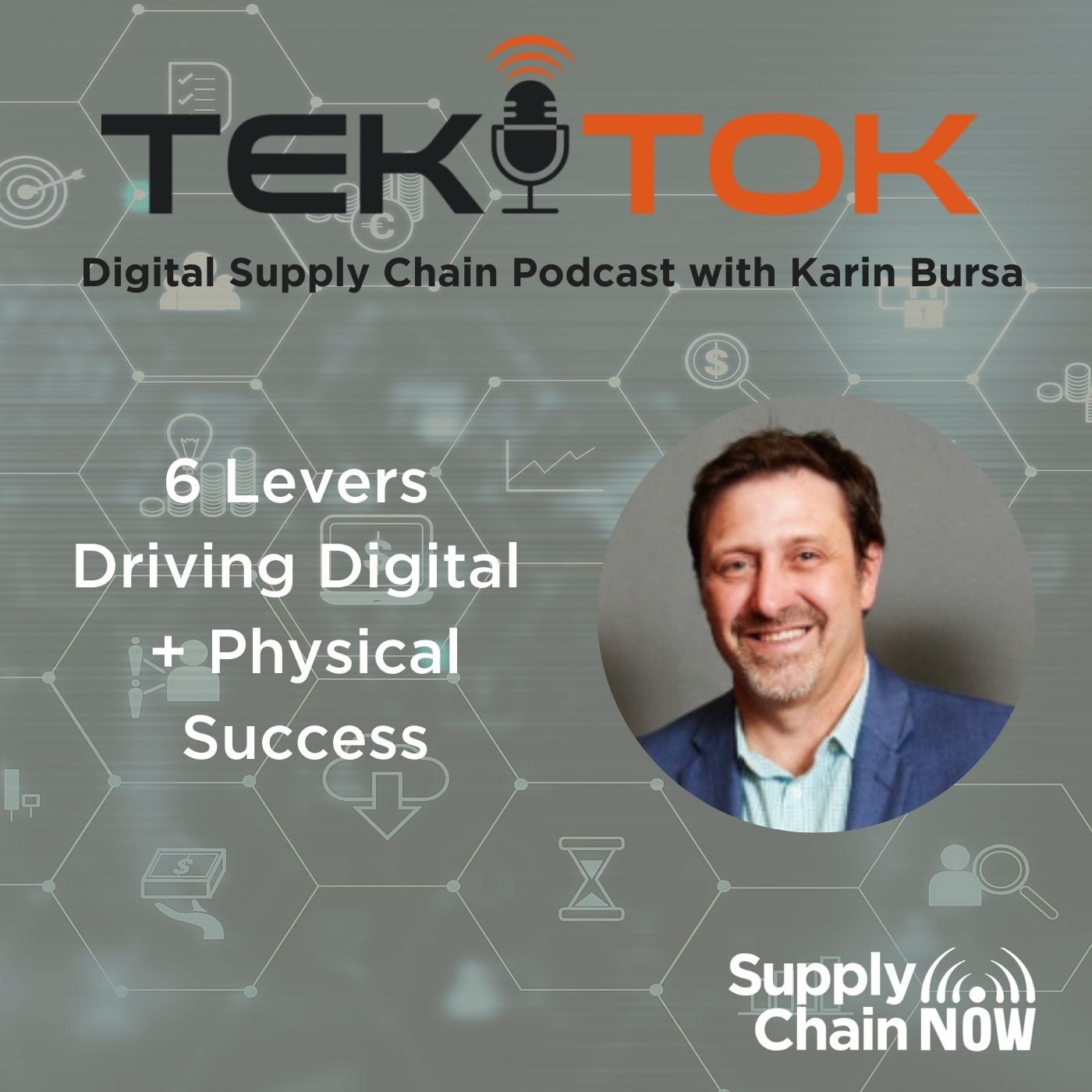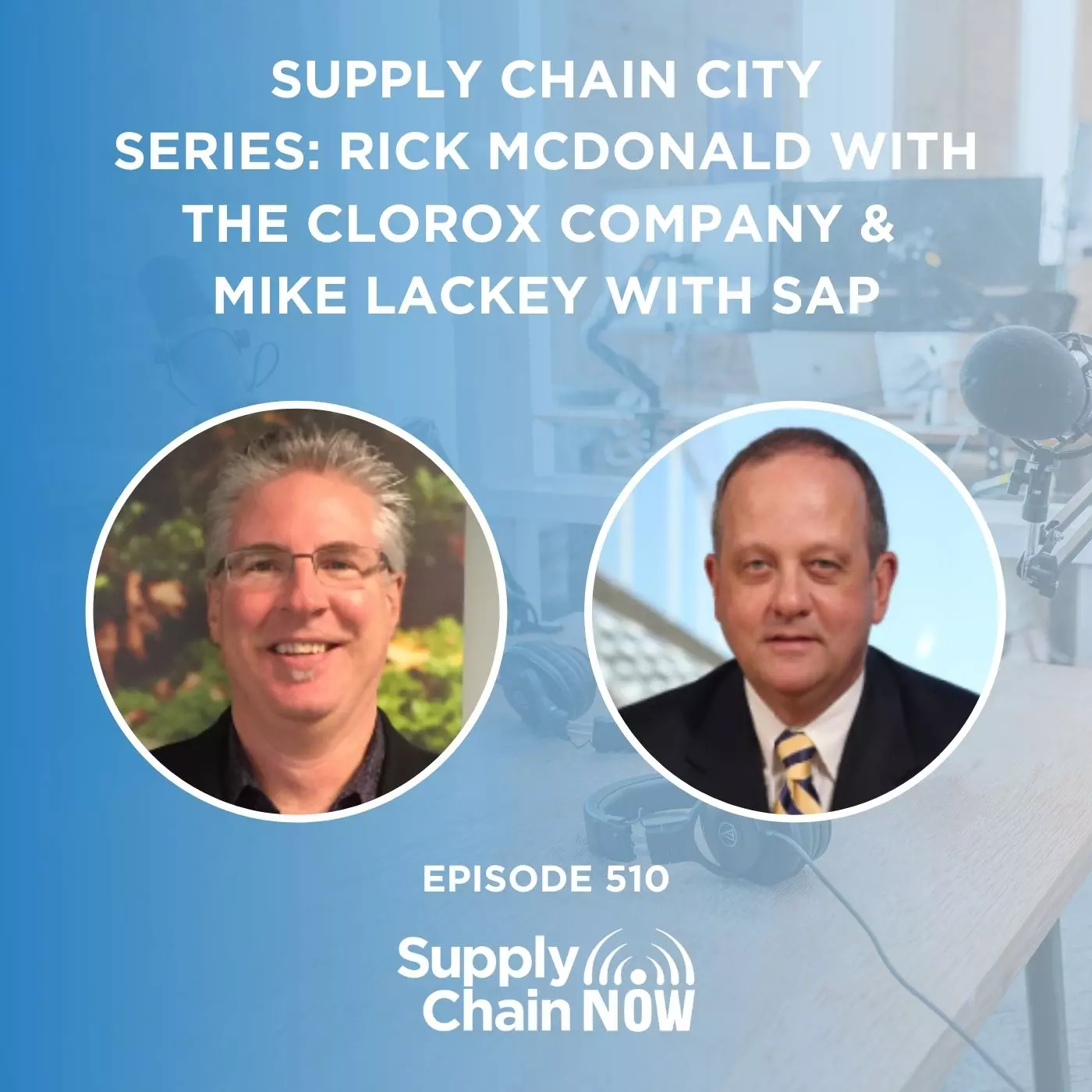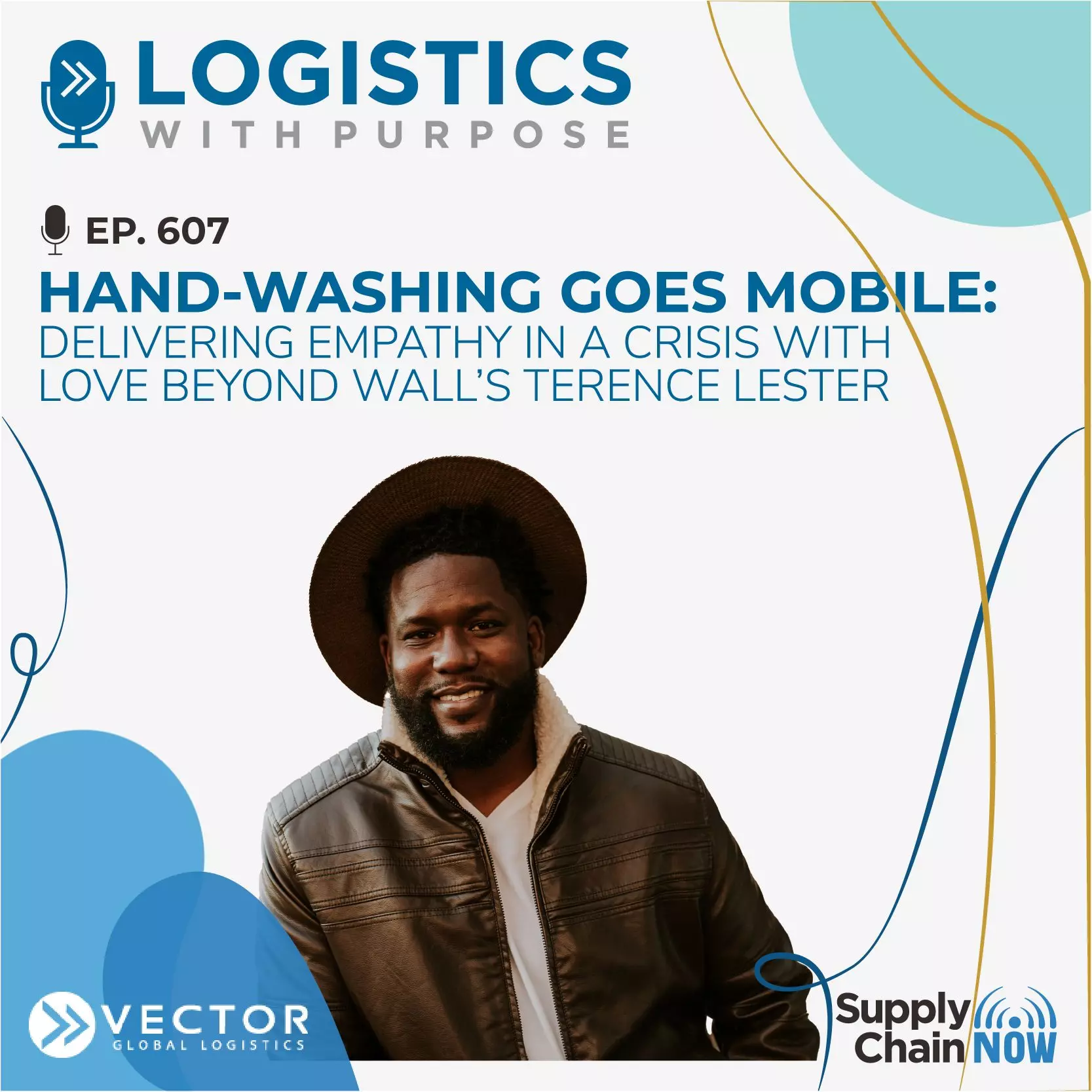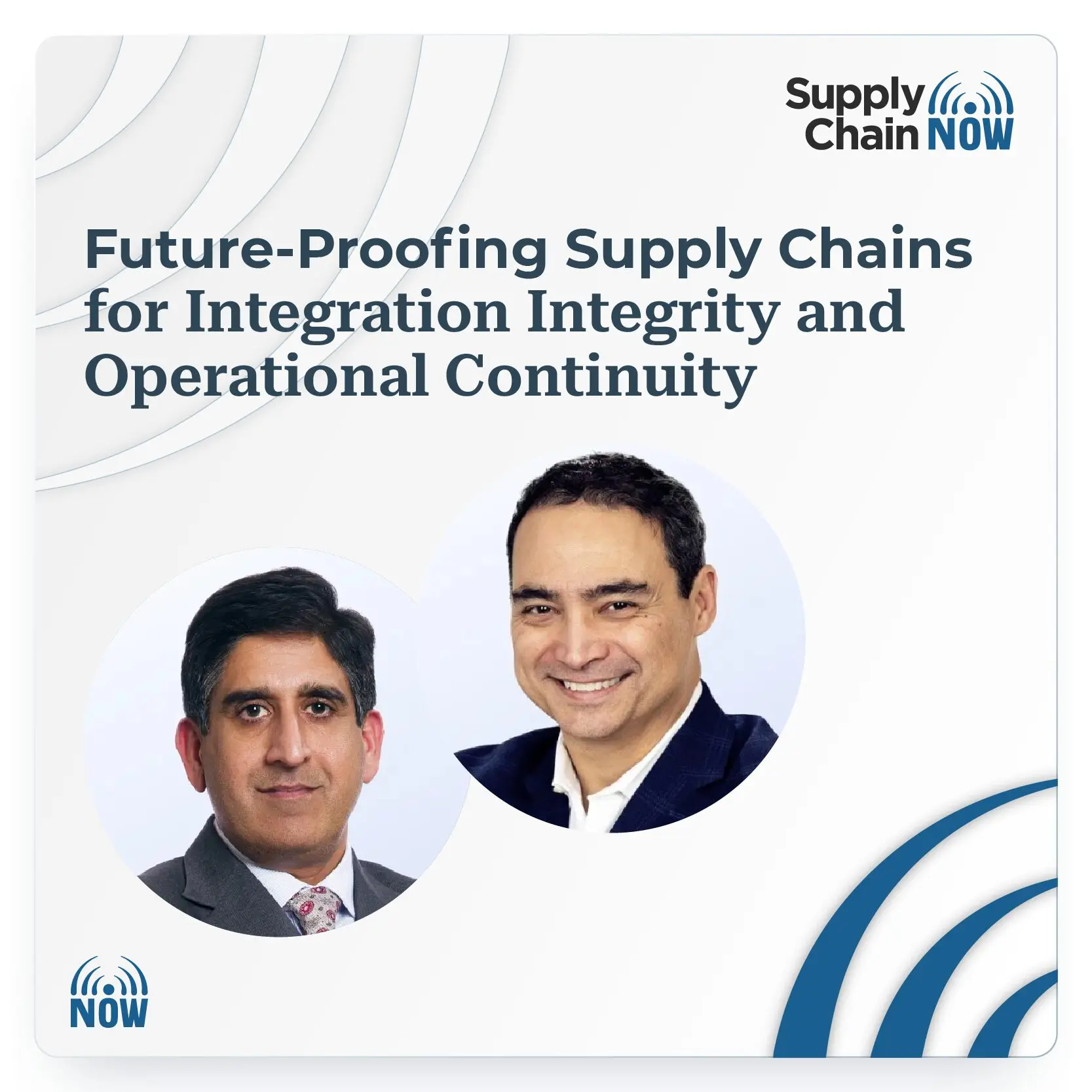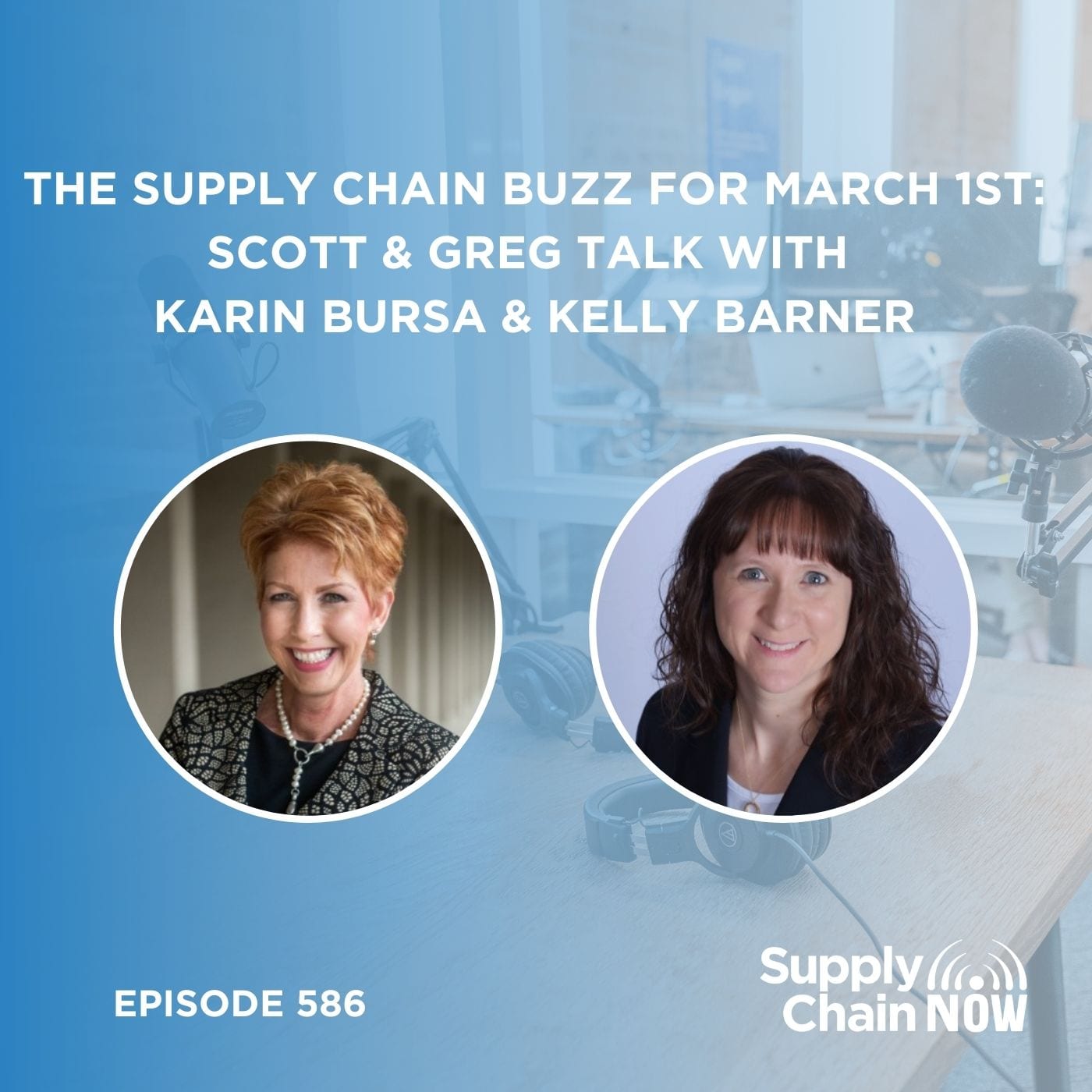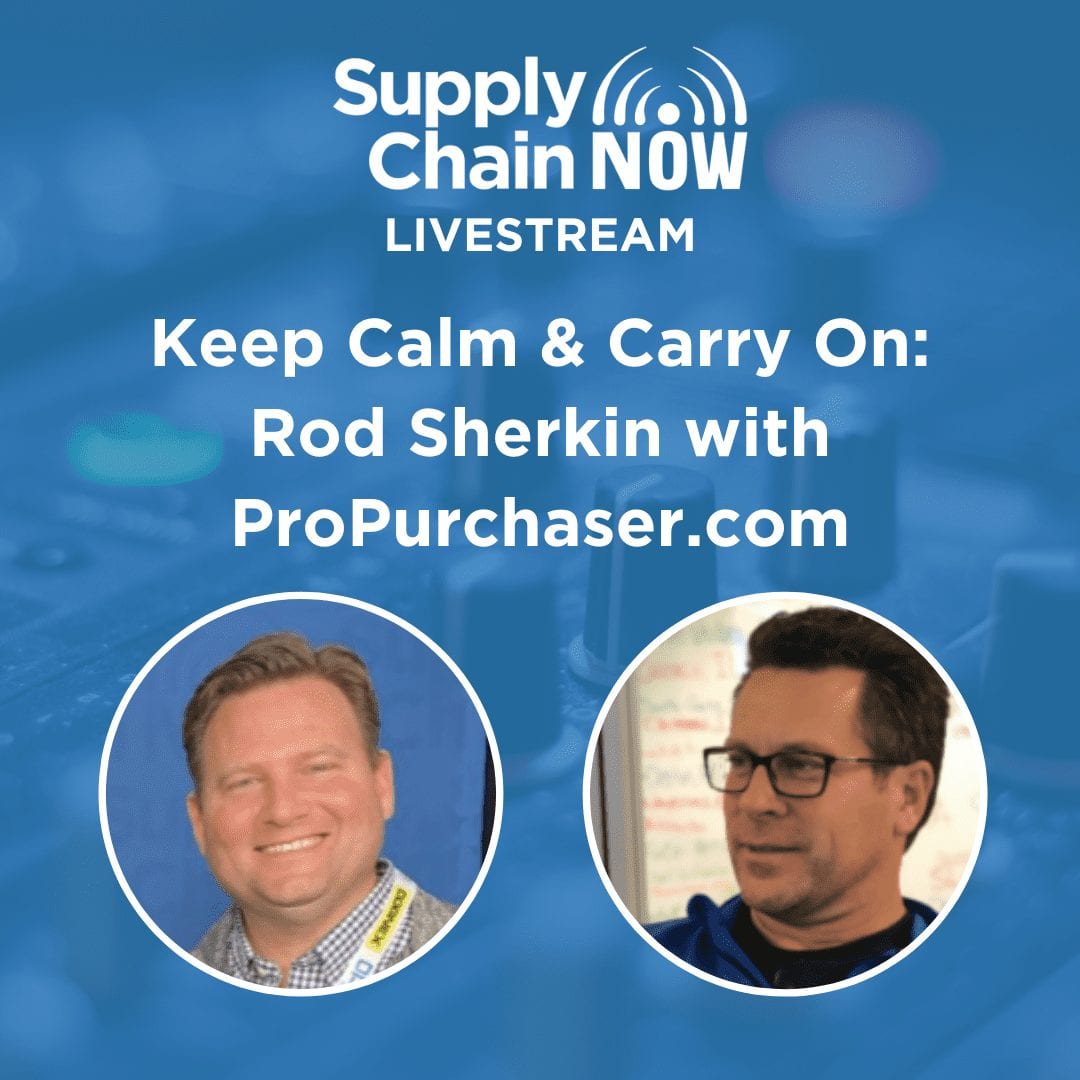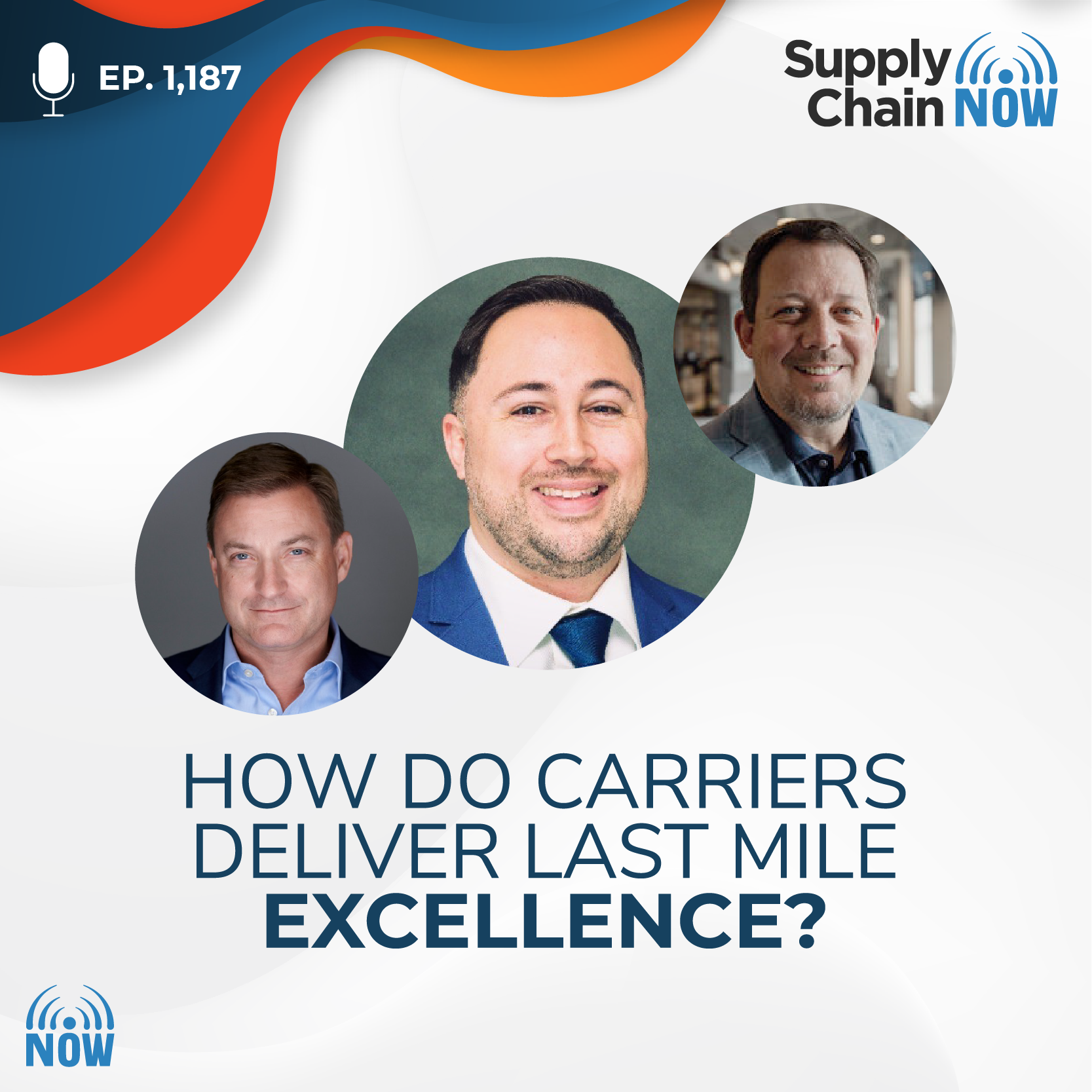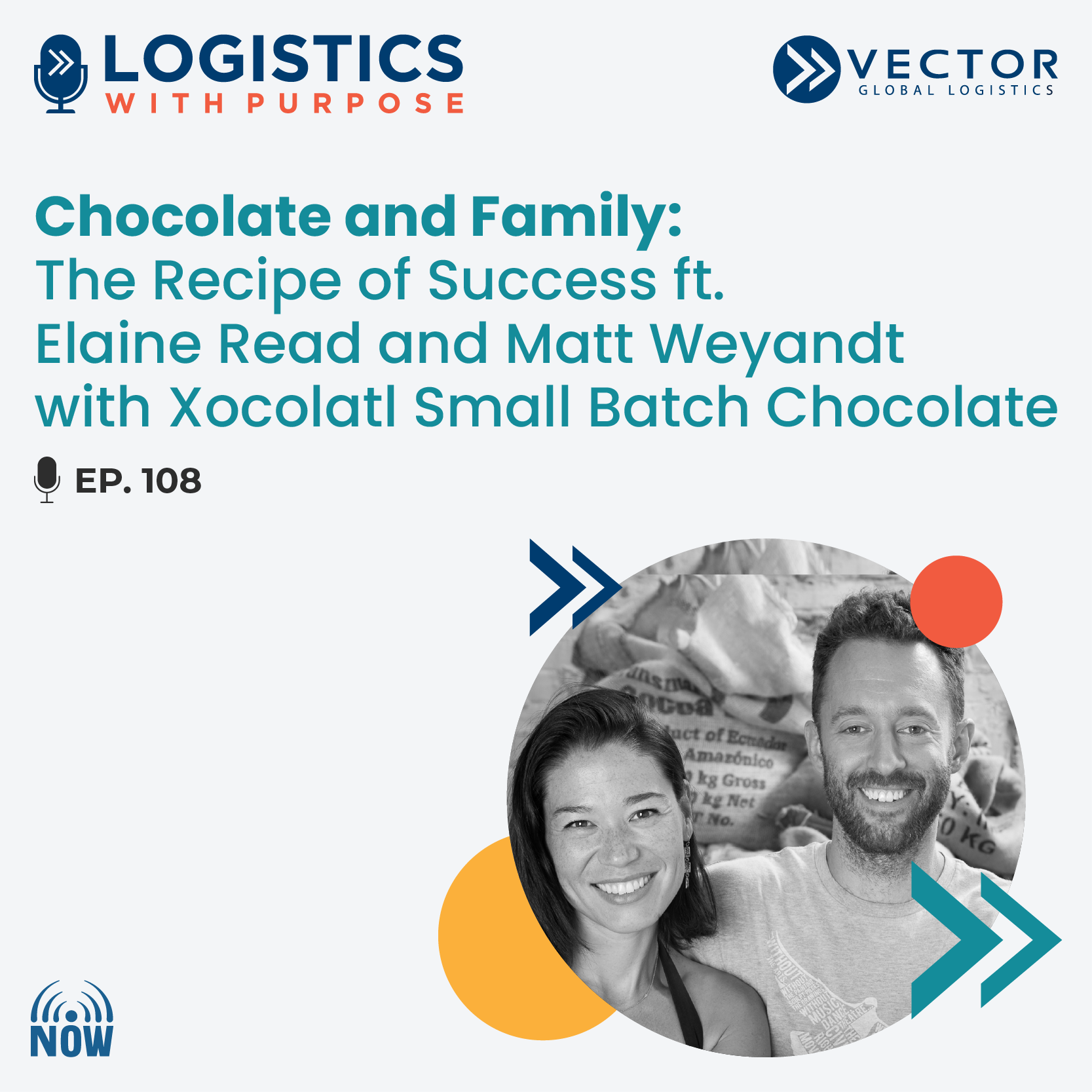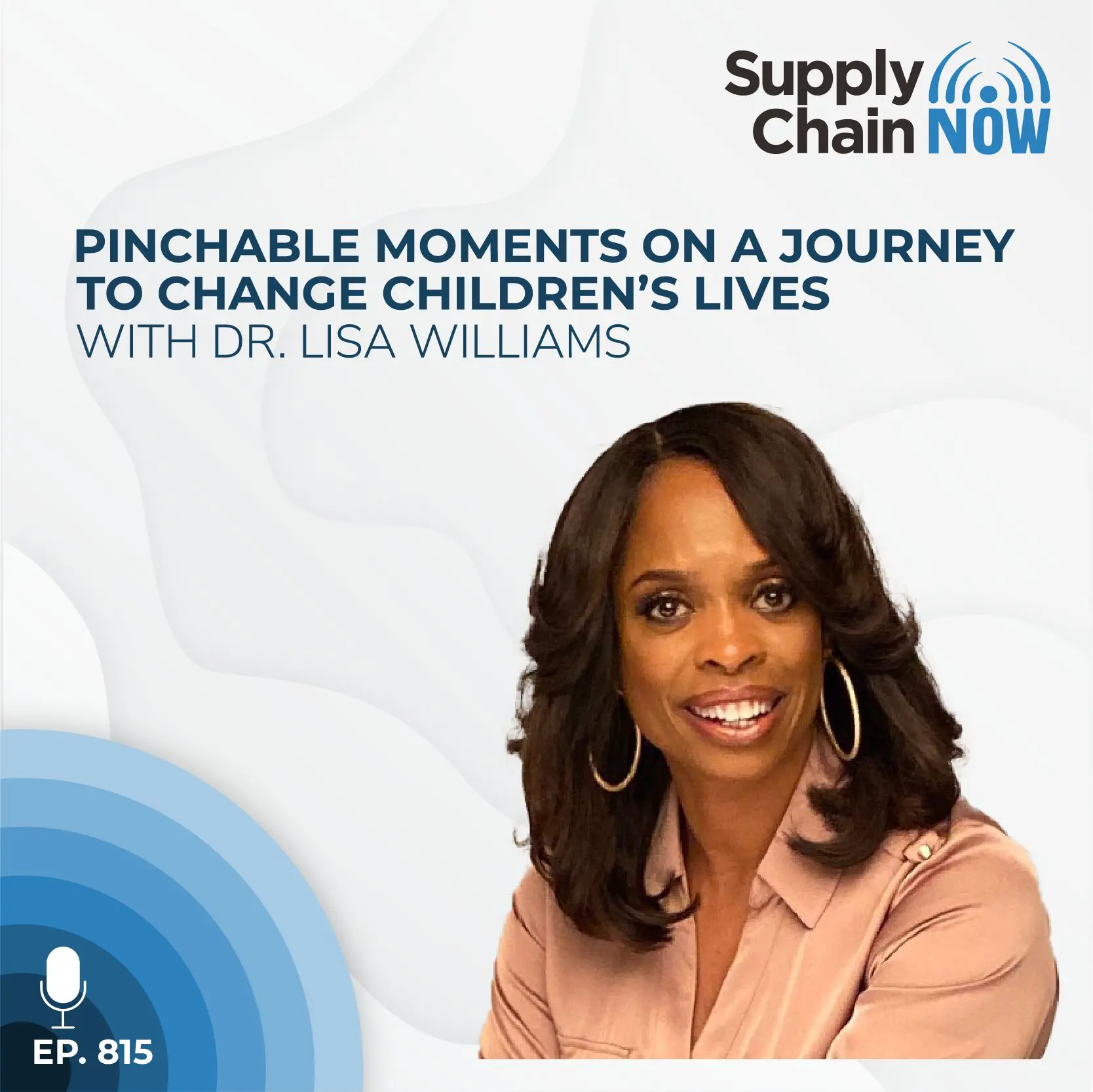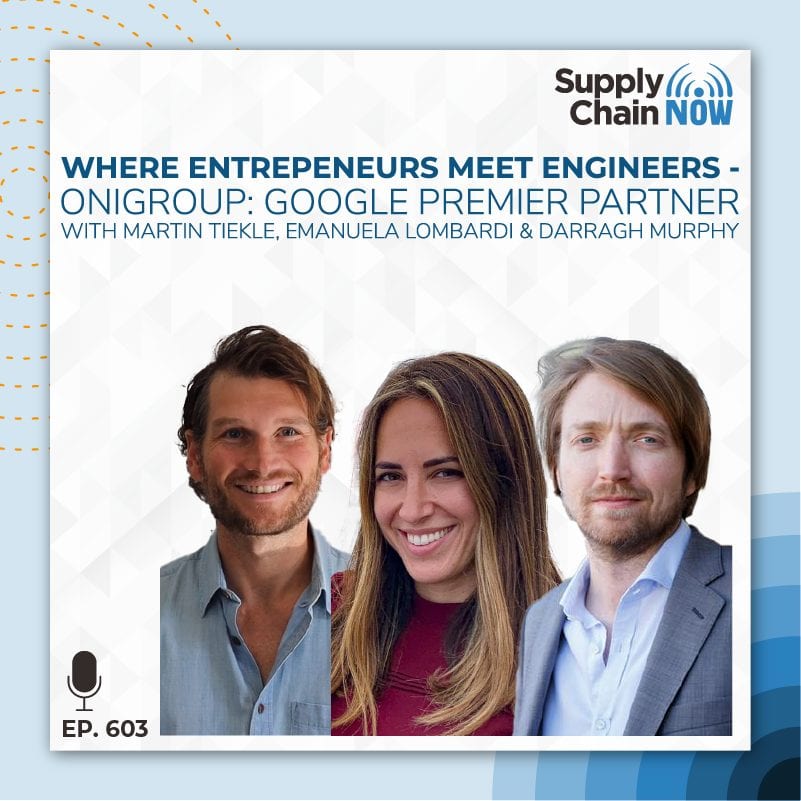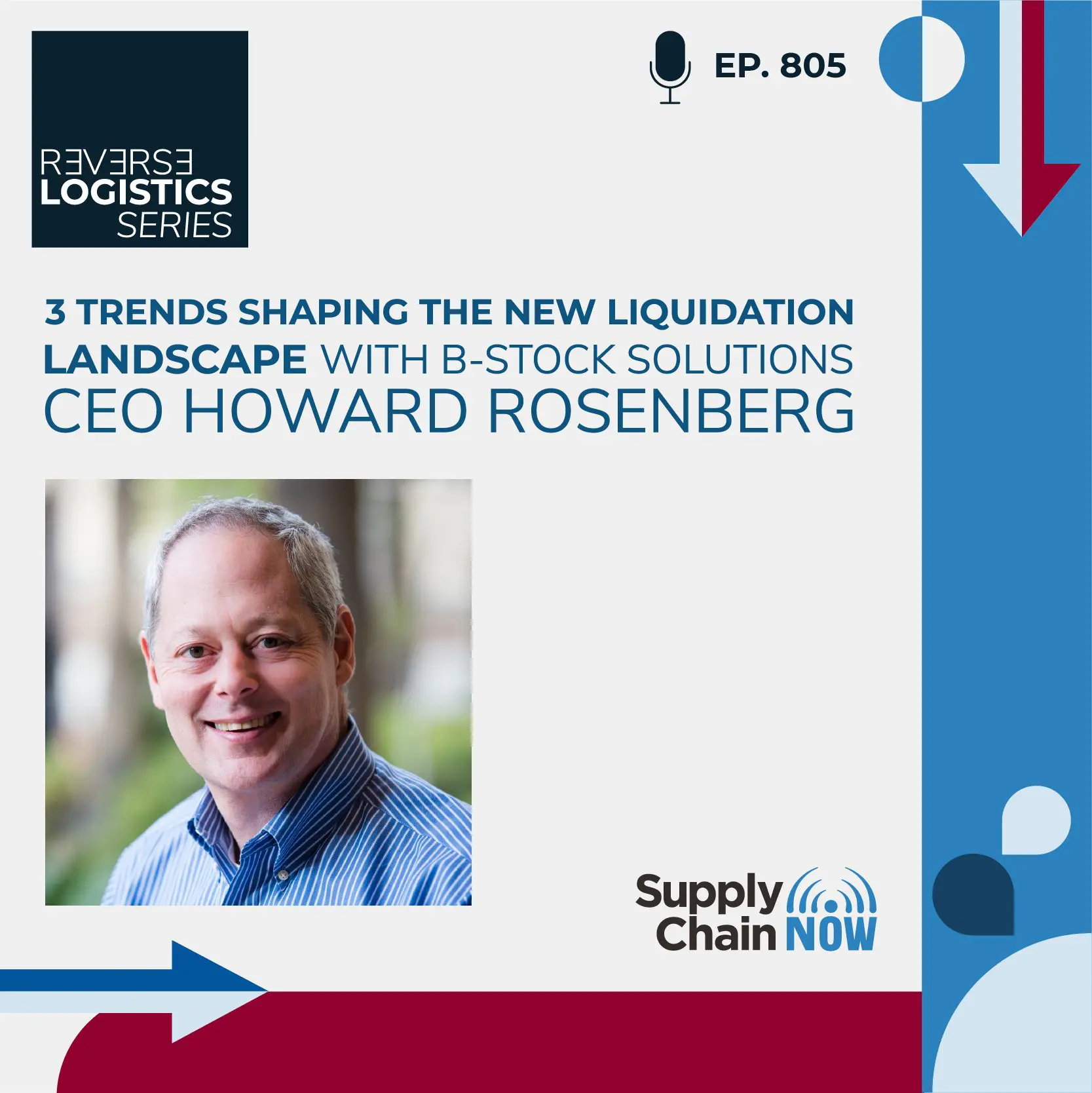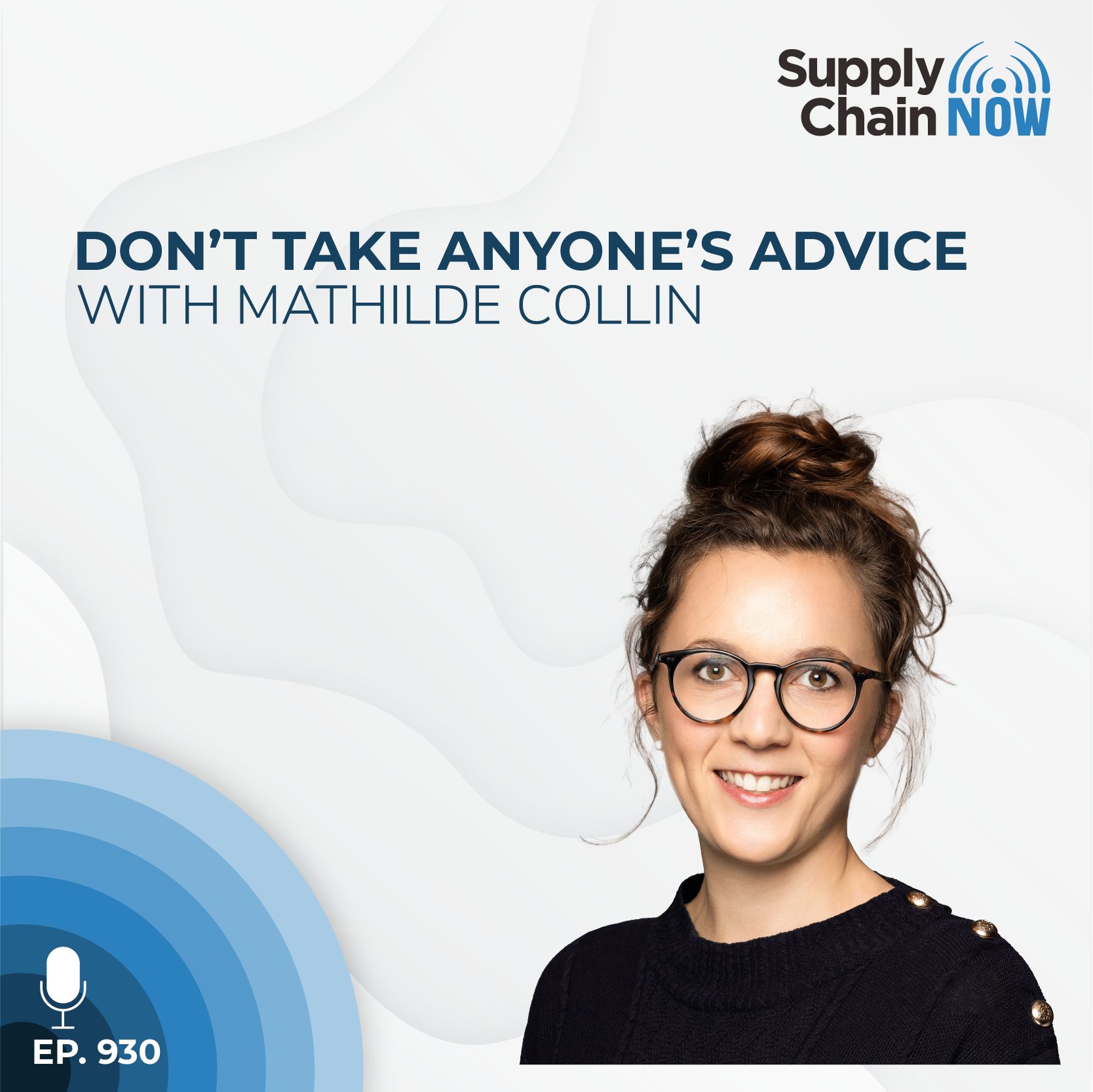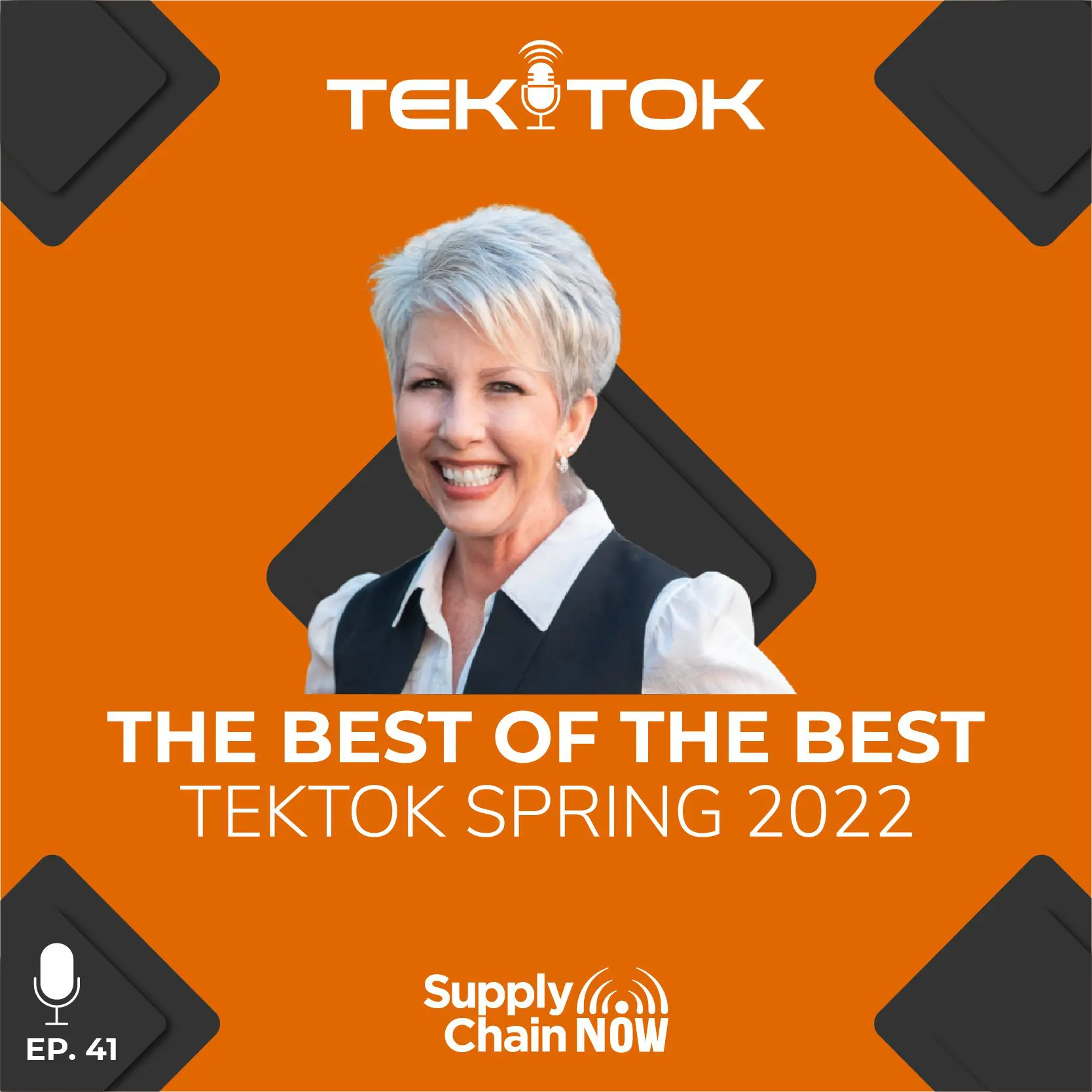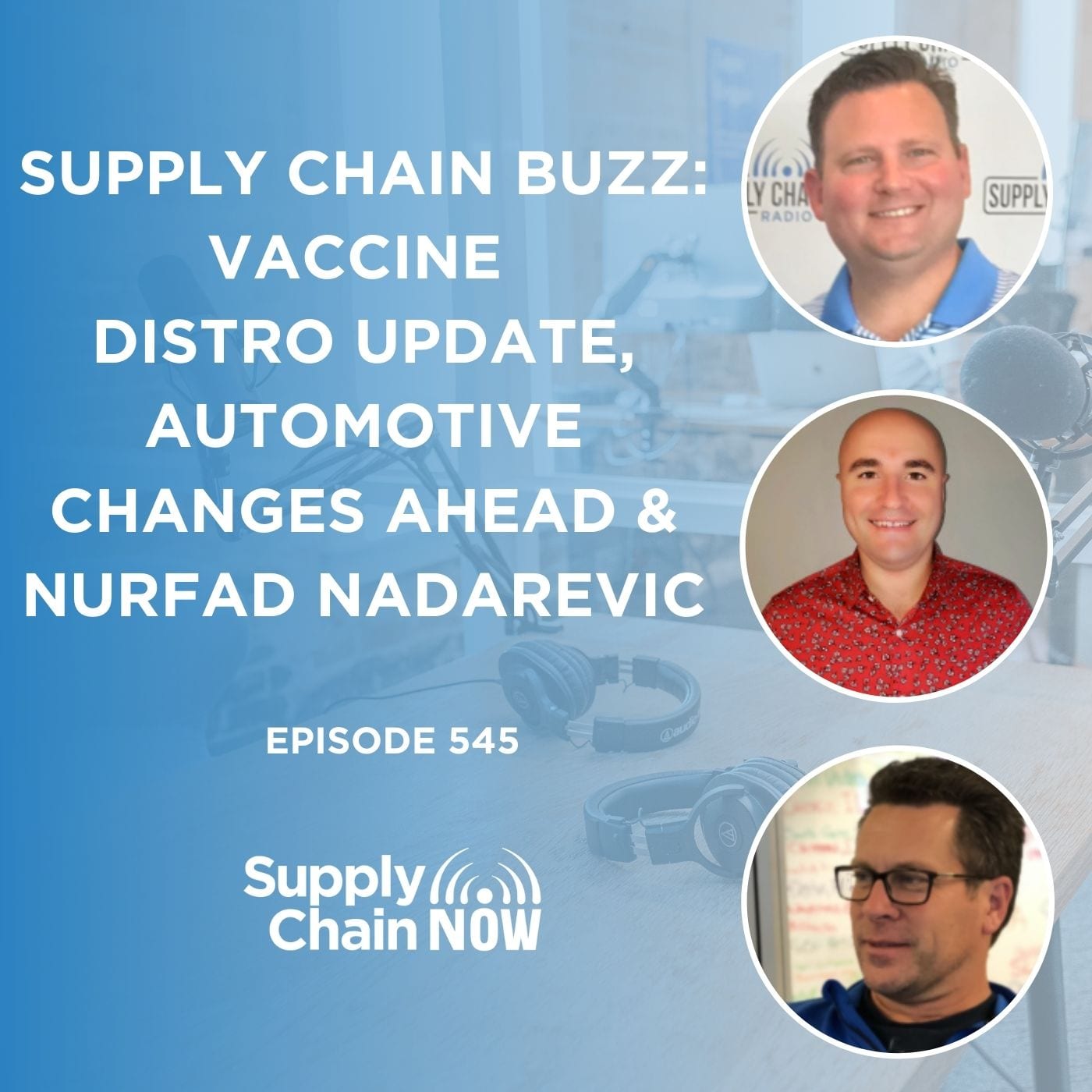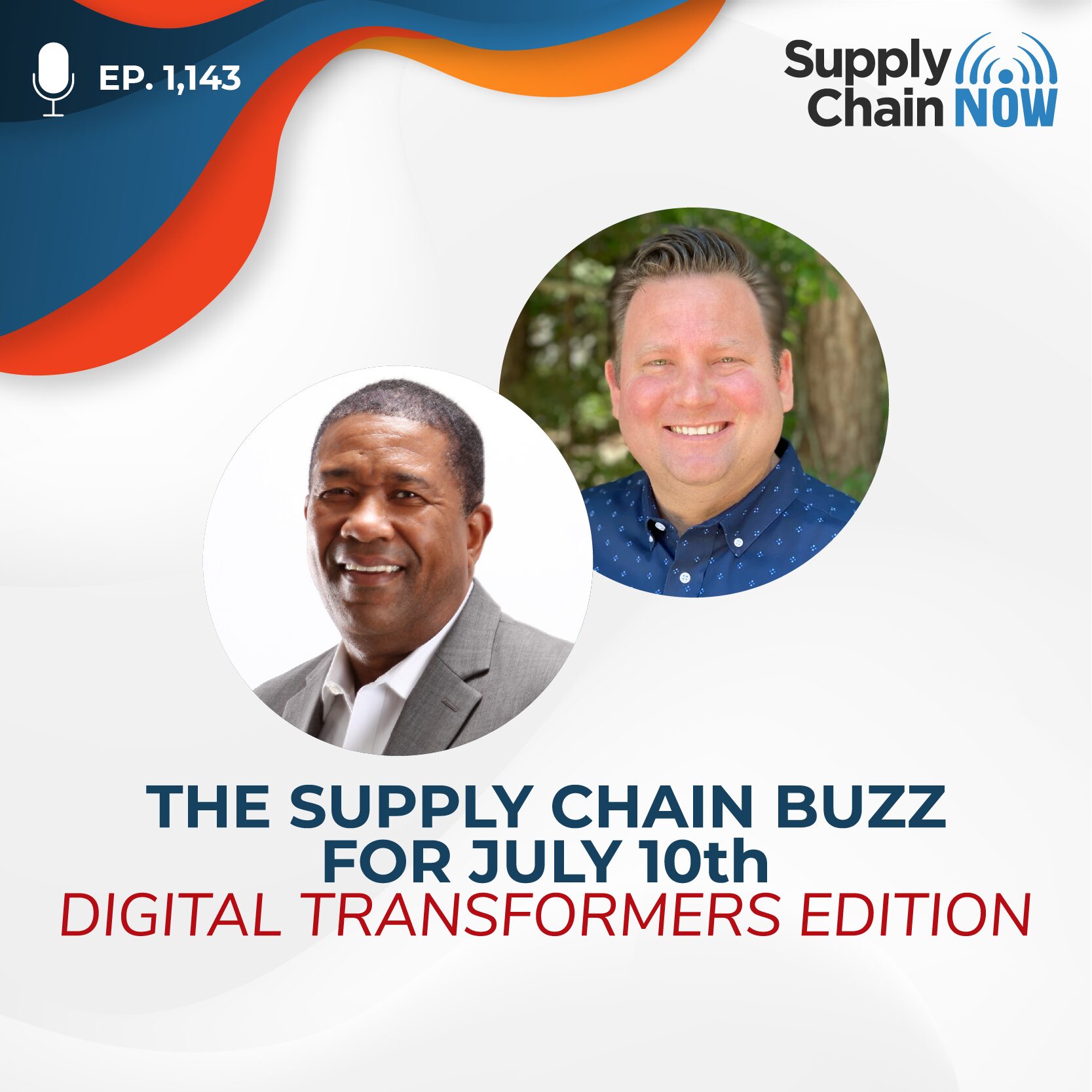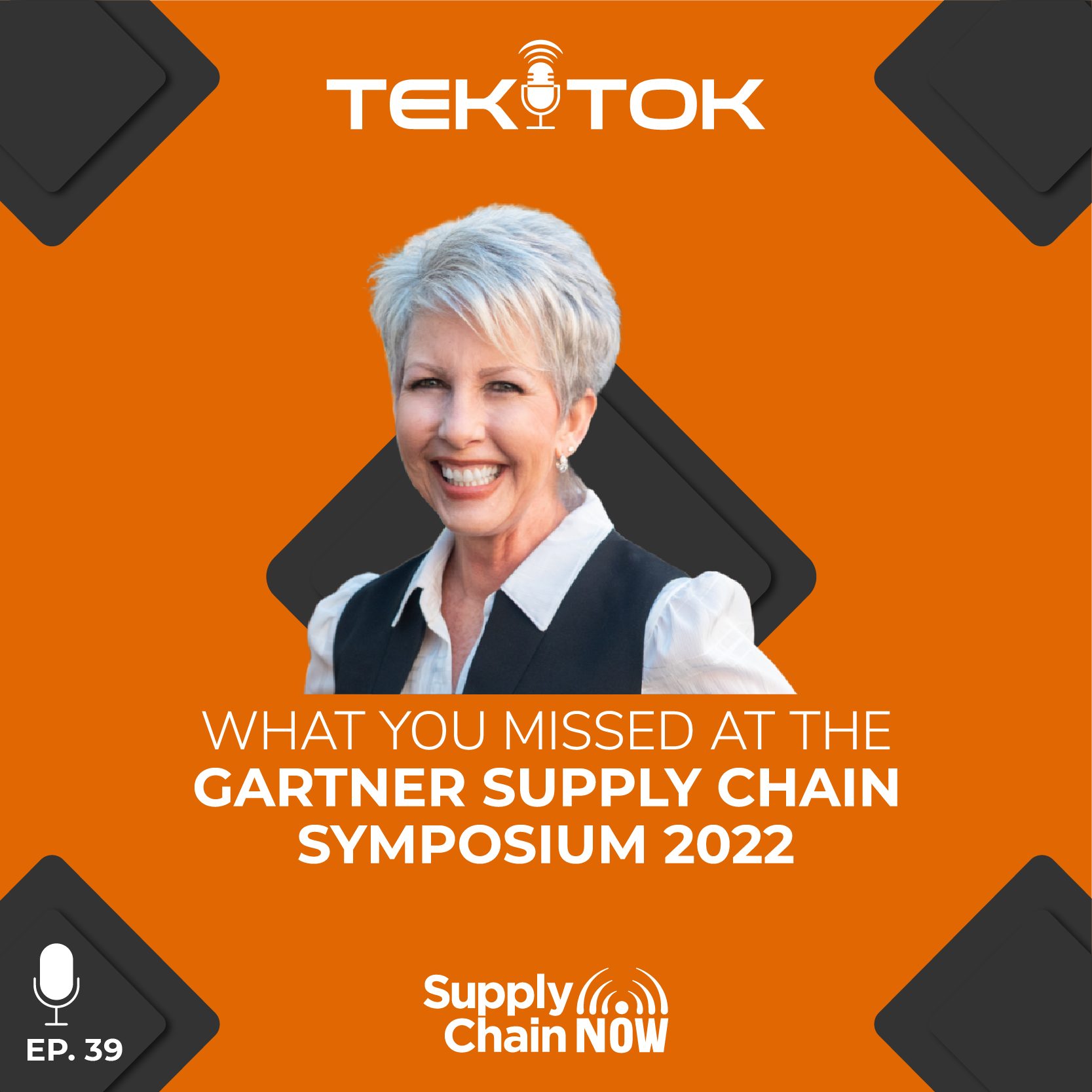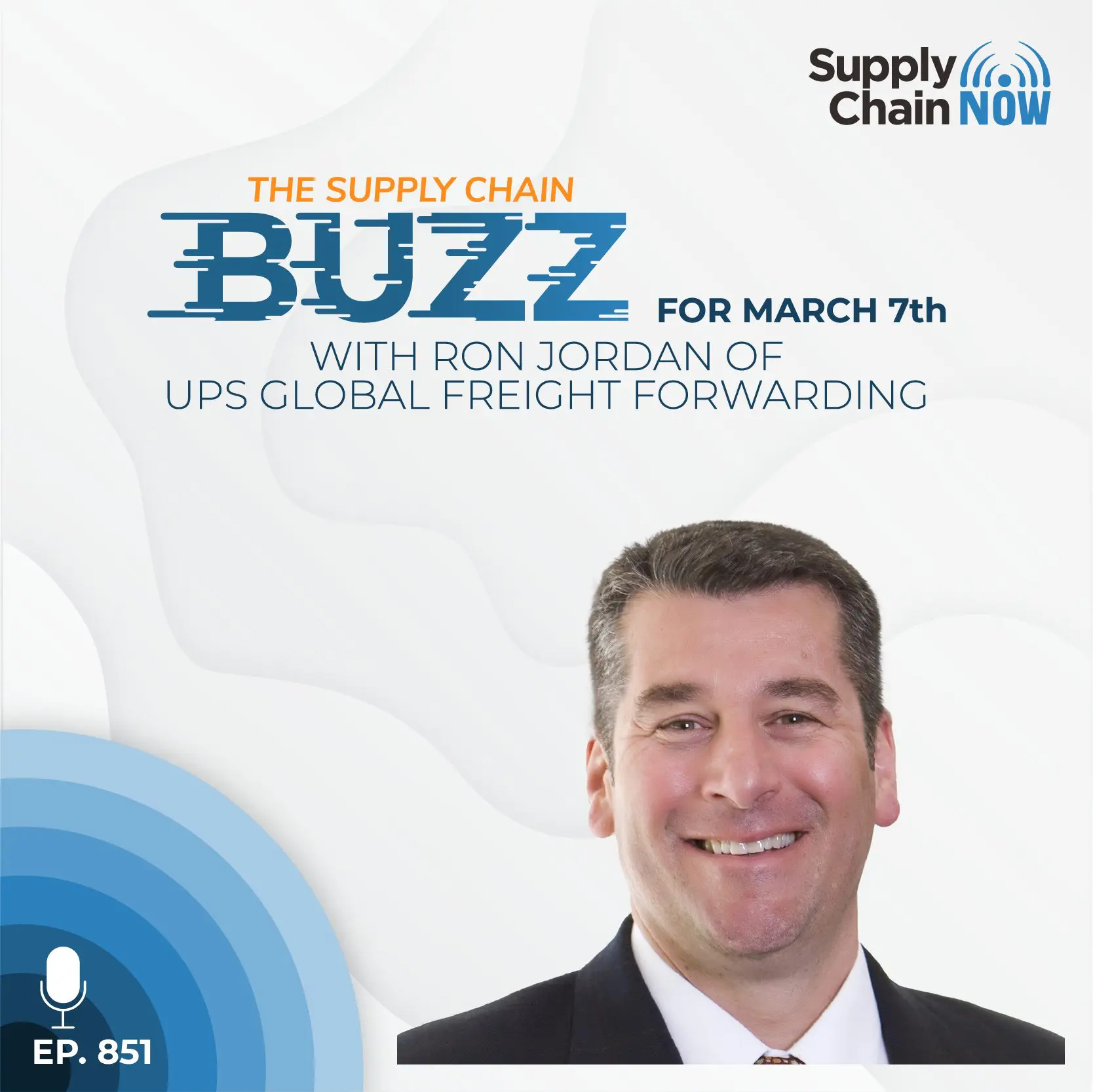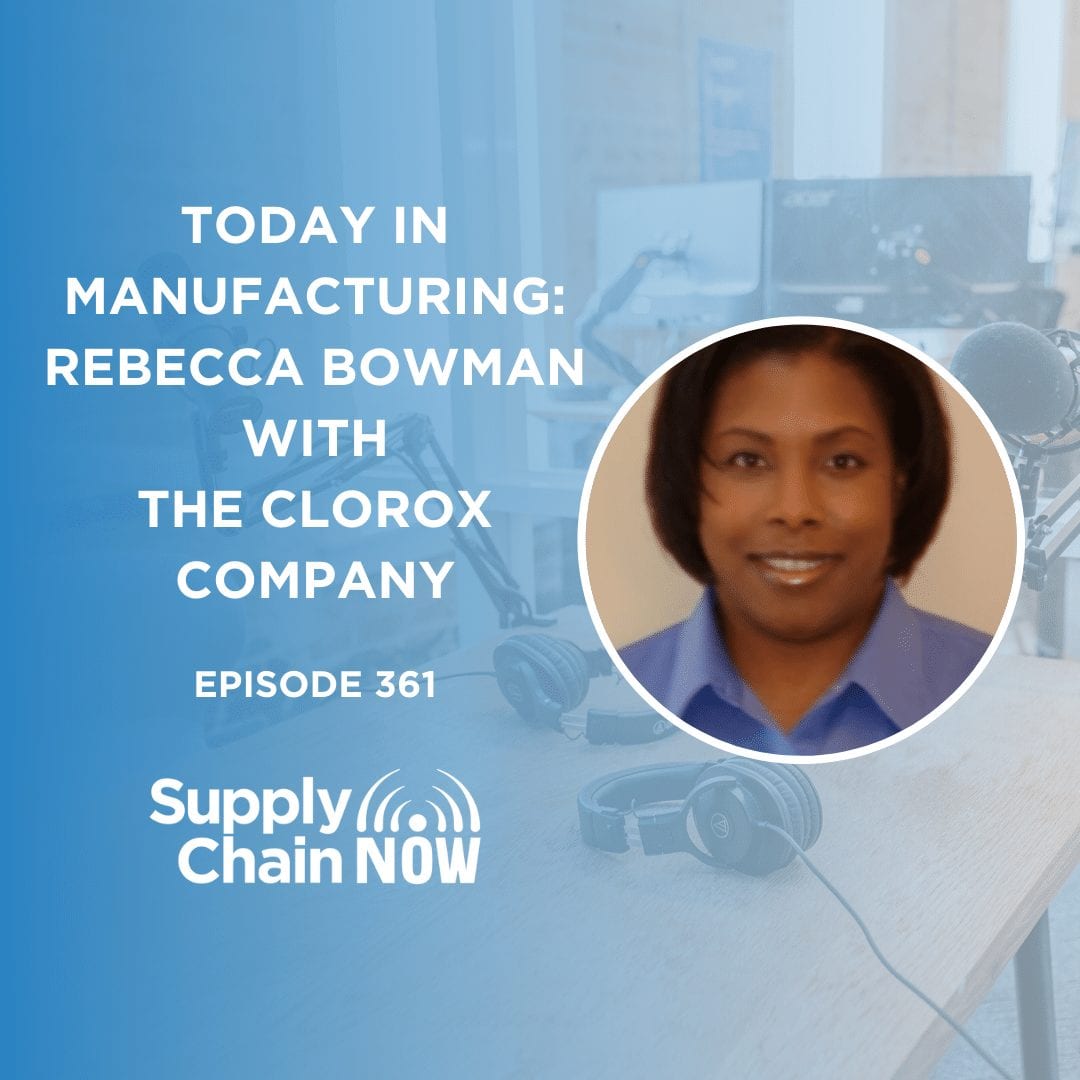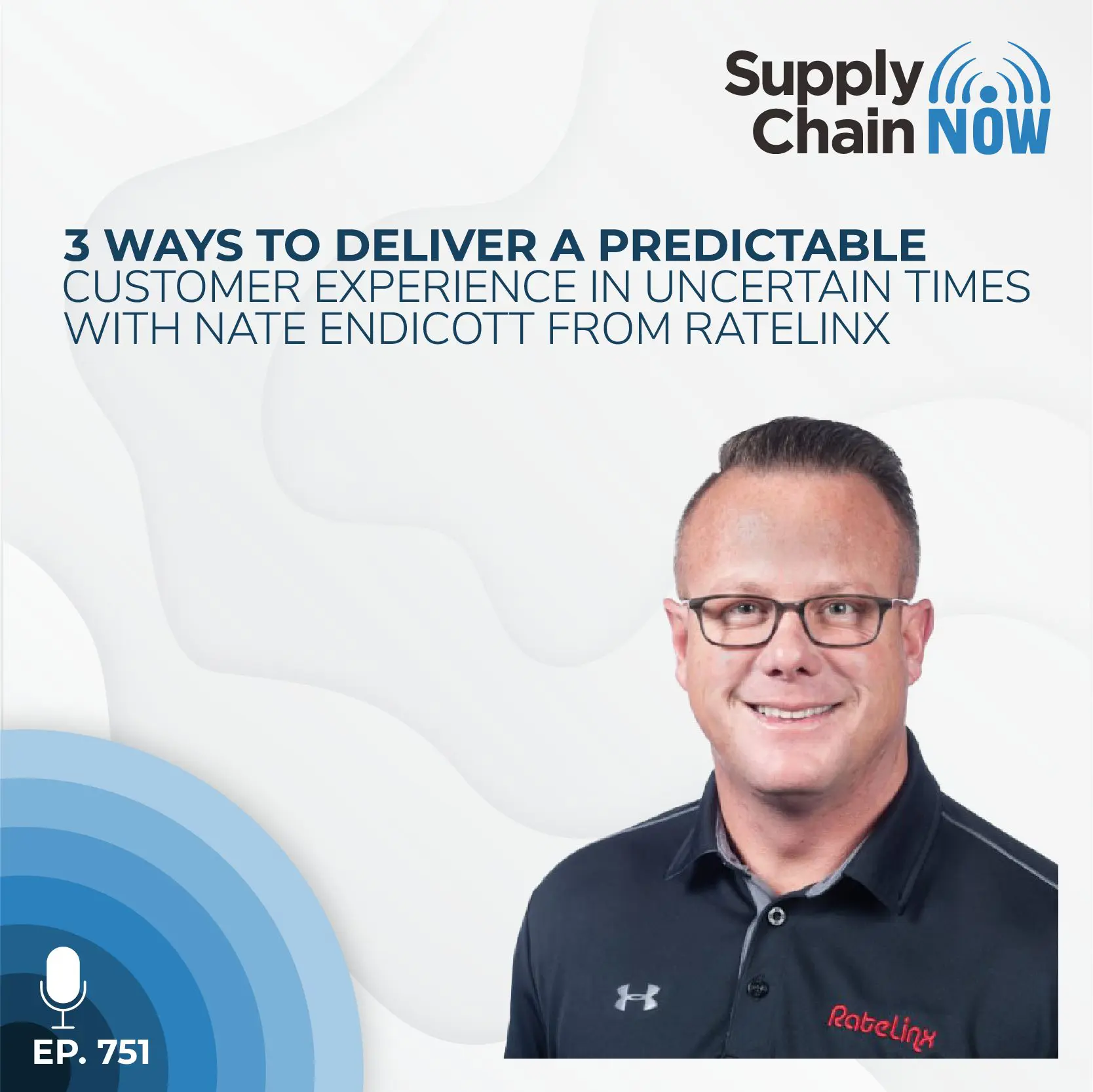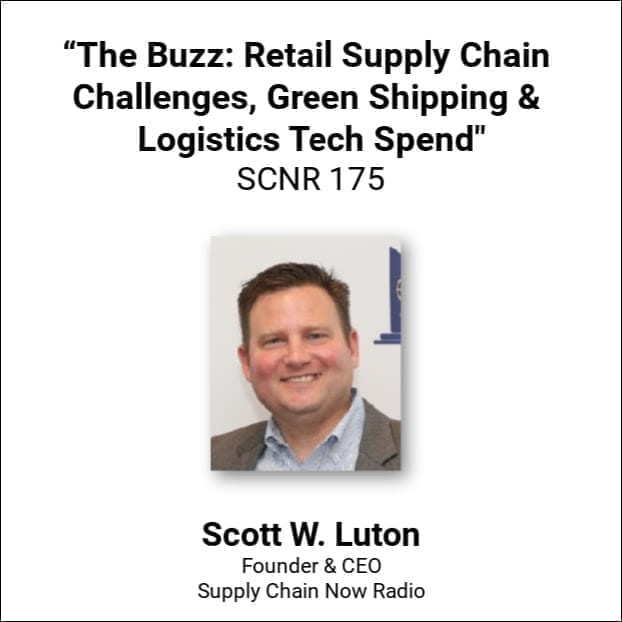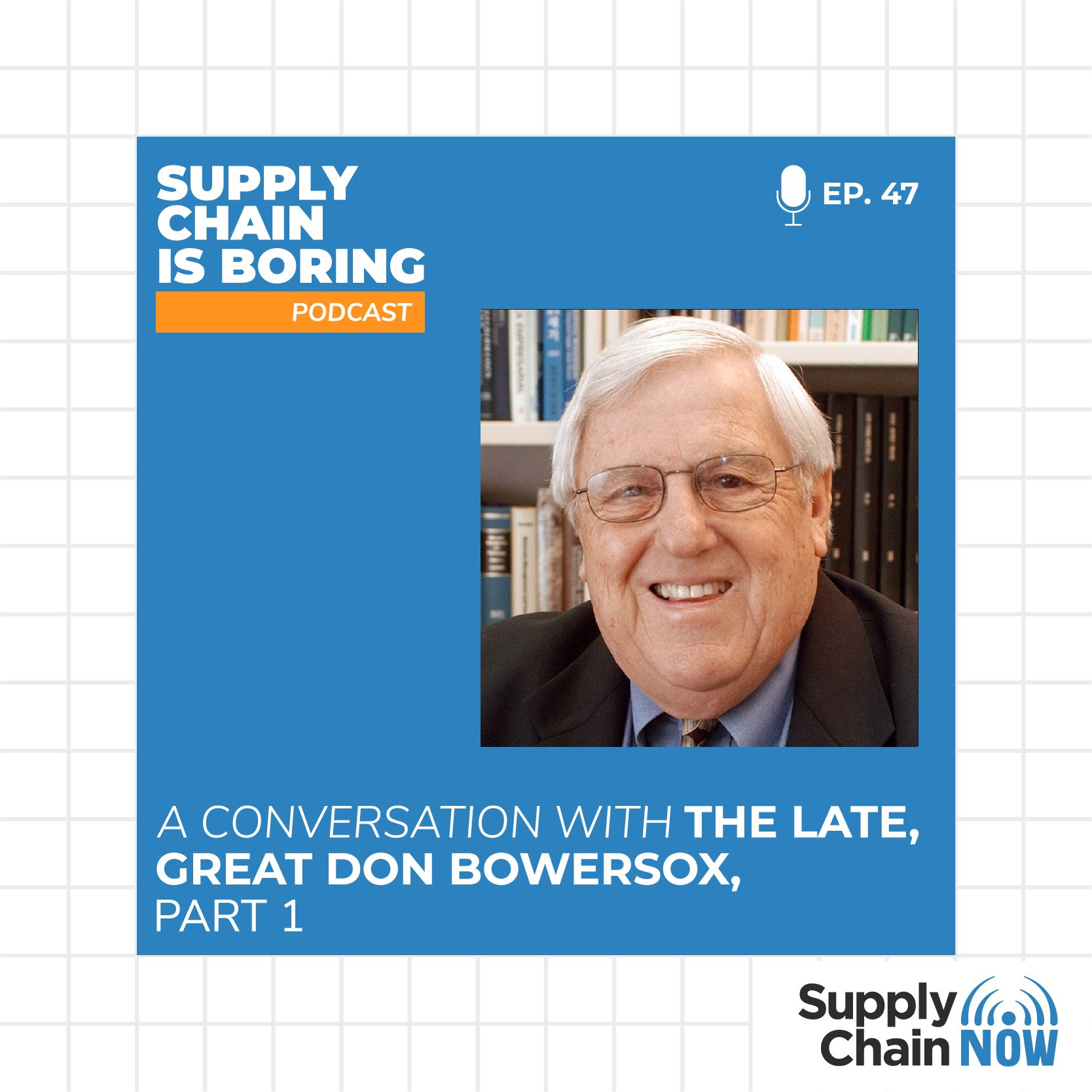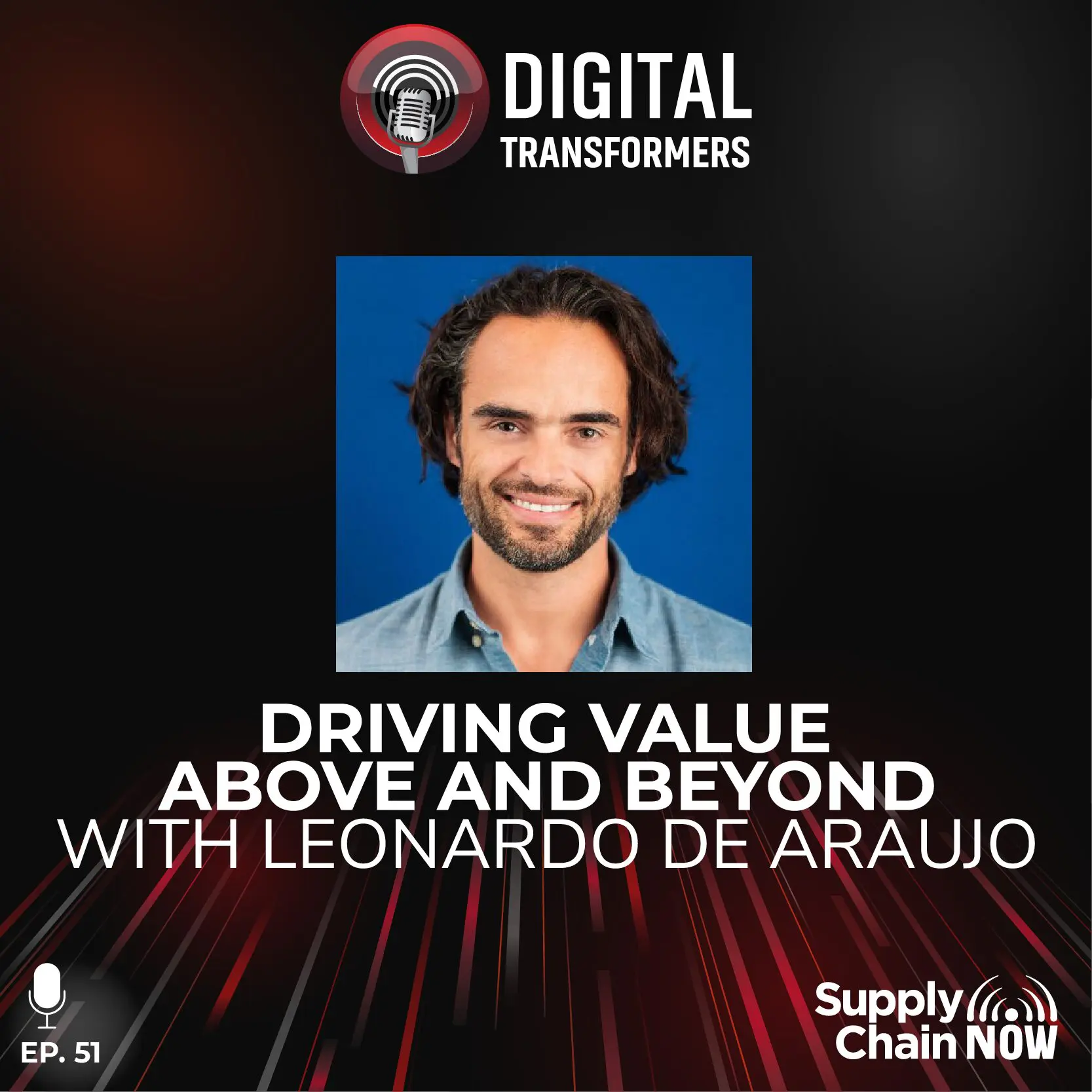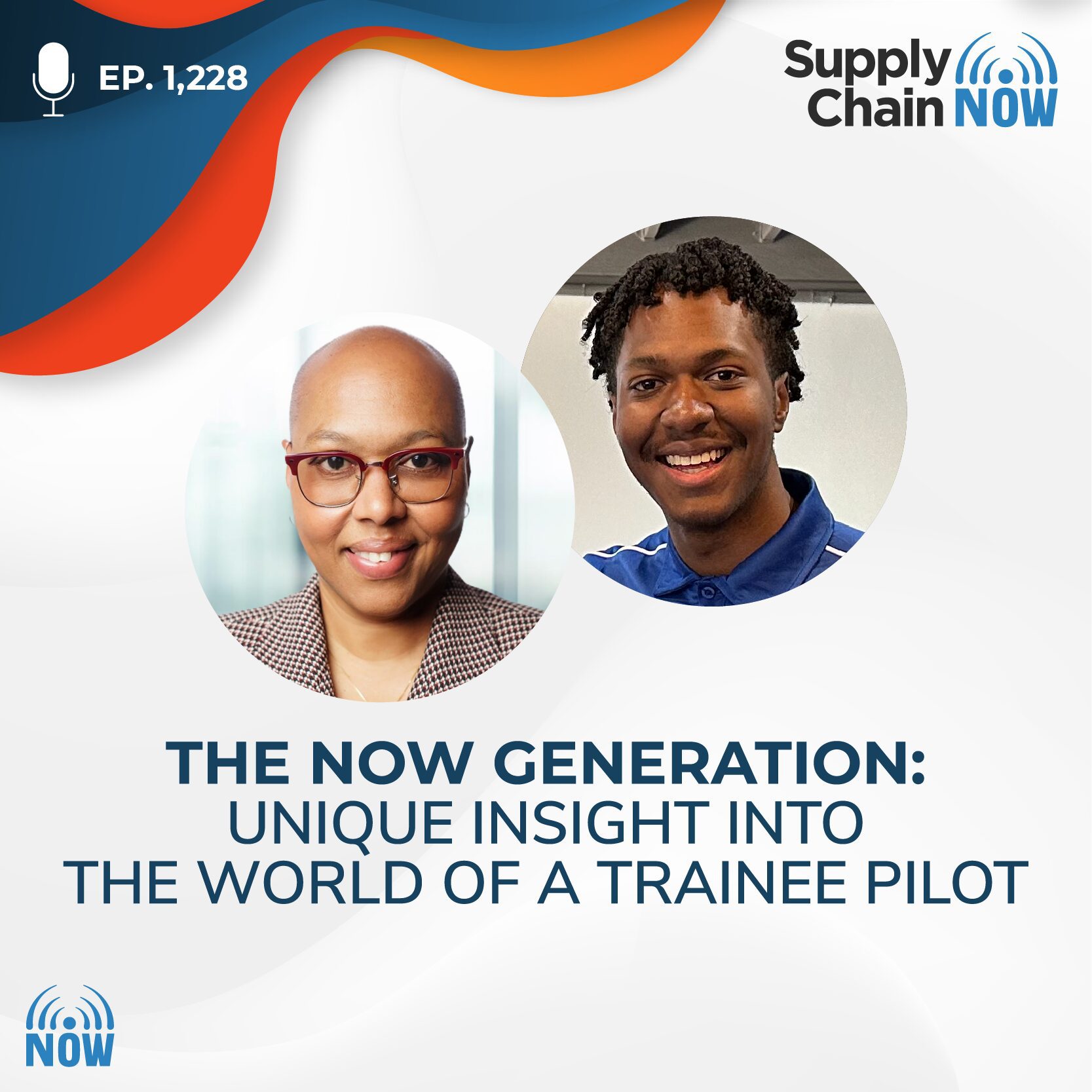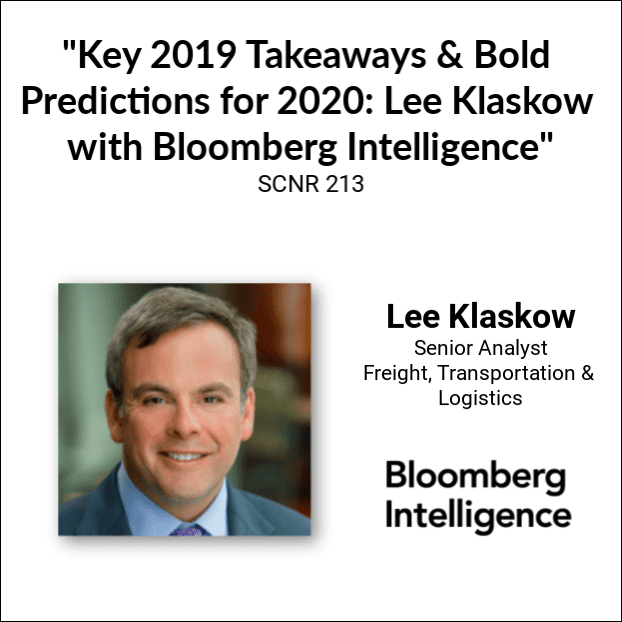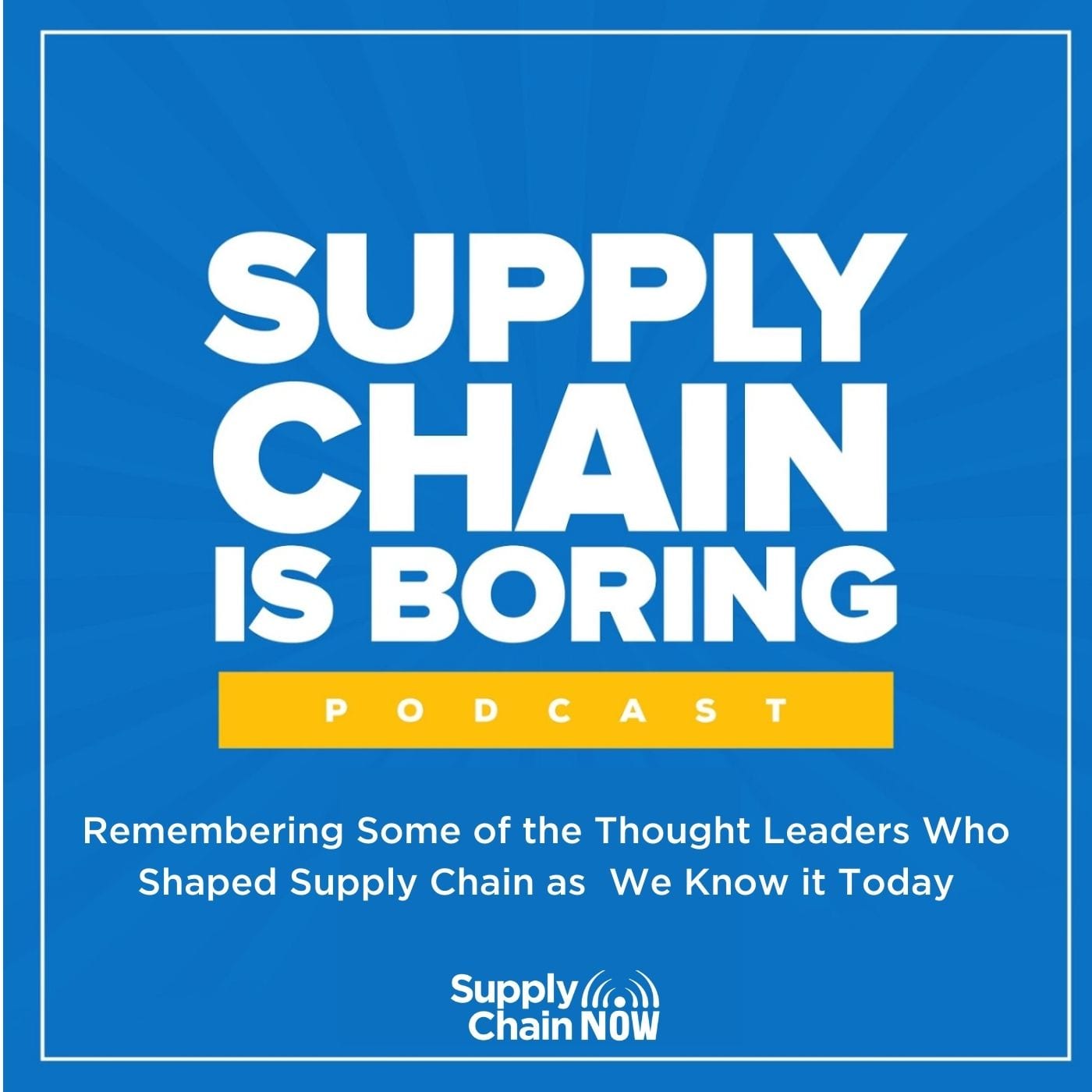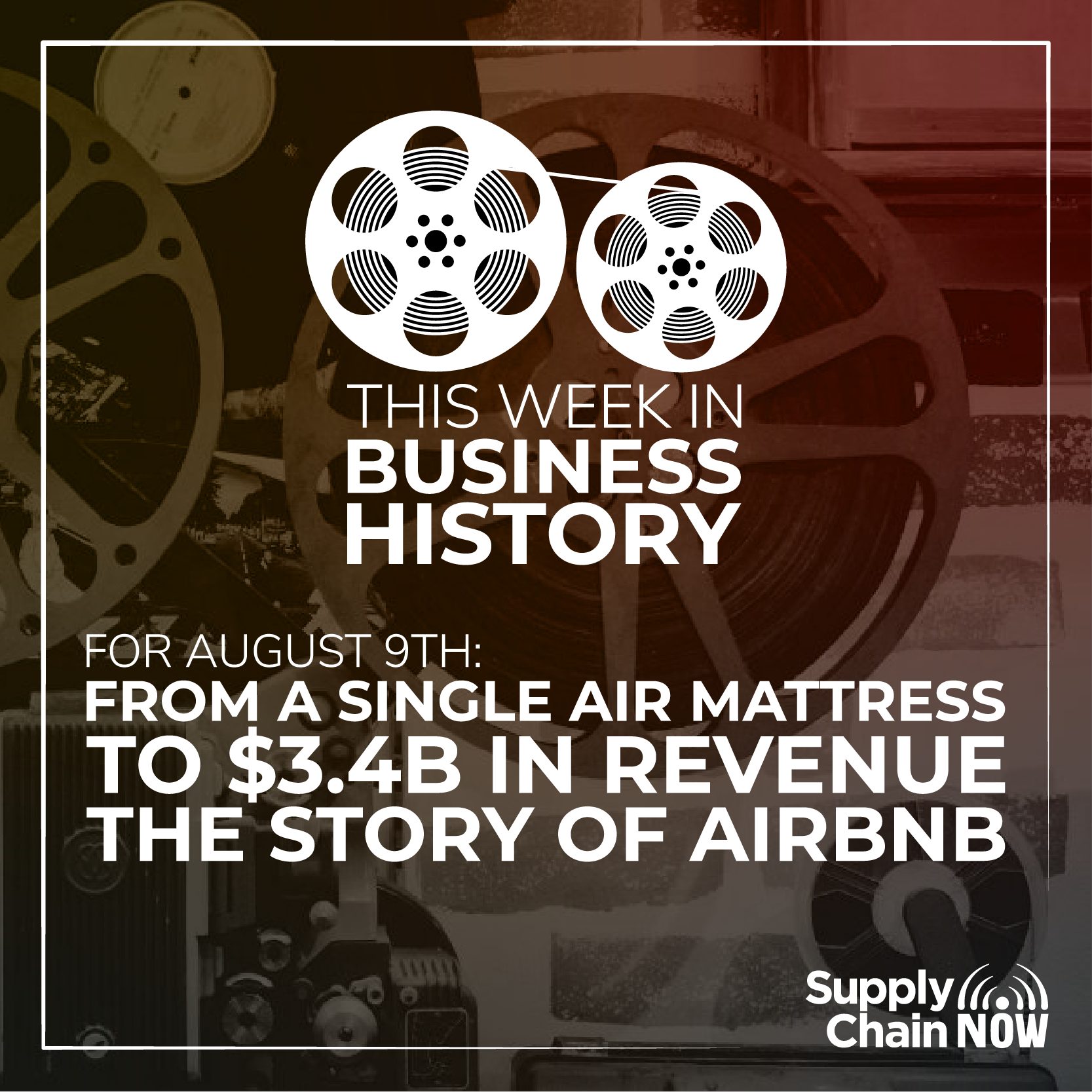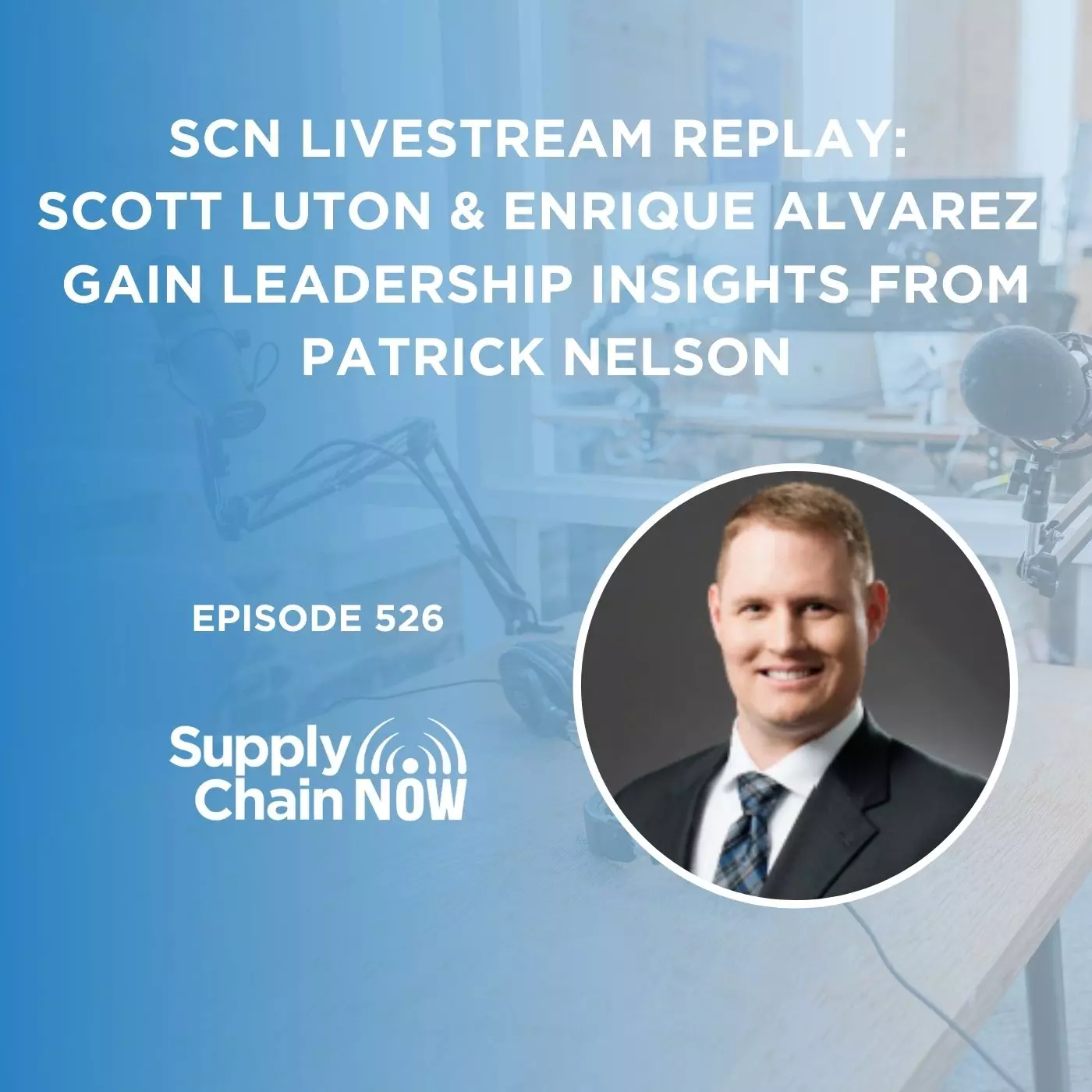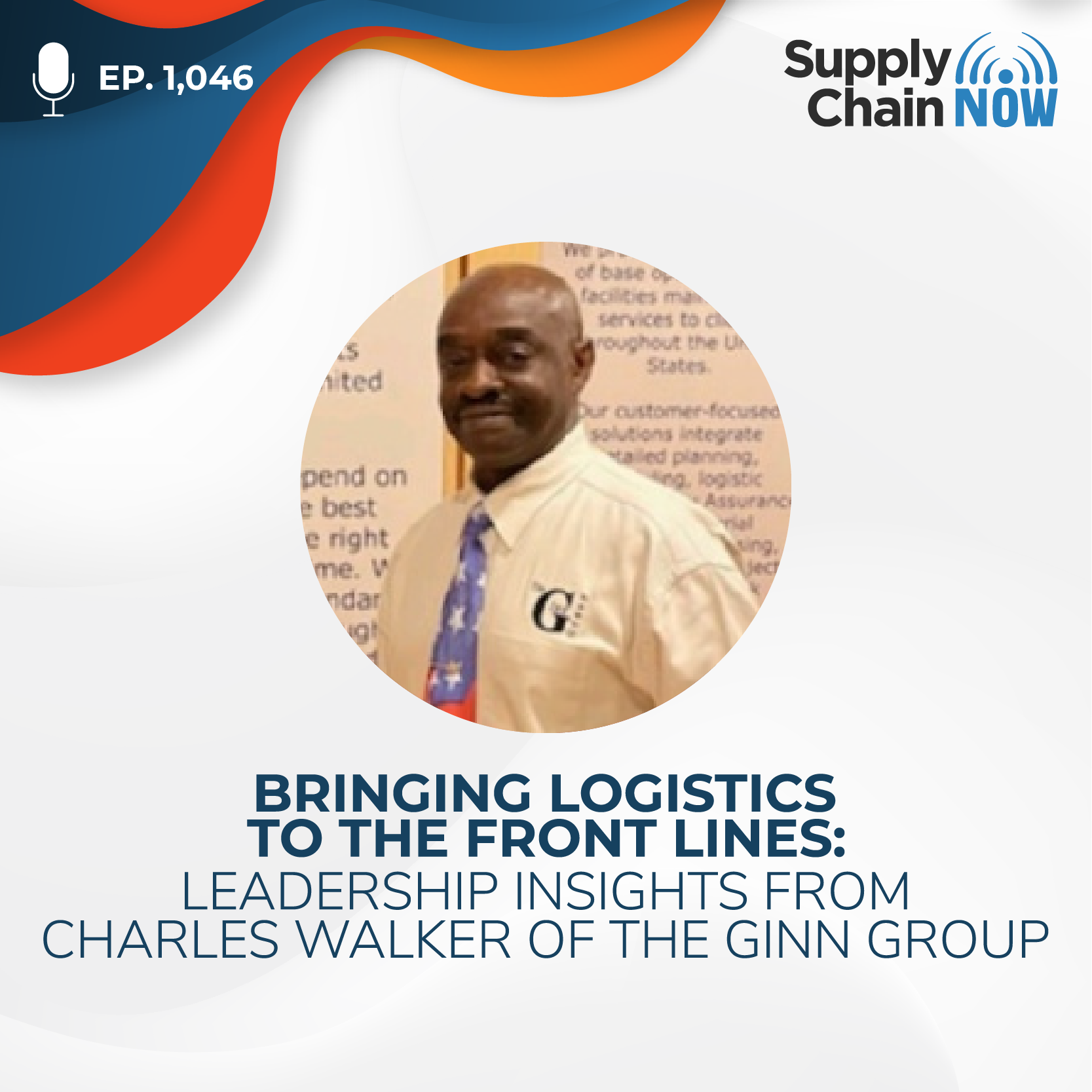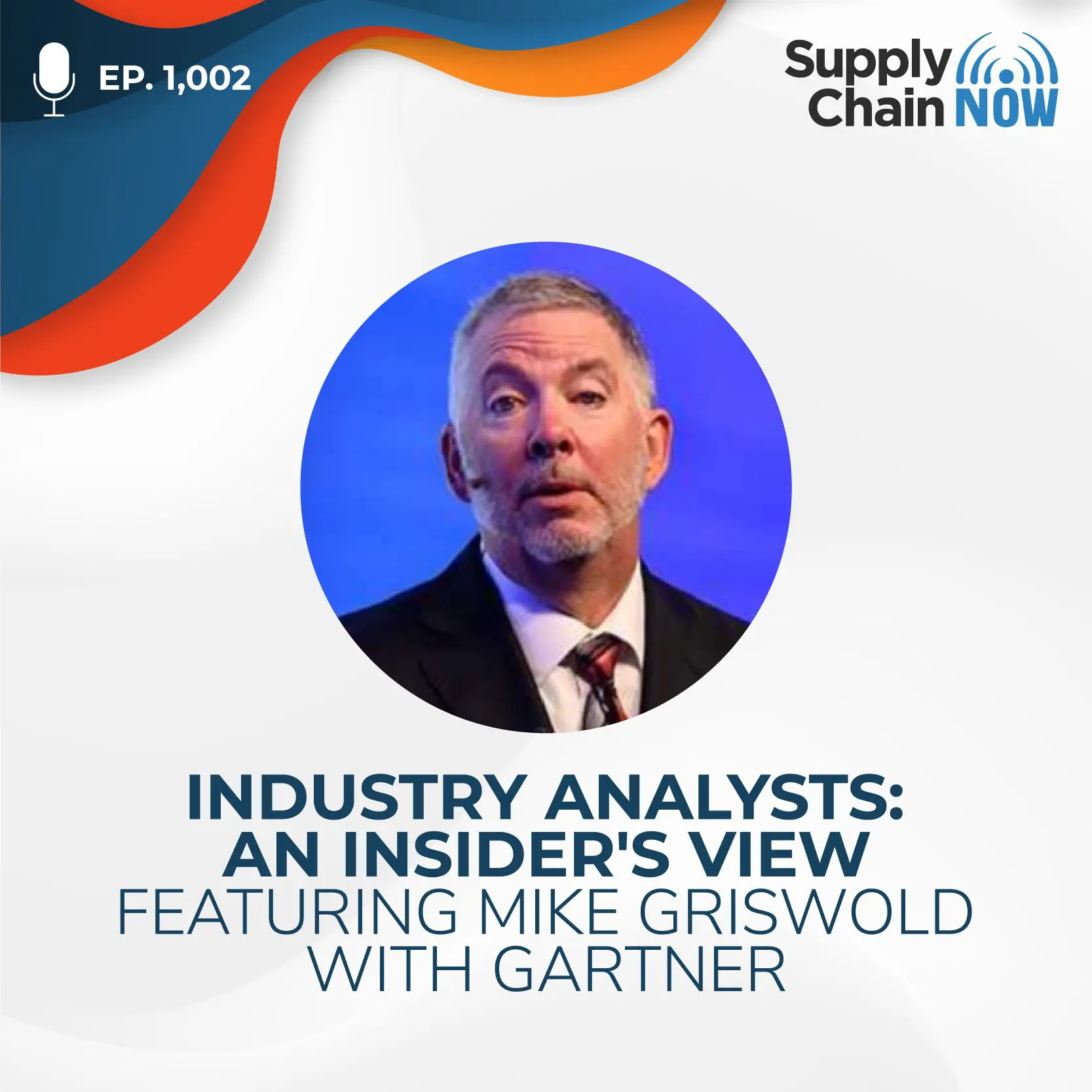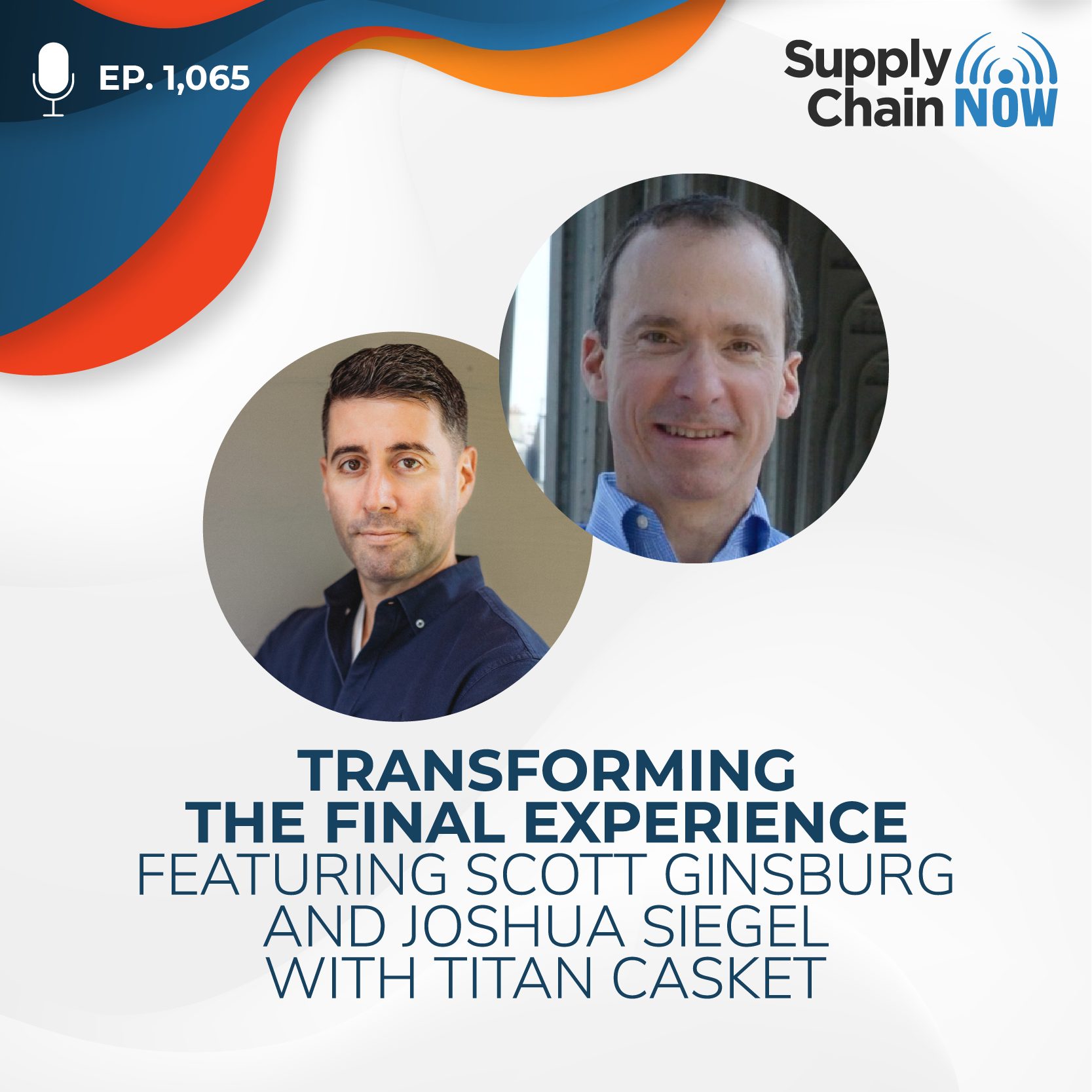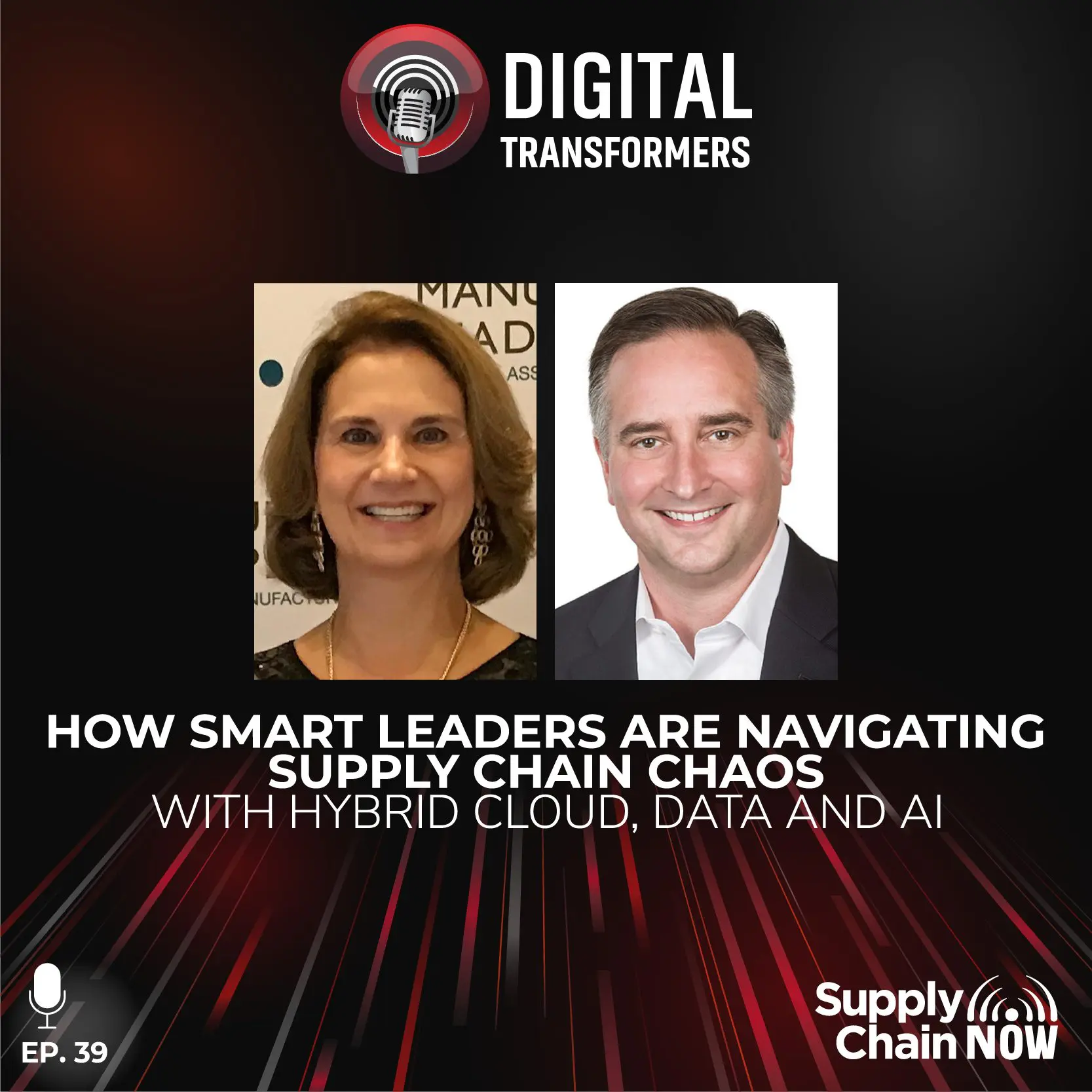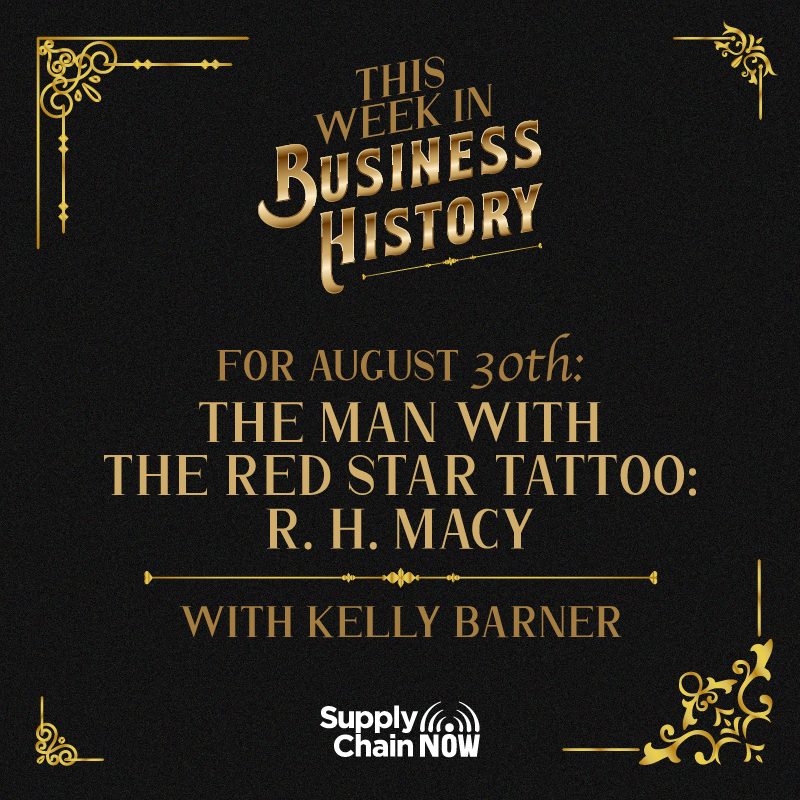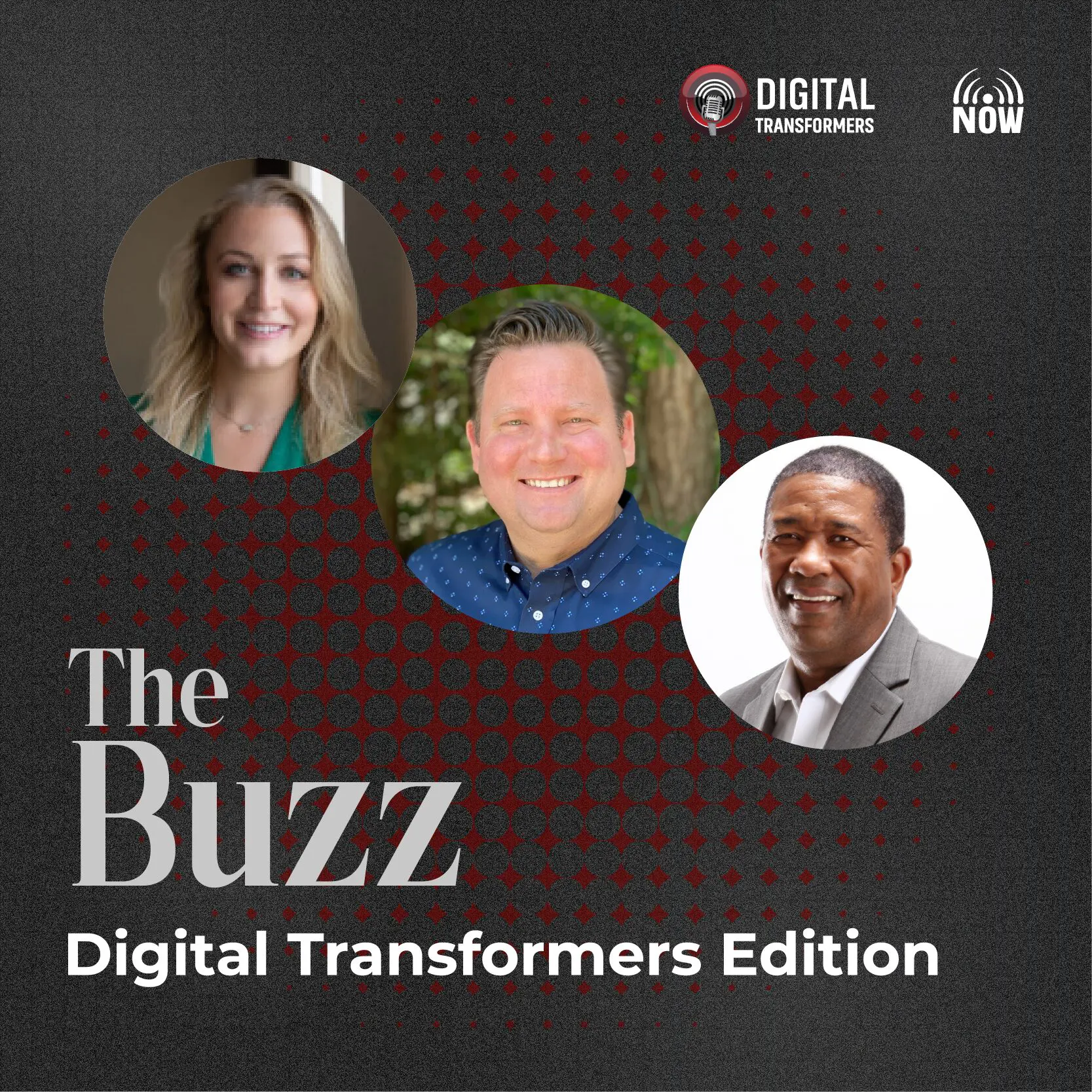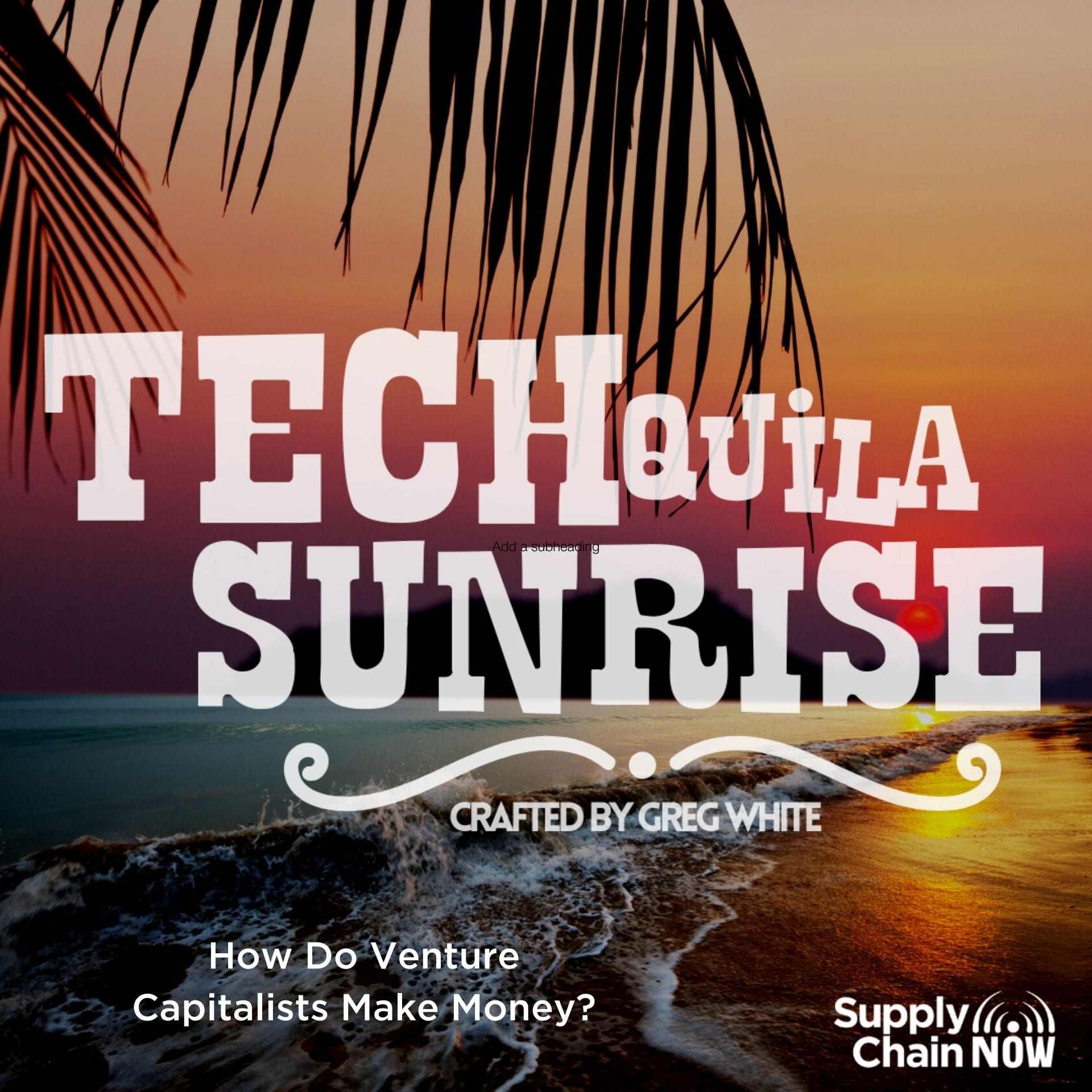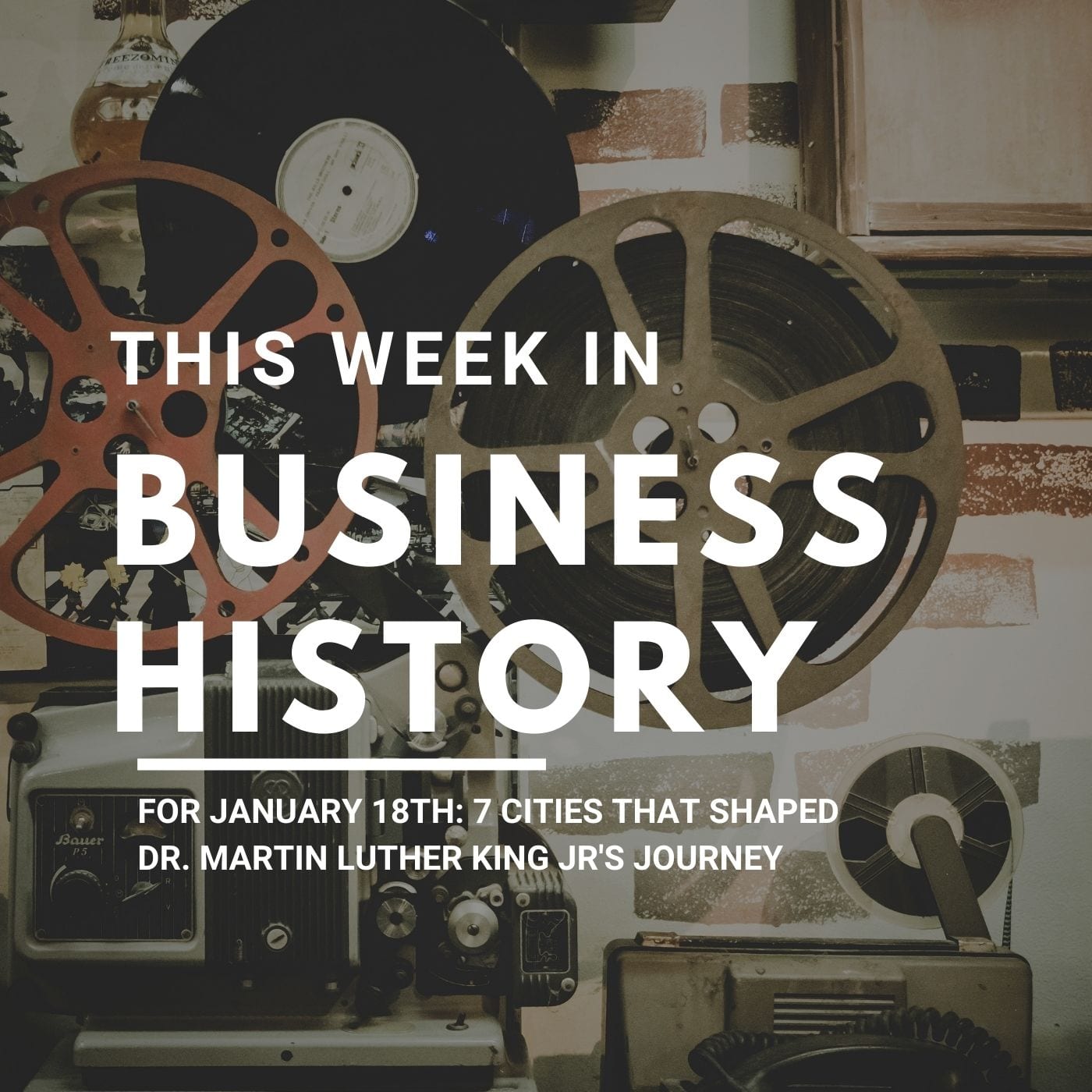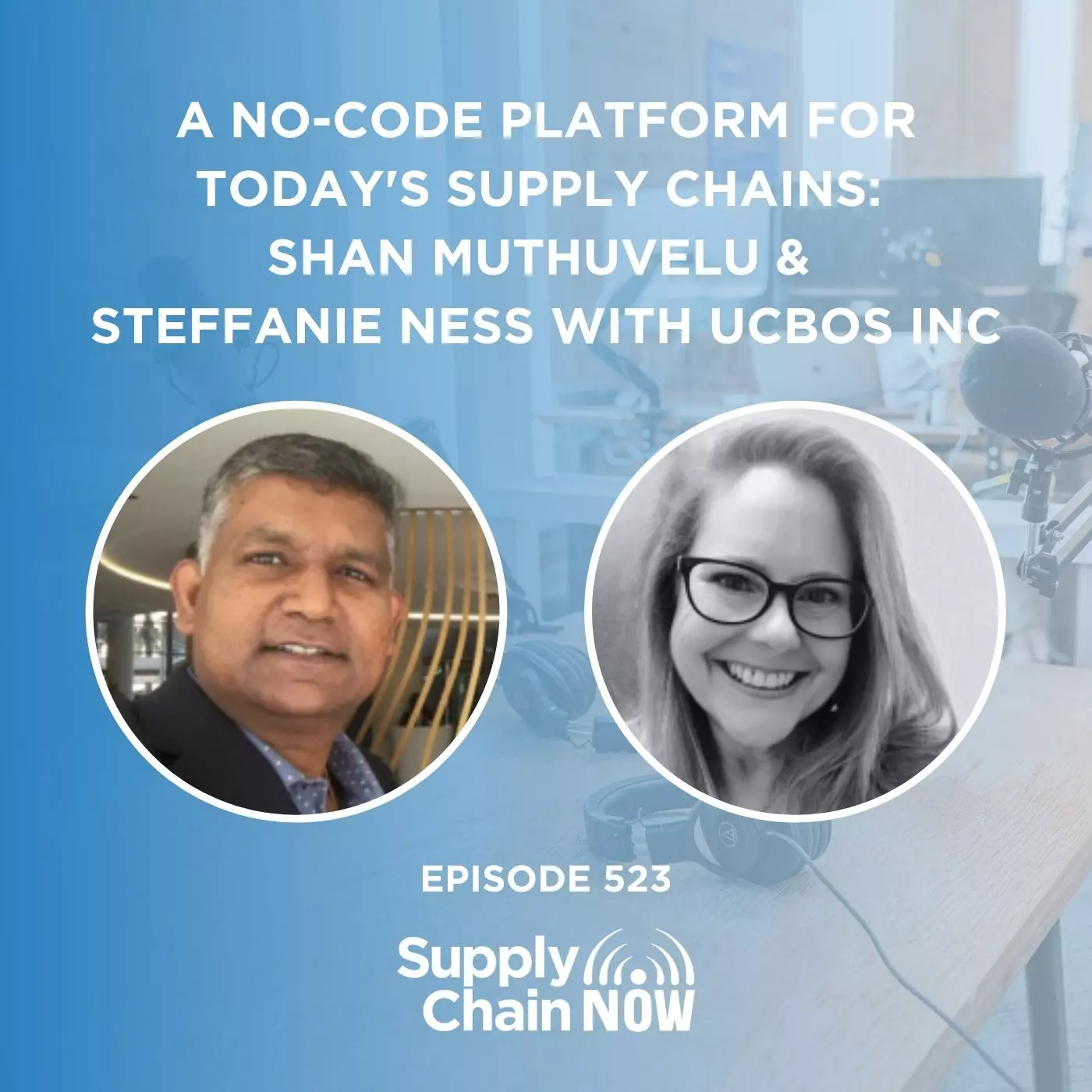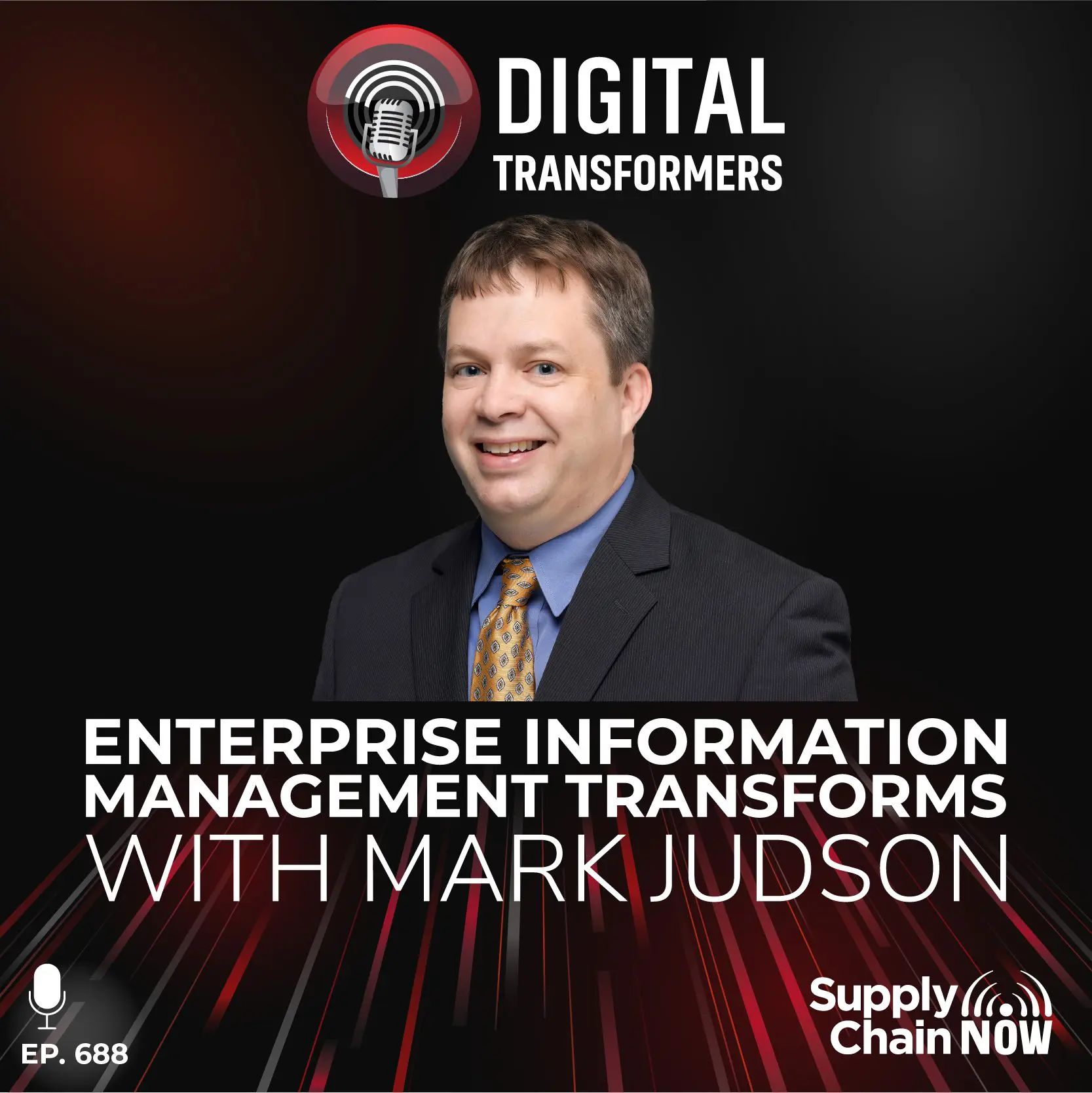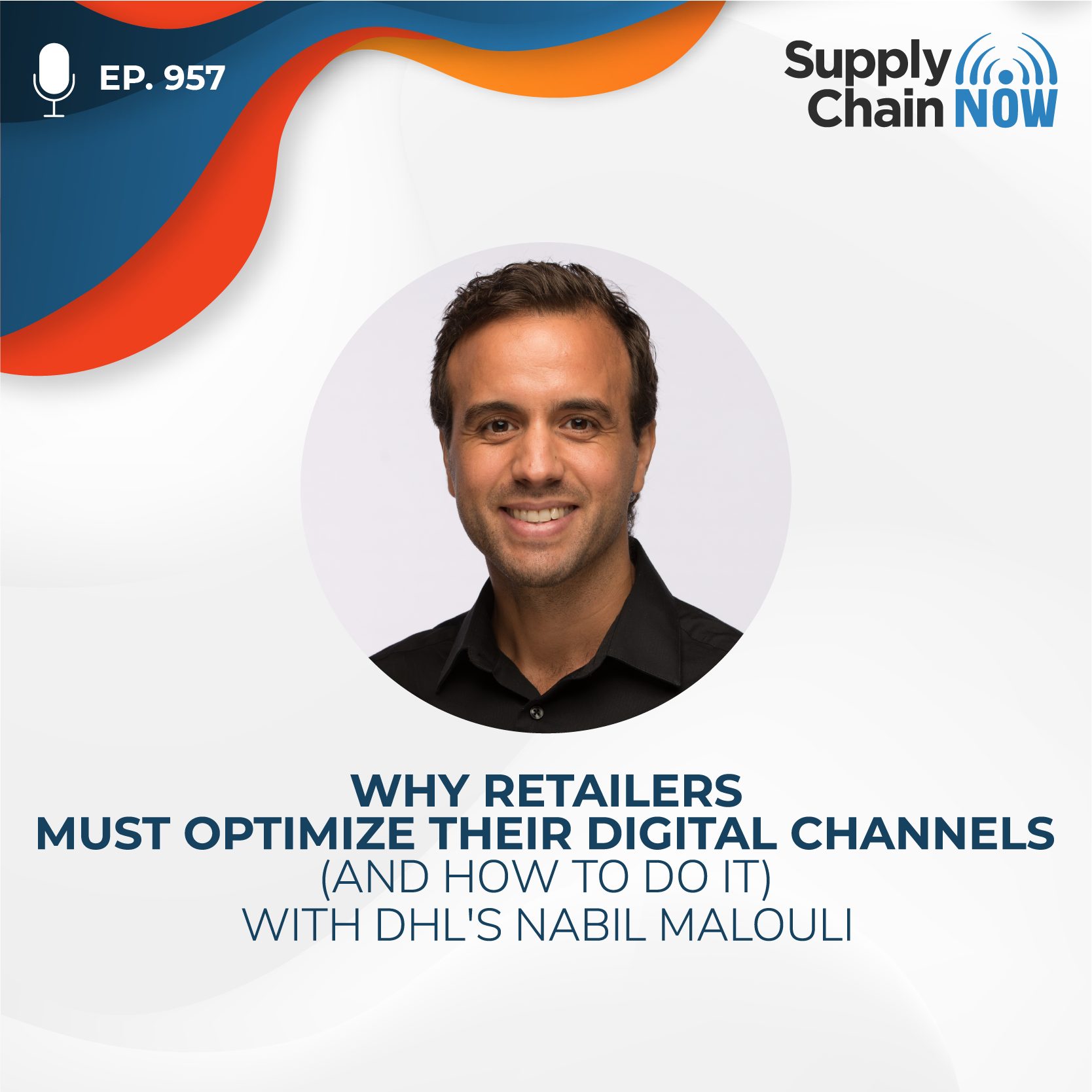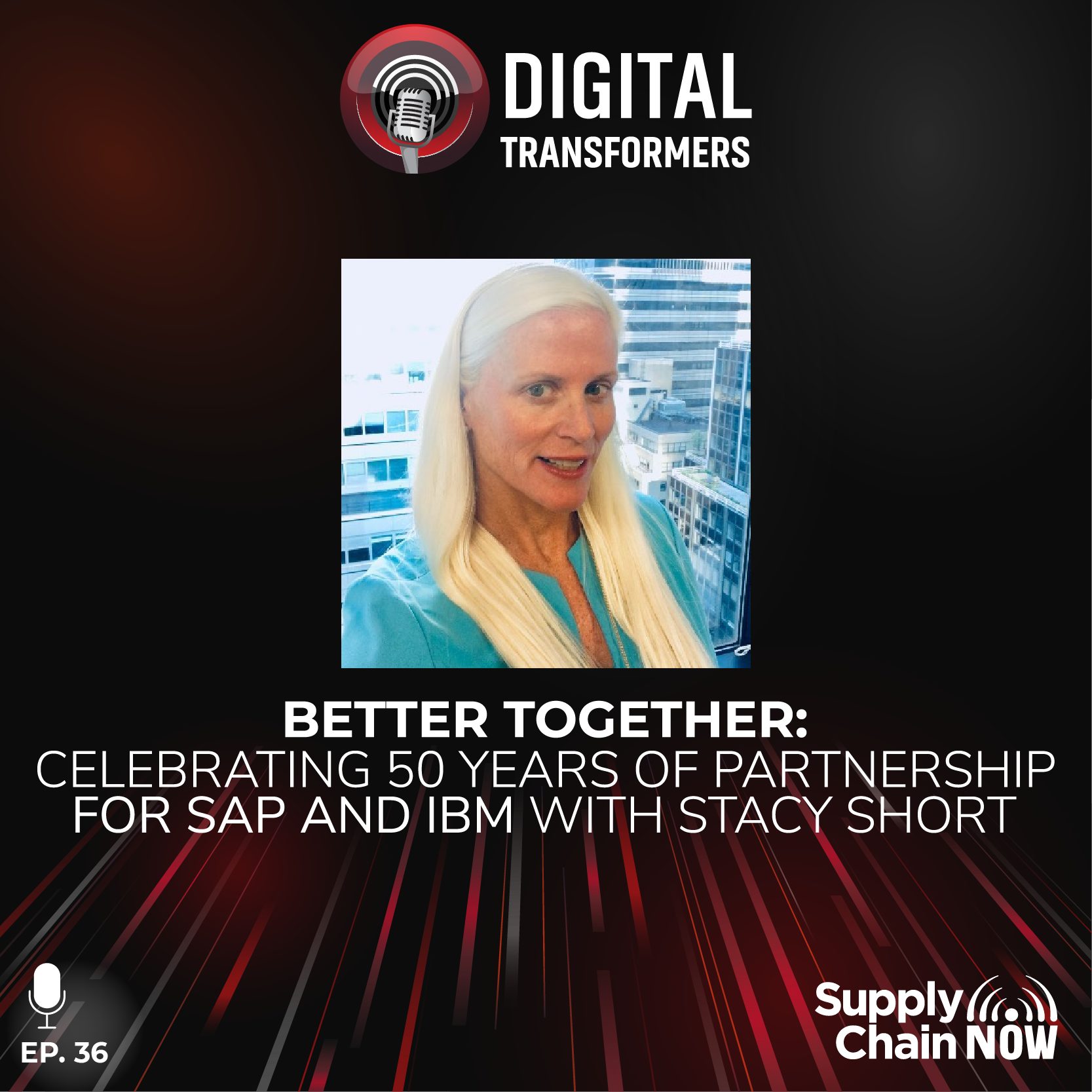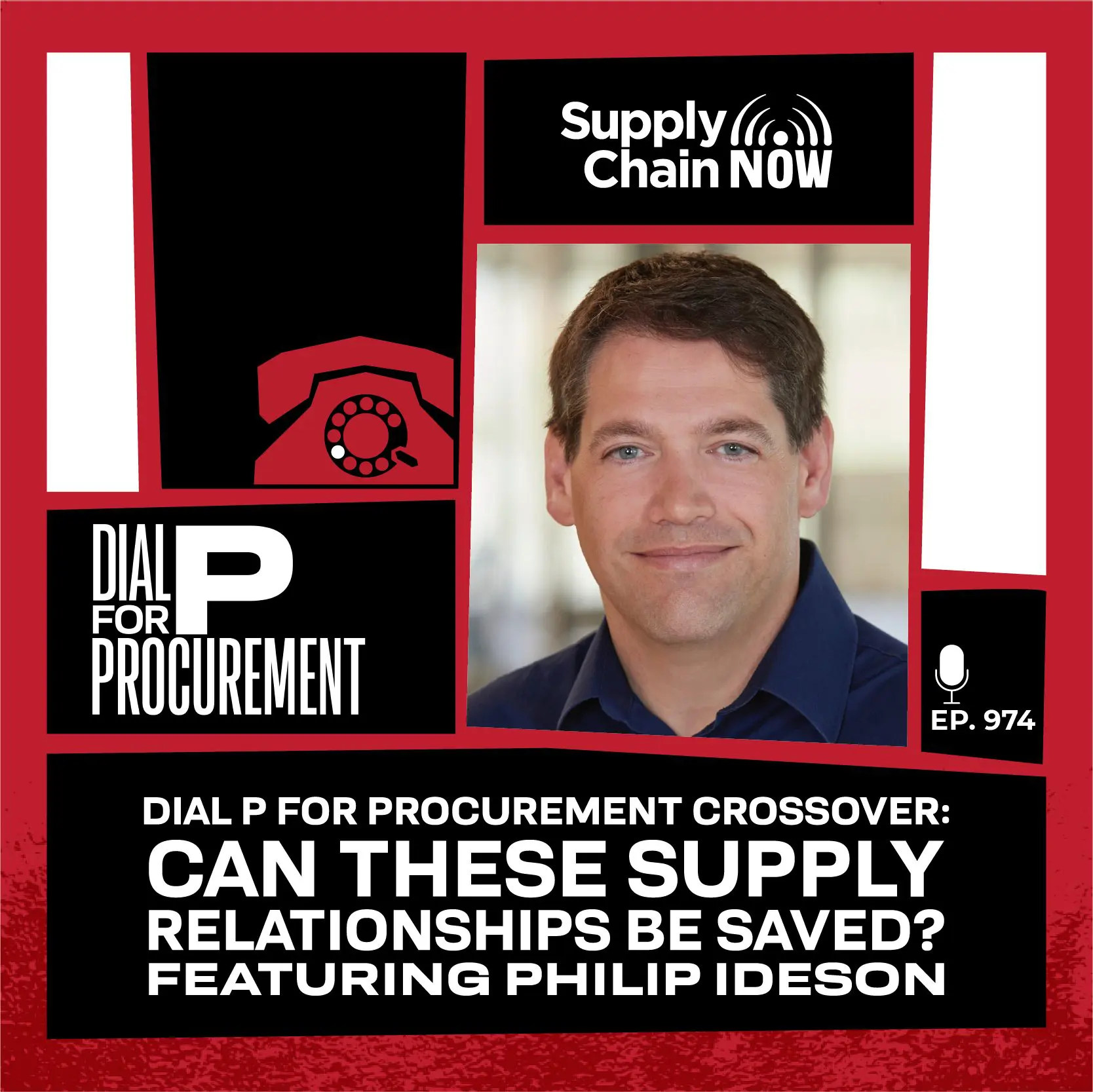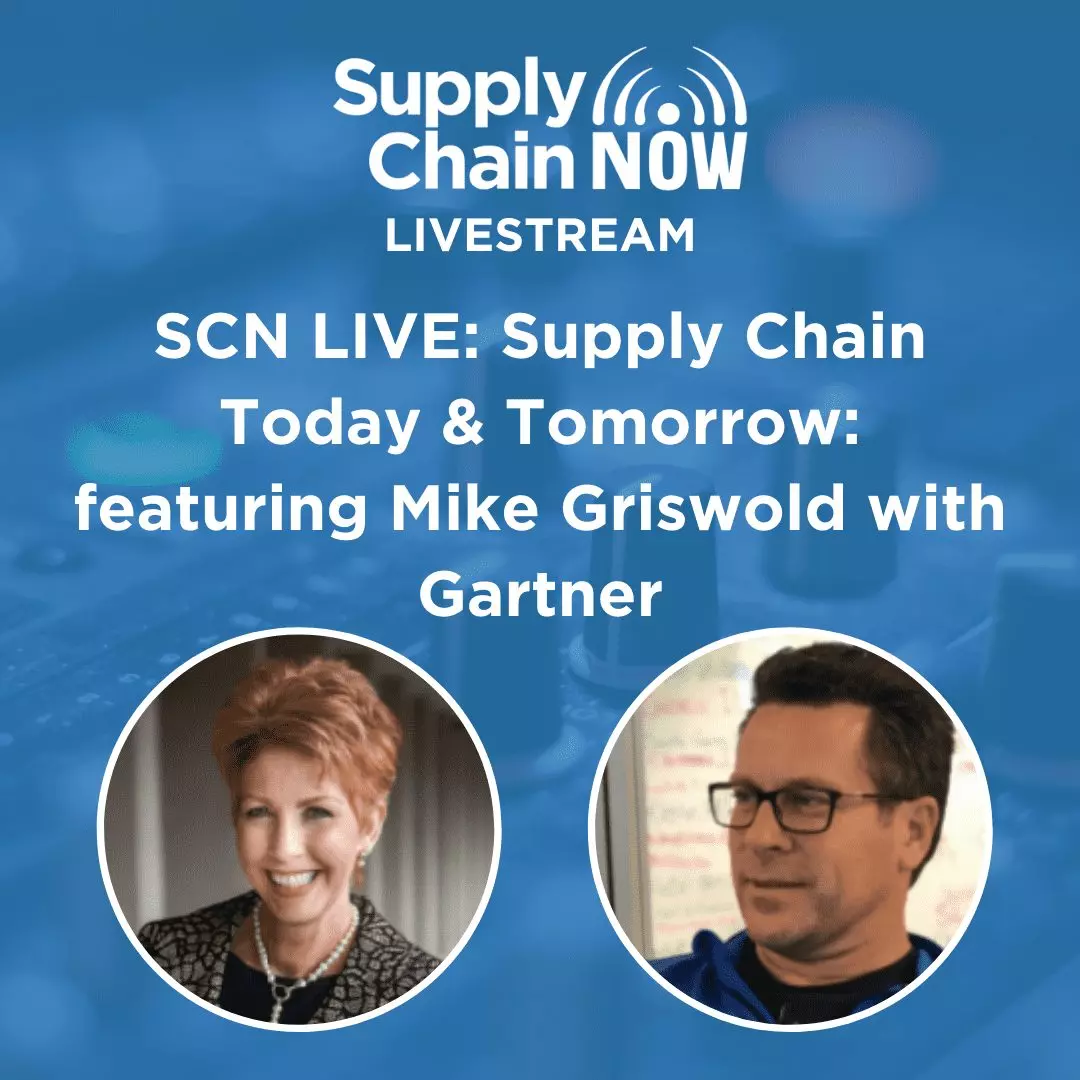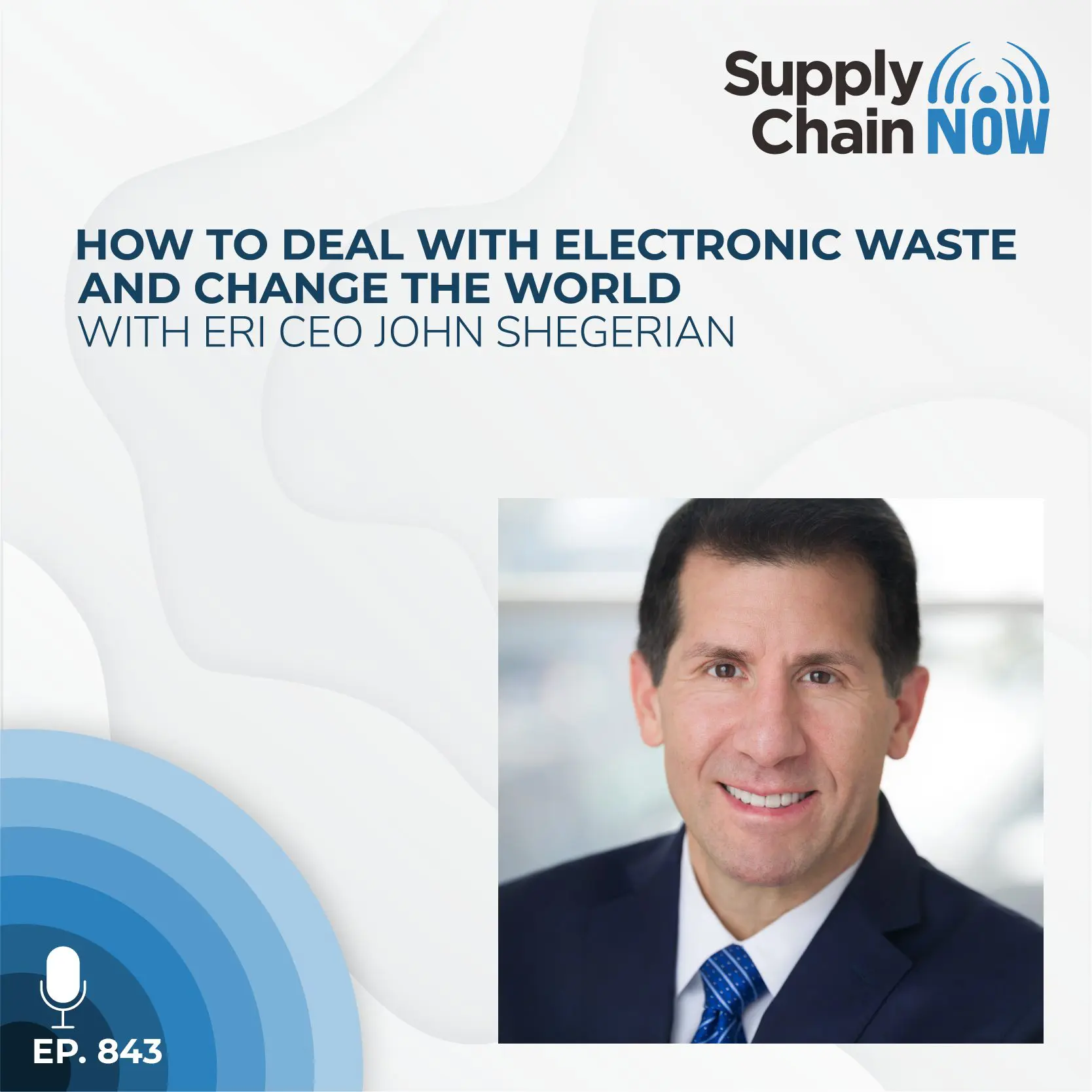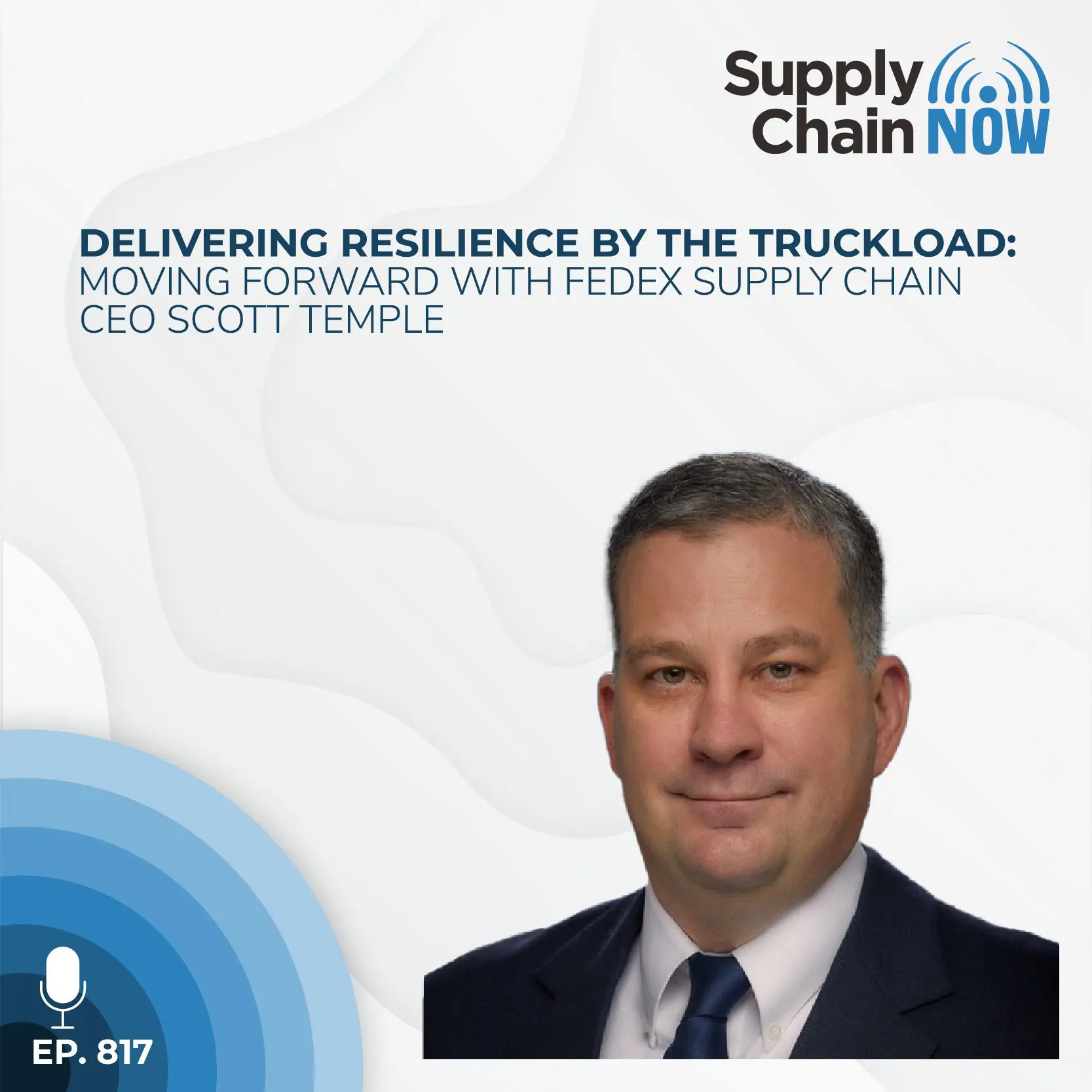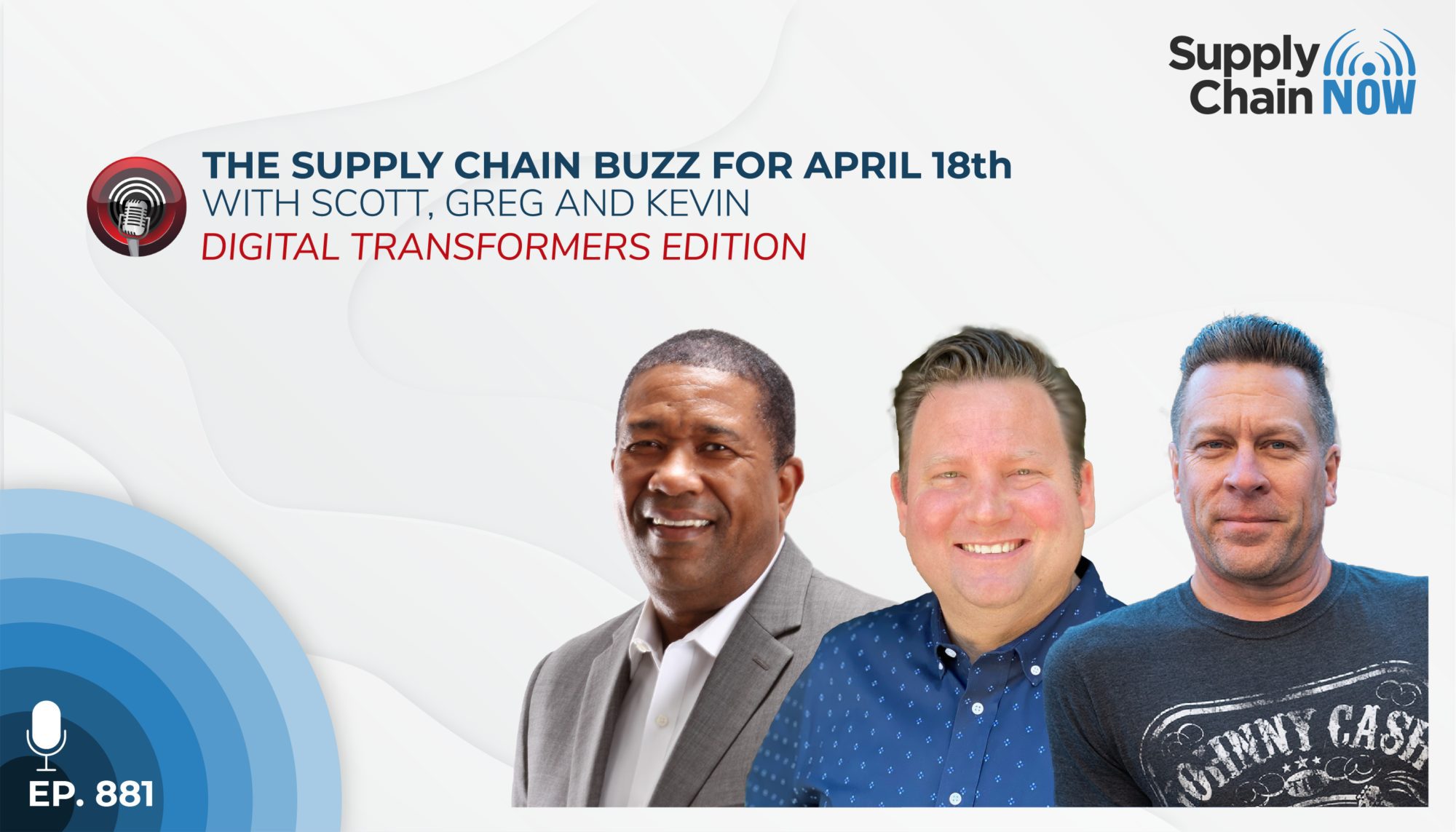
Technology doesn't always give you the answer, right? Do not depend on technology to be right with the answer all the time. But even when it can't give you the answer, it can give you the viable options so that the human can make the correct decision. You can't be afraid of technology and you can't be afraid of what technology can't do.
-Kevin L Jackson, Host, Digital Transformers
Episode Summary
It’s the Digital Transformers takeover over the Supply Chain Buzz, and your favorite co-hosts Scott, Kevin and Greg are tackling the pressing issues of supply chain technology. Get the skinny on everything from the need to up-skill workers to the importance of cross-functional teams and the persistence of cost-saving tendencies. And as a bonus, find out from Kevin what the tale of the bedazzled ship can teach you about collaboration moving forward.
Episode Transcript
Intro/Outro (00:00:03):
Welcome to supply chain. Now the voice of global supply chain supply chain now focuses on the best in the business for our worldwide audience, the people, the technologies, the best practices, and today’s critical issues. The challenges and introduc Stay tuned to hear from those making global business happen right here on supply chain now.
Scott Luton (00:00:30):
Hey, good morning, Scott Luton, Greg White, and Kevin L. Jackson with you here on supply chain. Now, welcome to today’s live stream, Greg. Kevin, how we doing?
Greg White (00:00:40):
Dandy?
Kevin L. Jackson (00:00:41):
Yeah. Happy, happy Monday. Yeah. Except it was Sunday. Yesterday had all the sun, it was beautiful. Warm. And today it’s Monday. So a rainy and Dr. I guess that’s how it’s supposed to be. <laugh>
Scott Luton (00:00:55):
<laugh>, you know, are there rules to whether Greg, are there any rules we’re unaware of?
Greg White (00:01:01):
Well, I think the rule is, uh, don’t rain during the playoff of a PGA tournament. Cause somehow they may sneak that in. So, uh, but yeah, I think Monday, if, I mean, if you were gonna have a dreary day, doesn’t it seem logical, you know, which it’s not at all by the way, isn’t fitting that it’s Monday.
Scott Luton (00:01:24):
Yes it is.
Greg White (00:01:26):
Hey, Monday, Monday, just can’t trust that
Scott Luton (00:01:28):
Day, Monday, Monday. Hey, you know what Bad weather,
Kevin L. Jackson (00:01:33):
What is that? I never heard that
Scott Luton (00:01:37):
Song’s
Kevin L. Jackson (00:01:41):
Than,
Greg White (00:01:42):
Yeah, that’s right.
Scott Luton (00:01:45):
So, so that we avoid singing anymore. Cause that is not, at least me singing is not in demand. I can assure you. Um, let’s talk about today’s show because bad weather is not gonna prevent us from knocking, uh, uh, working away through some of the leading issues and stories across alls global business. It’s a supply chain buzz. And today Greg and Kevin. Yes, of course. It’s the monthly digital transformers version, Greg of the buzz. Yes. And Kevin of course is with us here today, ensuring that we do have a transformational tomorrow. So Greg, before we, uh, before we see what’s on Kevin’s mind here in, in a few you minutes, Greg, we love having him, uh, every third, Monday here, uh, for the digital transformers version, right?
Greg White (00:02:30):
Yeah. It’s awesome. Let’s get digital. Um, I have to tell you, this was a pretty ironic weekend. So I spent, uh, spent time, um, with some guys at the golf tournament, we were walking around, um, Harbortown golf links. Yeah. One of them, uh, had never used the Ticketmaster app. Didn’t have email on his phone and it wasn’t like he retired like 25 years ago. I mean, he just had never done that. So wow. In a way I kind of admired that, uh, right.
Kevin L. Jackson (00:03:03):
<laugh> you said his life
Greg White (00:03:06):
Was, he didn’t care what he didn’t care, what was being said on Twitter. Um, even about the tournament at the time we were watching it. So from that, right, let’s move to what we’re gonna do about, you know, know digital transformation and what that means for the current working generations and the, and the incoming, well, some already here.
Scott Luton (00:03:26):
Excellent point, Greg. And you know, you’ve kind of you’ve, you’ve uh, touched on a couple things that we’re gonna be talking about here today, but Kevin, if you had to give a, a, like a seven words, sneak peek of what’s gonna be the focus of the show today, what, what would you say, Kevin?
Kevin L. Jackson (00:03:41):
So, um, <laugh> for today preparing for tomorrow, how many words,
Greg White (00:03:49):
Hey, that’s an economy of words Even counting. So that’s only six.
Scott Luton (00:03:54):
So man,
Greg White (00:03:56):
Great economy of words. You are ready for the digital future, my friend.
Kevin L. Jackson (00:03:59):
Wow. You very much sure.
Scott Luton (00:04:02):
<laugh> well, Kevin, we got a bunch of good stuff to get with you today. We’re gonna, we’re gonna share a couple programming notes and then we’re gonna say hello to some folks, but uh, kidding aside, Kevin, um, you know how we’re equipping our digital workforce with the skills they need and we all need is leaders to drive and power digital transformation, which is clearly needed. As we move more firmly into the post pandemic eras, how businesses are gonna be able to serve customers where they are. Right?
Kevin L. Jackson (00:04:28):
Yeah. And I think the problem is that many businesses are not doing that. Um, they are, you know, they’re, they’re not really taking the steps needed to be successful. There’s a lot of lip service. Yes. We need to do digital. Uh, yes, we need to do better. We need to, you know, hire younger people. We need to change our processes, blah blah. But what, how much revenue’s coming in tomorrow. <laugh> right. You know, um, they can’t get away from leveraging the old process to get tomorrow’s dollar in to take some of that dollar to create the new process. They need to be relevant in the near future. It’s like, it’s like, uh, they, they didn’t learn the lessons of COVID and they’re just trying to get back to where they were pre COVID. And, and that’s a, really a, a look in the rear view mirror <laugh>
Scott Luton (00:05:27):
Well said,
Greg White (00:05:28):
Well, I mean, this is, this is the same generations of leaders, generation of leaders who have been shocked by the exit of an entire generation over the last 20 years. Yeah. Right. For their, you know, uh, and this generational change in workforce that we’re going through. H how can you get caught on the back foot of, of a transition out of the, one of the largest generations in the history of mankind? And if you can get caught off, off by that and COVID, uh, you better get your act together. Yeah.
Scott Luton (00:06:03):
Agreed, agreed. Speaking of getting our act together, so we’re gonna, we’re gonna flip flop bit. We’re gonna say low to some folks. Cause we already got, uh, a handful of folks already, uh, tuned in. We’re gonna say low, then we’re gonna make a, just a couple of quick announcements and then we’re gonna get into the meet of today’s live stream, which you’re talking on along these topics that Greg and Kevin both are speaking to. But for starters, Josh, Goody’s back with us from overcast, but not rainy Seattle, Greg and Kevin. Well,
Greg White (00:06:30):
We got all the rain here, Josh, so you’re welcome. Or thank you. Whichever is in order.
Scott Luton (00:06:36):
That’s right. Not
Kevin L. Jackson (00:06:37):
Rain. That’s odd. It’s
Scott Luton (00:06:40):
Odd. Yeah.
Speaker 5 (00:06:40):
<laugh>
Scott Luton (00:06:41):
An outlier already. Uh, sum is tuned in here today via, uh, YouTube. Great to see you Sumi, look forward to hearing your, uh, take on some of the stories we’re gonna be walking through. Dude. Chrome’s is here today. Corey comer, uh, via LinkedIn. Great to see ya. Uh, Corey, as always,
Greg White (00:06:59):
You have to explain that to me at some point. Why it’s dude Cromer
Scott Luton (00:07:02):
We’ll we’ll lucky. Remember
Kevin L. Jackson (00:07:05):
Down under, go ahead.
Scott Luton (00:07:07):
<laugh> Right. I think I detected a bit of a Australian accent attempt there. Kevin, my ears toing me though. I
Kevin L. Jackson (00:07:16):
Failed.
Scott Luton (00:07:19):
Hey, I get it. I’m like the Michael Scott, whenever I try to, uh, do Ima uh, impressions and impersonation. So I avoid it like the plague. Um, now this is Mary Kate saliva. Uh, Mary Kate of course is our new host. Uh, she’s an army veteran. She’s a leadership dynamo. She works with the PMI team. She’s so many different things, but she’s also our new host of veteran voices and she’s killing it. Just like we knew she would. Uh, she’s a tireless, even though she’s a veteran, she’s a tireless veteran’s advocate. That’s that is always lifting others up. So, um, and thank you, Mary Kate, you may be the only person in the entire world that enjoys, uh, when I sing anything. Uh, so maybe we’ll get back to that at some point, Tom. It great to have you here today.
Greg White (00:08:01):
She’s a new kid, so she’s gotta, you know, kiss up <laugh> so, but Hey, by the way, if you haven’t seen it, veteran voices is another one of our shows that got a, a facelift in terms of identity and it looks fantastic. Agreed. So, and, and some great interviews, man. She has access to some incredible veterans.
Kevin L. Jackson (00:08:21):
Okay. She really, uh, pumped up that, that previous host
Speaker 5 (00:08:25):
<laugh>
Scott Luton (00:08:28):
Thank you, Kevin man. Oh my well, very nice. Very nice. Keep us on our toes. Right. So Jean, this
Greg White (00:08:37):
Pick on the,
Scott Luton (00:08:41):
Um, Jean pledger has tuned in as well. Our dear friend, Jean. Yeah. Gene’s been on supply chain is boring and he’s, he’s on a lot of our live streams. Great to have you here, gene, it looks like he’s on the road in Nashville. Uh, I believe so. Gene let us know. Hey,
Greg White (00:08:54):
I, what people in the know call it NBE. <laugh>
Scott Luton (00:08:57):
Right. Let us know if you’ve had some of that Hatty bees or princess. I I’ve had Hatty bees. Hadn’t had princess hot chicken Greg
Greg White (00:09:05):
Or a Roberts fried baloney sandwich. Ooh,
Scott Luton (00:09:07):
That’s right. That is right. Uh, uh, satin high
Kevin L. Jackson (00:09:11):
Cuisine,
Scott Luton (00:09:13):
High high cuisine. That’s
Greg White (00:09:15):
Country music capital Kevin
Scott Luton (00:09:18):
Saun is, uh, tuned in via LinkedIn. Great to have you here, uh, looking forward to your perspective, uh, Corey says Greg white combine the big Lebowski and Scott Luton’s mispronunciation of my last name and you’ve got Doro. Oh,
Greg White (00:09:33):
Got it. Okay. So it’s a joke. Yes. Thank you, Corey. That was an easy and clear cut explanation.
Scott Luton (00:09:40):
<laugh> I think all that took place.
Greg White (00:09:42):
Cory Comer’s marketing genius. He can turn any, any long story into a message easily consumed. So,
Scott Luton (00:09:49):
And I think all that took place, uh, on a livestream. So we’ll see, but Corey, great to have you here. And so me, uh, is tuned in, uh, from India via YouTube. So great to have you here with us EK. Okay. So Kevin and Greg let’s, let’s jump into a couple of quick announcements, really quick folks. You gotta be part of the 20, 22 supply chain and procurement awards. I think the registration count, Kevin and Greg, I think we’re up past 1100, 1200 folks that are all team it’s it’s and we still got a month to go a month today to go, uh, not all Greg, right?
Greg White (00:10:22):
It’s a, uh, we may need to check bandwidth <laugh>
Scott Luton (00:10:25):
Seriously.
Greg White (00:10:26):
Right. I mean, if there seriously, I mean, if there are limitations to our bandwidth, we may have to contact our service
Scott Luton (00:10:34):
Provider. Well, you know,
Kevin L. Jackson (00:10:35):
Absolutely.
Greg White (00:10:36):
Which could take a month <laugh>
Scott Luton (00:10:39):
Well, uh, I figure we’d just tap into Kevin L Jackson’s, um, massive studio broadcast global broadcast studios, and we’ll be all good. It’s all good, man. Um, okay. Right.
Kevin L. Jackson (00:10:50):
But, but, but this is really impressive, right. Um, this is, uh, over the past, uh, what 30 days has this been? An explosion of registration?
Greg White (00:11:02):
Not even, wow. Yeah. I think it’s just a couple of weeks right. Of registration, man. Yeah.
Scott Luton (00:11:09):
Not even,
Greg White (00:11:09):
Well, I mean good because I mean, these are companies worthy of knowing there’s a lot to be learned from every nominee and certainly from the winners when they’re determined. So, um,
Kevin L. Jackson (00:11:20):
Maybe it really is, maybe it really is.
Greg White (00:11:23):
Yeah. I’m looking forward to it myself. I’m looking forward to it. Do I need to bring it a UX?
Scott Luton (00:11:29):
One of those t-shirt
Greg White (00:11:30):
T-shirt
Kevin L. Jackson (00:11:33):
Supply chain now. I mean,
Scott Luton (00:11:38):
It might
Greg White (00:11:38):
Be, it’s definitely cool to be supplying now. <laugh>
Scott Luton (00:11:42):
We, you know, the cool thing is not only do we get a chance to celebrate the best of the best that are out there making happen across the globe. But while we do that, we are, um, bringing resources and visibility to the awesome team, the nonprofit team over at hope for justice, which is on a mission to eradicate right, uh, modern day slavery and human trafficking. So folks, um, nominations are over, they’re said and done we’re in the hands of our judges now are executive judges, but they’re still time to register. And of course donate to you hope for justice. So you can learn more at supply chain, procurement awards.com really quick. Uh, the leveraging logistics logistics for Ukraine. This is a weekly session. Um, these are working sessions every Wednesday at 3:00 PM. The latest ones coming up in just a couple days. Folks, these efforts have, have been able to power several containers of aid, targeted aid to vetted needs and Ukraine, Poland, and elsewhere in the region, folks that are in need.
Scott Luton (00:12:43):
So whether you wanna come with donations in hand that the ability to move stuff, the, be the ability to donate stuff, the ability to lead stuff. Or if you wanna just show up and soak in the conversation, kind of be a, a wallflower to kind of get a sense of what it’s about. That’s perfectly fine, but we’d love to have you there 3:00 PM. This Wednesday’s next session. We’ve got the link into comments. If we could drop that there, uh, May 10th, Greg, Greg and I is gonna be on a webinar with our friends at six river systems. Greg, are we talking about how to solve three common peak season challenges, right?
Greg White (00:13:14):
Yeah. And it, and the timing is good. Uh, because if you have the long lead times that we all know everyone has these days for imports it now is the time to get them on the virtual road. That’s right. Right. Um, so yeah, tune in for this and learn what virtually everyone face in regards to fulfilling peak demand well
Scott Luton (00:13:37):
Said, uh, and it’s free to join May 10th at 12 noon Eastern time. The link is in the show notes. And then finally, Kevin and Greg, this is from, uh, the stone mountain sunrise service yesterday, right? It was,
Greg White (00:13:51):
That is above the crowd. Yes. That is truly impressive.
Scott Luton (00:13:56):
You are so perceptive and Kevin, I know you’ve been above the clouds earlier in your career. Um, but y’all check this out. It looks like we’re at the beach. Um, but what that is is cloud cover. You know, we got on, on top of the mountain, uh, which is on the west side of the Metro Atlanta area. Um, Sunday morning it was, it was probably about 4:00 AM. Um, and then around five 30 cloud cover, you could see it was rolling over the mountain and it was settling on the other side, the west side of the mountain. And it looks like we’re at the beach, but that is us and the service above the clouds. And it is, it was the, it really, it was a, uh, powerful service powerful message and just a powerful experience in general. So hope everyone had a wonderful Easter Passover, Ramadan, uh, holiday for us, uh, as a family, we celebrated Easter and it was remarkable. Okay. So Kevin and Greg, Kevin, um, we have got memory is tuned in here today. Great to see you from rainy,
Greg White (00:14:51):
Rainy and Jill too. Maybe it’s rainy all over the world
Kevin L. Jackson (00:14:56):
Is this phase
Greg White (00:14:58):
Right? We can get started. Jose is here. <laugh>
Scott Luton (00:15:01):
Hope you got your paddles folks. Uh, Jose is tuned in from Southern, uh, Southern California. Hope you’re, uh, you’re well today, Jose. Great to see you. Uh, helmet is here evening sunshine from the French Riviera. How about that? No,
Greg White (00:15:16):
No. Oh, there we go. That’s where the sun is nice. Pretty much all it’s by the
Scott Luton (00:15:20):
Way, Peter Bole all night and all days with us here today. Great to see you here, Peter, looking forward to your contributions as always great to see everybody. Okay. So Kevin. Yeah. And Greg, uh, y’all ready to get down to business and get going.
Greg White (00:15:36):
Absolutely.
Scott Luton (00:15:37):
All right. So let’s do that. So, uh, where we’re gonna get started, uh, we’re talking supply chain transformation first, as the folks at McKinsey are asking this question, Kevin, does your team have the skills it needs to accelerate its capabilities? So Kevin, tell us more.
Kevin L. Jackson (00:15:55):
So one of the things that all businesses are trying to deal with is digitalization, right? Um, and McKinsey did a survey and he found that 99% of their respondents, 99% sent of all their respondents said that they need more inhouse, digital supply chain talent. Thanks. This was what’s shown on the chart, the showing right now, now, um, this is a tenfold increase from years before they did this survey in 20, right? So it’s this E this means that people are now realizing the importance of digitalization specifically in supply chain. And you look on the right side of this chart. How, how are these leaders going to get this expertise? Right? 55% said, they’re going to reskill their existing labor force. And 52 said, they’re going to hire new talent. All right. Um,
Greg White (00:17:11):
Good luck with that.
Kevin L. Jackson (00:17:12):
Exactly. There’s a huge show out there. You know, there’s
Greg White (00:17:16):
A huge shortage that, that is, uh, that’s cognitive dissonance right there. If they think they’re gonna hire
Kevin L. Jackson (00:17:22):
<laugh>. So it says that they did a, they scored and there’s a overall average score of 40 out of 100 when it comes to knowledge of digital topics. <laugh> now that’s a failing grade in any school, right? Yep.
Scott Luton (00:17:44):
Kevin, I think they,
Greg White (00:17:45):
I can verify that
Kevin L. Jackson (00:17:46):
<laugh>
Scott Luton (00:17:48):
Yeah. I think they got like a 20 point scale in schools these days.
Kevin L. Jackson (00:17:53):
One other thing you talked about was that, you know, there’s this rumor that digital skills favor the young. All right. And, but they also say that the highest command of applied digital analytics topics lay with senior executives and mid-level leaders. All right. So it’s not that generation, I’m not saying you don’t need to hire the young. All right. Because they, they have better technical standing and more educational background for the digital, but the young lack, the broad perspective of value creation that is needed. So they can’t apply the D data science methods and advance technologies to business problems. So that means you have to train your entire workforce, not just, uh, the, the older or, or, or young. And in fact, half of the task today in supply chain are expected to be fully automated by, uh, 20 50 55. So, um, this is, this is happening fast.
Scott Luton (00:19:12):
Excellent. Uh, Kevin there’s Greg, there’s a lot to get through there, but what’s your take here?
Greg White (00:19:17):
I think what’s interesting is when we use the term young, I mean, let’s face it, millennials started turning 40 this year. So, um, I think young is a relative term and we have to recognize that not only are these mature or ready to be mature business people, but also business leaders. And at the same time, we’re brought up with technology and equipped to do that. And I think, uh, to Kevin’s point, I mean, a lot of the statistics point to the fact that while there’s a lot of digital awareness in gen Z and, uh, millennials, gen Y that generation is by far the highest, uh, U utilization of technology. And that, and that is the generation that in large part is in, or moving into senior leader leadership positions in the companies as, as the baby boomers and the silent generation move out of the workforce.
Greg White (00:20:13):
Um, I think that’s, that is gonna create an, a new and powerful dynamic of people like us, Scott and Kevin who ha have the frame of reference of having been brought up with technology, not, not in our hands at every moment, but at, at our access, probably from at least in my case, like fifth grade on. So, um, you know, it’s, it’s, uh, I think it’s a unique business dynamic. We have to embrace it more preemptively than we did the exit of the baby boomer generation and not wait until it’s a crisis, right? If mother, if, if, if, uh, necessity is the mother of invention, then crisis is the mother. Nevermind necessity is necessity is the mother of invention. Let’s just go with that. Well,
Scott Luton (00:21:06):
We ought also go with, uh, everyone needs, you know, Greg, I bet we both. And Kevin, I bet all three of us were, were trained at an early age on the Oregon trail. That was one of the first pieces of technology ever was ever put in my hands. And not only did, if you had entertainment value, you had some supply chain challenges, you had three bullets and he had to go track a bear or Buffalo or whatever. You’re gonna feed, uh, uncle Clem and the whole family with right. Greg, I don’t know if you remember or good trail. Maybe I’m the player.
Greg White (00:21:34):
I was, I was pretty far before that. OK. There was, there was an, there was an on, on apple, not even two E on apple computers, there was an electronic version of Dungeons and dragons, which was the only version I ever cared about.
Scott Luton (00:21:49):
Okay. So Kevin, um, we’re, we’re sharing some video game experiences here, but Kevin what’s say you, and then I’m gonna share a couple quick comments.
Kevin L. Jackson (00:21:57):
First of all, the, um, baby boom was ongoing away. <laugh> okay. We’re not exiting the workforce. Nobody is retiring around here. We’re just working in the different way. <laugh>
Greg White (00:22:11):
Maybe. So we’re
Kevin L. Jackson (00:22:11):
Using technology. So the companies need to leverage this technology in order to access the knowledge, the insight, and an experience of us baby boomers. Right. We’re still here.
Greg White (00:22:25):
That’s right. Oh, you’re baby boomer. I would’ve never guessed no way.
Scott Luton (00:22:28):
No, Kevin, Kevin, Kevin’s an early gen Xer. Come on, Kevin. <laugh> um, right. Really quick. I wanna share a couple comments here. Uh, see Josh going back to the Oregon trail references. I can’t count how many times I died of dysentery. And that was a regular outcome on that video game. Yeah. Um, Peter says, Hey, if I, at 59, if I can learn how to work with SAP sales modules, anyone can, how about that? And then he also adds, he learned how to program in Fortran at university on key cards. And he says, dear Lord key cards, hadn’t been around a little while
Kevin L. Jackson (00:23:06):
Better. All these stack of cards, walking to a competing center, tripping and going all over the floor round God that’s
Greg White (00:23:17):
<laugh>, that’s when data transfer was sneaking in. That’s what we call it. <laugh> um, so if, if he’s good with Fortran he’s, he should be good with SAP. The that’s how far back SAP goes, by the way, two Fortran, the core kernels of SAP are reportedly. Wow. Fortran.
Scott Luton (00:23:36):
And then, and then it’s back to Oregon trail. Cory comer says the show 1885, which is on paramount plus was like Oregon trail come to life. Cory, I gotta check it out. I kind of boycotted it because all we saw while wa finishing whatever, uh, other show we watch on paramount plus was commercial
Greg White (00:23:53):
Yellowstone.
Scott Luton (00:23:54):
Yellowstone. Yes. Was commercial after commercial, after commercial. So I, I, I refused to watch it. Uh, memory says we’re gonna need companies that change their types, performance metrics to match the digitization and technology upgrades taking place. So we’re not measuring irrelevant objectives. Yeah.
Kevin L. Jackson (00:24:12):
Wow. Memory, right on all as always.
Greg White (00:24:15):
Yeah. So that needs to happen anyway. I mean, we still do too much measurement for measurement’s sake, but man, especially now, because now a, you know, the generations we call the incoming generations though, again, some of ’em 40, right. Um, you know, they, they know what should be measured. They have an idea of what a meaningful measurement is. So they’re gonna put a lot of pressure back on management to measure only what’s meaningful, which is so good. Excellent point. Feel like I’ve been shouting into the wilderness wilderness decade.
Scott Luton (00:24:48):
<laugh> Kevin, uh, follow up to Greg’s comments there on, on what memories, uh, the point she’s making here,
Kevin L. Jackson (00:24:53):
We’re gonna, we’re gonna talk in the next about HR. This is where HR is really critical, right. Um, in order to, uh, identify and measure and monitor how you’re going to train and, and, and get people in the digital world where, where you need ’em to
Scott Luton (00:25:14):
Be. Yep. Good point. All right. A couple of the last comments here, Peter said back to those, those programming cards, top tip, always number them <laugh>. So I can only imagine, I can only imagine us. So me is asking about Anaplan. Anaplan is taking a lead. He says in SAAP chain management, we’ll try to circle back on that one. Uh, and finally memory says, set those KPIs. So they’re not rewarding. The wrong achievement achievements is great point.
Greg White (00:25:43):
Amen are simply measuring failures, which is what most of them do. Right.
Scott Luton (00:25:46):
That is right. All,
Kevin L. Jackson (00:25:47):
We are measured to accomplishments as well.
Scott Luton (00:25:50):
Mm that’s right. So we, so we don’t reward the arsonist as Mike Griswold from Gartner has said with us here. Okay. Through that, the next, uh, next up, uh, we got some good news who can’t raise your hand if you can’t get enough. Good news. My hand is certainly raised, uh, our friends at, at extend are sharing that skilling, the future supply chain workforce, get the, get, this is easier than you think. So Kevin, tell us more and then we gotta dive into this now. Yeah,
Kevin L. Jackson (00:26:19):
Yeah. So we just talked about all the hard things. <laugh> about upskilling and adopting digitization, but in reality, this is these, right? So, uh, so upgrading your work scores, one of the first things you really need to do is create cross-functional teams. Cross-functional working teams because the future supply chain requires companies to move away from the siloed functional teams working separately. Uh, so your chief, uh, um, supply chain officer really need to build these teams that work collectively digital fluency, as we’ve just talked about, allows people to build on top of a technological foundation, right? They don’t just work alongside of technology. They really use it to unleash their own human creativity. So you are using humans for what humans are good for, and they can find out and learn working together collaboratively, how to work in new ways. This also in turn broadens the horizon of your employees.
Kevin L. Jackson (00:27:30):
All right. This makes them enjoy their work by you can do things like just simple things like rotating assignments around, among your supply chain, the departs to make sure everybody can understand the big picture. Um, and this is it’s, it’s really important when you think about notation, it’s not to just focus on supply chain. It’s critical to share the knowledge. Um, your supply chain workforce is really critical to your growth. So you need, uh, your management team has to know things like sales and marketing and finance. Okay. And I, so they can have that broader view. And not only that, they can learn from these other departments, but those departments can learn from your supply chain. And once again, it’s critical to work with HR to make this happen. Your, your, your supply chain officers need to prepare, help the HR team prepare the infrastructure, the HR infrastructure, so that you can do proper measurements of accomplishments. Uh, those goal posts toward utilization and really engage, actively engage your, your, um, uh, your people on continuously refreshing their skills.
Scott Luton (00:29:06):
Okay. So Greg, uh, Kevin shared a lot there, but one of the things I think, certainly you gotta look at the, the, the HR team, the organization, the experts there as your partner, especially in this environment where as you, uh, mentioned earlier, it is so tough to get to talent you need at all levels, uh, all hierarchy of skill sets. But Greg, when we talk about skilling, the future supply chain workforce is easier than you think. What are your thoughts?
Greg White (00:29:33):
I think it’s easier than it’s ever been in the past and, and, uh, for good reason. And that is because technology providers have recognized that all those screens and fields and, and adjustments and, and everything that, you know, all the programming or pseudo programming that people, you know, users have needed to know in the past is absolutely unnecessary and counterproductive. And in fact, what technology ought to do more is not just provide the information, but provide the answer, right. I mean, and, and where, where it can, right. And where it doesn’t as Kevin, uh, spoke about where it doesn’t require the critical thinking or the creativity of a human being to prov present at least a potential answer. And I think more and more technologies are doing that today. I know we certain I’ve certainly worked with a lot of every piece of technology I’ve ever built, maybe just because I’m lazy has done as much work for me and, and the users as I could possibly make it do, including producing the answer. And I think that’s a critical part of it because as these we’re calling younger generat, gen, gen Z in there, I mean, happy 40th birthday, all you young youngsters out there <laugh>,
Greg White (00:30:45):
Um,
Greg White (00:30:46):
Uh, for, for, for those generations coming in, they expect the delivery of answers in many, many, uh, in many, many respects from technology. So I think we have to acknowledge that and see that more and more. And the truth is that is what technology should be, is it should provide the stability and the consistency and the lack of emotion and, and the, uh, rapid and effective analysis of data that human beings struggle with and, and present an answer based on that knowledge. Now, human beings are creative enough to know when there is a lack data or when the data is, uh, incomplete or even incorrect. And that’s where the critical thinking comes in to, to work alongside or in lieu of the, the technology. But even today, when that happens, you can capture that
Greg White (00:31:47):
Thes
Scott Luton (00:31:47):
Just a really quick for the listeners that are listening to the replay there. After Greg said, generally happy birth, happy 40th birthday, to all those other generations, Christopher Tanner comments, Hey, only 39 over here. I love All right, Greg. Sorry. Didn’t mean to cut you off as your,
Greg White (00:32:05):
No, that
Greg White (00:32:06):
That’s perfect. Well, yeah,
Kevin L. Jackson (00:32:07):
One thing I’m, I’m gonna, I’m gonna to, uh, put a spin on something that Greg said about technology. So technology doesn’t always give you the answer. Right? Okay. Do not depend on technology to be right with the answer all the time, but even when it can’t give you the answer, it can give you the viable options so that the human can make the correct decision. You can’t be, you can’t be afraid of technology and you can’t be afraid of what technology can’t do. All right. There’s a lot that can provide.
Greg White (00:32:52):
Yeah. Yeah, that’s right. And I think Kevin, to that point, I think, you know, as we augment technology and we take the three options that it gives us and we say, here’s the right answer. And here’s why that creates more learning for the technology. Right. Uh, that’s what artificial intelligence does is it takes the knowledge and parted upon it by a human user. And then it stores that and learns from it. Yeah. So if we say here’s why a is correct and not B and C, then the technology can continue to learn and refine from that. And it effectively becomes an advocate or even right. An ARB for, for you and, and your decision making skills.
Scott Luton (00:33:30):
Yeah. Okay. You know, both of y’all speak to the expectation that these, that the, uh, younger generations are putting out there in industry. That is a wonderful thing. Uh, I know, I know that’s what you’re saying as well. It is gonna move industries faster. They’re gonna have to move faster. They’re gonna have to make the adjustment. And, uh, uh, as Jonathan says here, smash those silos. I love that. Jonathan, that’s such an important thing. Uh, Peter, when you talk about getting talent, Peter says he’s a strong advocate of hiring folks with thinking skills. They don’t need an MBA to be good at a job. You need to be creative and see through a problem, not stare at it. And bewilderment, I love that Peter,
Greg White (00:34:14):
Or, or who was it? Who said don’t fall in love with the problem
Scott Luton (00:34:18):
Bo groove, right? Our friend Bo groove. Yeah. Y’all check
Greg White (00:34:21):
Don’t fall in.
Scott Luton (00:34:22):
That’s right. Uh, check out the effect of syndicate. Bo’s doing some great work over there. Good friend of the, the show here, Richard. Hey Richard, I appreciate this feedback here. He’s new to this channel and the supply chain environment. Uh, he says you’re doing an amazing job, all these interesting topics. Richard, thank you for that feedback. And come on back. And your, your point of view was welcome here anytime. Uh, Jonathan is 32 and he says he misses the nineties. How about that? I missed nineties too with regularity. Okay. Kevin, I want you to weigh in. I want you and Greg way,
Greg White (00:34:54):
I missed the nineties. If you remember the nineties,
Kevin L. Jackson (00:34:57):
Nineties.
Scott Luton (00:34:59):
All right. So Jose says here, we got, we got one more story to get to, and we will in a minute. Um, but Jose says open question, even though we are in a tech era, why still the adoption of tech is an issue for companies and people. Kevin, do you wanna take that first and then I’ll get to Greg?
Kevin L. Jackson (00:35:16):
Yeah. Uh, well, the first thing I I’d like to say is it’s our own fault. Um, well, at the beginning of the technological transition, uh, everyone felt that they were thinking robots and that this technology is going to take away my livelihood. It’s going to take away, uh, the way I work, uh, my living and they always wanted to fight against it. Um, and that was the big problem. And we had that legacy today. Everyone’s still afraid technology’s going to, uh, take my job away. Um, when we should have seen te as a way of, uh, liberating us from the Dreger of, uh, the industrial age. <laugh> exactly amen. That’s exactly preach what it does. So if we can, you know, change that mindset, um, and understand it’s, you know, you need to help technology get better so that you can be used for your humanity <laugh>
Scott Luton (00:36:27):
Mm. Uh, uh, so much goodness there. And as, uh, disciple Greg here is, is testifying as you answer Greg. Uh, what else would add to, uh, hi, Jose’s great opening question about the challenge of, uh, tech adoption.
Greg White (00:36:44):
We’re only humans and we hate change, hate it, right. Avoid it in many cases at any cost. Right? So that, I think that is at, you know, as Kevin said in a much more eloquent way, um, we are our own worst enemy when it comes to that, but that’s why we despise change. We get into a groove that groove becomes part of, kind of who we are and what we do each day that makes it easier to do easier to tolerate. And, and when change comes, I mean, how many times have you said, at least if you’re from the states, it’s the devil, you know, or the devil you don’t know. Right, right. So it, it doesn’t even have to be that the new process or, or the old process is good. Yes. It could be awful, but at least, you know it right.
Greg White (00:37:29):
Well, and that’s something that technology companies need to understand is they need to recognize that for anyone to make a change, they have to recognize that there is greater danger in what they’re doing today. And I don’t mean just, I don’t mean physical danger, but you know, of course, greater risk, let’s say, in what they’re doing today, then risk of going through a change process where anything could happen, including, you know, to Kevin’s point, you could be determined to be unable to change or irrelevant or, or whatever. Right. There’s a lot of secure in doing what you’ve always done
Scott Luton (00:38:02):
Well said. And if we just, in case, if we’re taking votes, I’d rather deal with the devil I know, than the devil. I don’t know, just in case we’re taking
Greg White (00:38:10):
<laugh>,
Scott Luton (00:38:11):
Um,
Greg White (00:38:11):
That’s exactly right. And every single person on the planet would, would take that as well.
Scott Luton (00:38:16):
Excellent point, uh, JFR via LinkedIn, it is talking about cut cost, role cost role, uh, the role of cost in, uh, adoption of tech. And he also says humans as Greg and Kevin are both alluding to, they have fear of cost and they do not look for future results. Some techs need in need courage to be adopted. I love that. Mm-hmm <affirmative> excellent point. That could be one of the comments of the day. One of the biggest t-shirt ISS to. So I love that Richard says some companies want the employees to learn the tech tools by themselves. We’ve all seen that too. Richard, excellent point there, memory, uh, adoption also stems from failure to fully understand the capacity it has to contribute to overall business objectives. That’s right. Where does this new tech platform, uh, fit into the big picture? Uh, that’s a bridge not crossed oftentimes by organization leaders, particularly memory says cost savings and how it makes workers do more of what they do better, uh, than tech.
Scott Luton (00:39:18):
And then finally, two final comments here. Josh goody says I’m 31, man. Josh. Um, yeah, very jealous. He had to explain to a new, a new intern, how awesome it was to have a jog proof walk, man. Tech advance makes it stop rewarding. The arse nest. Oh, Josh that’s gold. And then finally our dear friend, the, the, um, Greg, what’s that? Oh, sorry. The doc holiday of supply chain. Yeah. Fred Tober. That is right. Fred Tober. The doc holiday supply chain says it’s a great day to be in supply chain. Fred. We can’t agree more or appreciate all that. You do talk about engaging, uh, current the now generation and yeah. And additional generations. Fred’s doing great work there. He’s your, okay. Yeah, that’s right. All right. So, uh, uh, so Kevin, there’s a picture we wanna share. Uh, oh yeah. Uh, so yeah, so to, to the production team, if y’all could check your email, we’ll see if we can’t share that picture, uh, Kevin, that you have, uh, that you just sent over. Um, all right. So Kevin, are we good to move to the next article? We got one more big one.
Kevin L. Jackson (00:40:33):
Absolutely.
Scott Luton (00:40:34):
Okay. So this, this, uh, throw final article here, uh, this headline from supply and demand chain executive, this has gotta be music to your ears. Kevin Jackson ears in particular, uh, dig digital transformation, key to overcoming post pandemic challenges. Kevin, tell us more. Right.
Kevin L. Jackson (00:40:55):
So, um, spots and, uh, the man chain executive, they survey right. And 87 of their respondents said that digital transformation was, uh, critical to achieving their business goals, um, in, uh, 2022 and the other two articles, you know, highlighted that as well. But it really, this big article went into the details with respect to, um, supply chain, right, improving quote efficiency, um, uh, the lack of automation and transitioning to fully digital buying experiences. Um, the 59% of the respondents named the need to drive sales and revenue as the top priority. Um, 77% said that they needed to invest in supply chain optimization because of economic uncertainty. Um, and, and, and, uh, research from Accenture showed that while 96% of sales and marketing executives wanted to transform their sales department, only 7% have plans to do that in the next 12 years. <laugh>
Scott Luton (00:42:29):
Wow. 12 years. That’s like an eternity plus some,
Kevin L. Jackson (00:42:34):
1% think they need to change it within the next 35 years. <laugh> wow. Those are the future thinkers. Right, right. But, but, but actually here’s another important, uh, point that, that came out 84% said that sustainability was critical in manufacturing, which really reflect the growing attitudes around environmental, social and governance goals. These are essential for both your short term business goals and your long term success.
Scott Luton (00:43:16):
Okay. So, uh, Greg, uh, and by the way, Kevin, we got that image we we’ll get to after we get yeah. Yeah. We’ll get, Greg’s take here first. So Greg, we’re talking about digital transformation being a critical key to overcoming post pandemic challenges. Uh, and Kevin just shared some stuff there. What’s your take, Greg?
Greg White (00:43:33):
Uh, I was amazed at how few statistics there were a about actually delivering <laugh> on their sales promise and marketing promises, right? I mean, 59% said driving sales and revenue, maybe in there snuck in, there is something good to do with the supply chain to make it, to make that stuff actually get delivered. But in this day and age, this seems remarkably outta touch, frankly. And, um, and in that they should be, uh, sales are not hard to come by these days. They just, aren’t hard to come by. Right. Right. Um, what is hard to come by is the ability to deliver those sales. So, um, I, I couldn’t help when I read this for the first time to kind of go through it. And then Kevin, as you went through those numbers, it just kind of cements it in your mind that even though we think we’ve come a long way in supply chain and in digital transformation in regard to supply chain and even other aspects of the business still right.
Greg White (00:44:32):
Sales and revenue and cost optimization, which is a EU or sorry, and optimization, which is a EU optimization of cost benefit or cost analysis of the supply chain still rule the day, at least in these businesses that were surveyed. So, yeah. Um, you know, there’s a lot for us to get over from, to, to address the impact and the potential of all three of these articles. One of the key things that continues to hit hit the forefront of my mind is we have to cease thinking of supply chain as a cost saving exercise, as merely going through the mode to get the stuff that the sales people get sold to the marketplace to get it to delivered, right. Mm-hmm <affirmative> way too important. And, and now in the forefront of not only every business person’s mind, but your customer’s mind, they know whether you have a good supply chain or not as just like they know whether you have a good sales team or not. And we have to round out our thinking from just sales and revenue and cost minimization in the supply chain to risk balancing in the supply chain and ensuring that we have an eye towards the future, like Kevin was talking about so that we know we can deliver what we sell, because we’re selling a lot of stuff right now that we, that cannot be delivered in every aspect of industry.
Scott Luton (00:45:54):
Excellent point. And, and the headline here, uh, from this piece is kinda like water is wet. Grass is green, the sky is blue. Yes. Digital transformation absolutely is gonna be, uh, paramount to overcoming post pandemic challenges, frankly. It was a bit, it was paramount to getting through the, the, the pandemic challenges. Yeah. Uh, I appreciate what
Greg White (00:46:14):
You, I mean, and you know, Kevin, speaking of shouting into the wilderness, Kevin has been talking about digital transformation for years and it, it has been important even prior to now the only thing that has changed with digital transformation and supply chain, the only thing that has changed is the awareness, the broad based awareness of those to aspects of business that that companies need to focus on,
Scott Luton (00:46:38):
Uh, greed. Okay. So Kevin, uh, we could, you want, Hey, let’s give, uh, Kevin, you get the last thought on this, on, on the, uh, supply and demand chain, executive article before move to a new image, your, your final thought Kevin. So
Kevin L. Jackson (00:46:52):
All three of these articles highlight the, the importance of broad thinking that it’s, it’s important to make sure everyone is in the same 10 under the same 10 in the same room. And everyone understands the, the skill sets of others and the value of, of others. And this includes the robots. <laugh> this includes the technology. You know, people say that, you know, this is, you know, uh, apples and oranges technology and supply chain, two different things. No, there are, there are value in leveraging both to achieve the goals and the KPIs and the ROIs that your organization needs
Scott Luton (00:47:41):
Well said. All right. Um, let’s do this. I wanna share a couple of these quick comments. Dr. Ron is with us once again. So good. Good for you to, uh, be with here with us busy Monday folks, she says with green team activities, as we celebrate earth day all week at GTZ catch up, uh, time on some great supply chain. Now content, Kevin Scott, and Greg in the house with us peeps, man, I can’t stand peeps, but, uh, Dr. Ron, great to have you here as always and appreciate that, but just
Greg White (00:48:11):
So yeah,
Scott Luton (00:48:14):
No, I didn’t
Kevin L. Jackson (00:48:15):
Basket <laugh>
Scott Luton (00:48:18):
Stephanie Stuckey had this great poll that had 10 qu, uh, 10 Gian votes and it was, uh, peeps versus a cat. I am, I am officially with both feet in the cat egg, Marty. I’ve never been a pees fan, but Hey, Dr. Ronda, great to have you here. Looking forward to seeing some of the cool things you’re doing with earth day this week T squared, who holds down the Fort force on YouTube, says as, as soon as a soon to be 45 year old, I’m nostalgic for the nineties. In addition, people need to embrace the Rudy George connection with regard the technology in the workplace. And he says by the, by the way, that is a jet sounds preference. I glad he mentioned that. Cause I missed it. Um, Richard says, Hey, what will happen with small business? They do not have the economic resources to auto, uh, automate their processes. That’s a fair point.
Greg White (00:49:08):
Oh, they do though. I mean, there are more and more of those solutions. Unlike SAP that don’t think take a thousand consulting days or millions of dollars of implementation fees. Right. Start with QuickBooks. Start with QuickBook. It’s called cloud services. Yeah. Cloud services. Yeah. There, there are all kinds of technologies out there. So if that’s an issue you for you, Richard, give me a shout. Yeah.
Kevin L. Jackson (00:49:33):
QuickBook is one, one of the best cloud based services that small businesses can use.
Greg White (00:49:40):
Yeah, no doubt.
Scott Luton (00:49:41):
Excellent point excellent point. Um, outta demo. Uh, great to have you back with us here. She says joining late, but good thing is I can do a playback catch up on what I’ve missed thus far. Good to be here. So great to have you back. And I appreciate your note over the weekend. I really we’ve all enjoyed your perspective here in some recent, uh, live streams. Uh, see Josh says, don’t let a 10 cent part cost you $300,000 worth of production. Don’t let a 10 cent or more cost you friendly partnerships with the suppliers. Well said, Greg, it’s not about cost saving. It’s about saving the money flow to the customer. OK. Uh, and That no way
Greg White (00:50:23):
She’s such a health fanatic, there is no way she would ever,
Scott Luton (00:50:26):
Ever have a peep. Just
Kevin L. Jackson (00:50:29):
<laugh>
Scott Luton (00:50:30):
She’s just, she’s just all right. Jing. So yeah, teas, this <laugh> all right. We’re gonna try to get to a couple more comments here before we wrap today, but really quick, Kevin. Yeah. You sent over, uh, I neat article and Hey folks, sometimes we’re just going with, what was, I know it’s not doctored up, but I think everyone can see this clearly. Kevin, what does this image represent to you?
Kevin L. Jackson (00:50:53):
<laugh> yeah. What does this image represent? So first of all, what is it? Does anybody know what it is? Put it, you can put it in the, in the chat and I I’ll give you a second to put it, uh, put it in the chat. I’ll tell you it’s a bedazzled shift and you’re gonna say, <laugh> walk out <laugh> this is a bedazzled ship from world war II. Okay. And, and you, and you look at it and, and what you see all the different lines on this bedazzled ship. Why do they have all these lines on the bedazzled ship? So they may have heard of Picasso and the cubism move. So cubism is an artistic movement. It’s created by public Picasso and George Barack, uh, which employs geometric shapes in depictions of human and other forms. All right, the geometric touches can be intense to, and it can really overtake the represented form, right? You say, well, how does this, what this conversation has to do with this? So this is what the artist did to protect Naval shipping in world war II.
Kevin L. Jackson (00:52:27):
Huh? All right. This is a type of camouflage. And you think of cop camouflage and you say, well, I thought camouflage is to reduce the visibility of something. You’re not reducing the visibility of this ship. Bob putting all these black and white stripes on it. <laugh> it, it just sticks right out, but right. Mm-hmm <affirmative> how can it be camouflage where they were trying to protect these ships against attack from you boats. And when you’re trying to attack a ship with a torpedo, right? The most important aspect of that is understanding it’s heading and speed <affirmative>. And you’re trying to measure the heading and speed through a Periscope, these different lines and colors, make it almost impossible to compute the heading and speed of a ship. So 75% of the, um, submarines would miss the ship because it was bedazzled. So this is a contribution of artists to the art of war, to completely different things, to completely mind different mindsets that bring value. That’s what you have to think about when you’re talking about technology and any other process, any other business process, you have to, uh, accept the value that other domains can bring to your process, your KPI, your ROI.
Scott Luton (00:54:32):
Wow. Okay.
Kevin L. Jackson (00:54:33):
Points of
Scott Luton (00:54:34):
Humans. We need a whole show dedicated to this. Um, <laugh> that last, that last little image and, and, uh, Kevin, your take there also, if you haven’t checked out Greyhound with Tom Hanks, it is such a fast naing, uh, world war II focus, uh, movie on the Atlantic voyage of all the convoys and, and how, um, uh, the us forces and us Navy battled and their strategies of battling all the German submarines. It, it is really fascinating. Tom, Tom Hanks, of course, is one of the best. Um, Greg respond, if you will really quick to what Kevin is talking about here with the bedazzled ship and, and kind of, uh, the, the bigger picture meaning and thinking behind it.
Greg White (00:55:17):
I mean, I think you have to recognize that there are a lot of valuable points of view, right? There are a lot of valuable inputs into any business. And we’ve alluded to this in this, the discussion is that, you know, we need to have cross pollinization of artists of who in many business are the merchants. And, um, and the product managers, along with the analysts, the supply chain, uh, professionals, the financial people, all of those people who, who were with rigor versus work with art and feeling, and with everyone else who facilitates or integrates with the business process. And it is impossible not to touch every aspect of the business through supply chain. Let me say that again, it is impossible not to touch every aspect of the business. I mean, you literally affect marketing and are affected by marketing, you affect sales and likewise and inverse and, um, logistics, obviously, uh, I think some of the most successful companies that I’ve worked for, they got it.
Greg White (00:56:22):
I worked for what is now O’Reilly automotive. And back in the day when we were just checker shucks, and Cragan for you folks in the Western part of the us <laugh> um, when we met with our vendors to talk about new products, we started putting what we called, then the purchasing agents in the meetings, along with the merchandisers to make sure that we develop logistics constraints and limitations and minimums and maximums that met our goals. And if we didn’t do that, then we, we built in compensation mechanisms for that. So, yep. Um, uh, you know, there, it, it can be done in some cases it’s literally been being done for are three decades. And, um, what I think we have to understand this to this point is a lot more artists and analysts have integrated at the lower tiers of the supply chain, which is what I call retail and distribution than in manufacturing.
Greg White (00:57:19):
And a lot of these inefficiencies that we talk about in supply chain very broadly are really only a major and significant issue for manufacturers. Right. But it still is an issue for even retailers and, and distributors. So, um, I, you know, there, there’s good news in this and what I, I hope people will start to recognize is that instead of trying to project the manufacturing model down to retailers whose, whose supply chain model in many cases is far, far more advanced, right. We should do the invert learn from what retailers have been doing for decades to optimize and risk balance their supply chains at the manufacturing level. Yeah.
Scott Luton (00:58:01):
Well said, you know, uh, when you first Kevin popped that image instead of bedazzle, I thought I thought there was gonna be a, a pun on light Bedazzler, uh, that Roni, uh, sold out the marketplace late and great Rone. Is
Greg White (00:58:12):
That a Rone?
Scott Luton (00:58:14):
I think so. I think so know, we’ll get double checked on that for sure. But y’all check that out. Um, but love that. Um, so really quick, really quick, and we’re gonna make sure folks are not connect with Kevin and Greg right up here again, instant. Um, this has gotta be succinct guys. It’s gotta be succinct. Jonathan says, Hey, what are y’all’s best supply chain management quotes for motivational Monday? So I’m gonna give y’all just a couple minutes, just a minute, cause I’m gonna share one. Uh, and it’s not gonna be what, uh, Shakespeare, but one of our asked livestream participants made the comment that informed people make informed decisions. So, uh, I can’t remember who to attribute that to, but I would just build on that and say work tirelessly to make sure your people are informed. It. Don’t be afraid to pick up the call if there’s any uncertainty, uh, especially with big items, right? Going back to Josh’s point about letting the 10 cent part cost you 300,000 man, pick up the phone and just make sure you’re on the same page. It can’t hurt, but, uh, that’s not a, uh, a poster for motivational Monday. It’s just a thought, but, uh, Kevin, what would be your best supply chain management quote?
Kevin L. Jackson (00:59:24):
I would say, uh, data is not knowledge or insight for that. You need humans <laugh>
Scott Luton (00:59:32):
Oh, nice. I like that, Kevin. And I agree with you, uh, Greg,
Greg White (00:59:37):
Hate to lose more than you love to win. Hating to lose will force will force a strategy and tactics that eliminate any POS possibility for failure and therefore you win,
Scott Luton (00:59:50):
Man. I love that Greg and Kevin, we just need to do like a motivational quote livestream. One day, Peter adds is mind over matter. If you don’t mind it, it doesn’t at her <laugh>
Greg White (01:00:02):
Or if your boss doesn’t mind
Scott Luton (01:00:04):
Love that, Brenda. Hey Brenda, great to have you back, uh, president of kitty Bob’s foods. Uh, she says once again, a great informative program. I’m so happy that I stumbled on finding y’all by following Stephanie Stuckey, who was with us, uh, last week, my week before. Thanks for, for providing this platform. I’ve cleaned a lot of knowledge from listening to y’all. Thank you. And Brenda, hopefully your husband who I think joined us and business partner found that part, uh, that y’all were looking for. Let us know. Um, okay, so Kevin, again, reader’s digest version here. Uh, we had so much fun diving into the three articles and, and then the bedazzled ship, which now all I can think about is from commercials <laugh>, but, um, but how can folks connect with you and the shockingly popular, uh, series here at supply chain now, digital transformers,
Kevin L. Jackson (01:00:53):
Well, digital transformers, March edition next Monday. And, uh, this is gonna be a, this is gonna be a huge one. Really. We’re gonna talk about the future of, of work, um, with the, uh, CEO of, uh, executive on demand. Who’s actually, uh, just left, uh, Ukraine where, and, uh, and he’s gonna talk a lot about how work has changed over the years and how he’s managing the food of work in the war zone. So, uh, you can look, look me on the, now the digital transformers or on, uh, Twitter at, uh, Kevin under Jackson or digital transac
Scott Luton (01:01:36):
Love that. And of course you can find digital transformers wherever your podcasts from subscribe. So you’ll miss a single thing. Hey, Greg, uh, I want to ask you about your supply chain commentary, but before I do Moise wants to get your quote again, <laugh> about winning and, you know, winning and losing,
Greg White (01:01:53):
Ah, hate to lose more than you love to win.
Scott Luton (01:01:56):
It’s just that simple. Uh, it is just that simple. All right. So let’s, uh, so tequila, sunrise is still in sabbatical. Uh, a lot of good stuff there, but what’s not in sabbatical is Greg’s hot take. He give, he offers up via supply chain commentary every Monday, Wednesday, Friday on LinkedIn. You gotta follow him or be connected with him to, uh, not only read it and digest it, but comment, man, we’ve seen some great conversations in those threads. So Greg tussle about that.
Greg White (01:02:23):
Yeah. We, I mean, we’ve had a couple, depending on the topic and the picture, I think, um, the picture <laugh> we’ve had, we’ve had 15 or 20,000 people view and, um, and the conversation goes on and many of those, uh, but every Monday, Wednesday and Friday, except the Monday when, um, except when LinkedIn, they periodically force you to refresh your oh, your, your connection. Yep. And they don’t give you any, any warning. They just say, oh, you need to refresh your connection after it fails. Anyway. Uh, but every Monday, Wednesday and Friday, other than the occasional glitch, um, I take an article that talks about supply chain. Sometimes that includes other even foreign affairs type issues and share my thoughts. Sometimes those thoughts are directly relevant and directly commenting on the article that’s attached. Sometimes it’s the thoughts that, that article or it’s topic puts in my head and what we need to think about the idea being to interest inform, and inspire leaders in supply chain.
Scott Luton (01:03:27):
Love it. Great. Love that and check that out. Um, you, you will not, uh, regret that you do and, and when you check it out, make sure you comment, give us your take on, on Greg’s POV there. Hey, um, do is
Greg White (01:03:41):
So, and you don’t have to agree <laugh>
Scott Luton (01:03:42):
That’s right. Uh, it’s so cool. Uh, so Brenda answered our question. Whoa. They found that part. I think it was like a 400 amp electrical box or something, uh, for the manufacturing plant. So that is so cool. Peter says, uh, all bad leaders are temperamental 50% temper and 50 love that Peter. And, um, okay. Well, this has been too much fun as always Kevin too much fun. Uh, Greg, uh, the digital transformers version of the supply chain buzz really have enjoyed all the comments here today. Uh, there’s some gold nuggets I’m gonna go back through and, and review all the comments that were, that was dropped in here today. Um, and Catherine Catherine’s lurking back there. Catherine hope this finds you well, appreciate all that you do along with Amanda and Chantel and clay. I think I saw clay, uh, was also, uh, uh, making some comments, talking about the bedazzled ship, uh, Kevin and Greg, but folks it is,
Greg White (01:04:42):
I love that term.
Scott Luton (01:04:43):
I do too. Uh, it is that time. So big, thanks to all of y’all that tuned in all of y’all that brought your comments, brought your a game here today. Big, thanks to Kevin L. Jackson. Uh, gosh, to get an hour of his time, uh, that world traveler highfalutin, um, individual, uh, Kevin L. Great to see here today.
Greg White (01:05:03):
Yeah. Thanks
Scott Luton (01:05:03):
Kevin. Always a pleasure Greg, to knock out the buzz every Monday at 12 noon Eastern time. And I appreciate what you’ve shared here today. Uh, we didn’t ask you about the Hilton head global transportation, logistics, shipping container index, and then sign. What is
Greg White (01:05:19):
Thankfully you didn’t. I will be ready for next Monday. OK.
Scott Luton (01:05:23):
<laugh>
Greg White (01:05:23):
All right. <laugh>
Scott Luton (01:05:25):
Fair enough. Hey folks, make sure you connect and follow Kevin and Greg on LinkedIn and Twitter and everything else. You, you, uh, don’t wanna miss what they’re up to. Also, as we wrap here today, uh, on behalf of our entire team here at supply chain. Now, Scott Luton challenging you, Hey, take those steps. Let’s all work together to, to push, uh, to make those small nudges that move mountains. And you can check out the supply chain. Now podcast, we drop the day to, to kinda learn more about that phrase, but whatever you do, Hey, do good give forward and B change that’s needed. And on that note, we see next time, right back here on supply chain now. Thanks everybody.
Kevin L. Jackson (01:06:02):
All right.
Intro/Outro (01:06:03):
Thanks for being a part of our supply chain. Now, community check out all of our programming@supplychainnow.com and make sure you subscribe to supply chain. Now anywhere you listen to podcasts and follow us on Facebook, LinkedIn, Twitter, and Instagram. See you next time on supply chain now.

